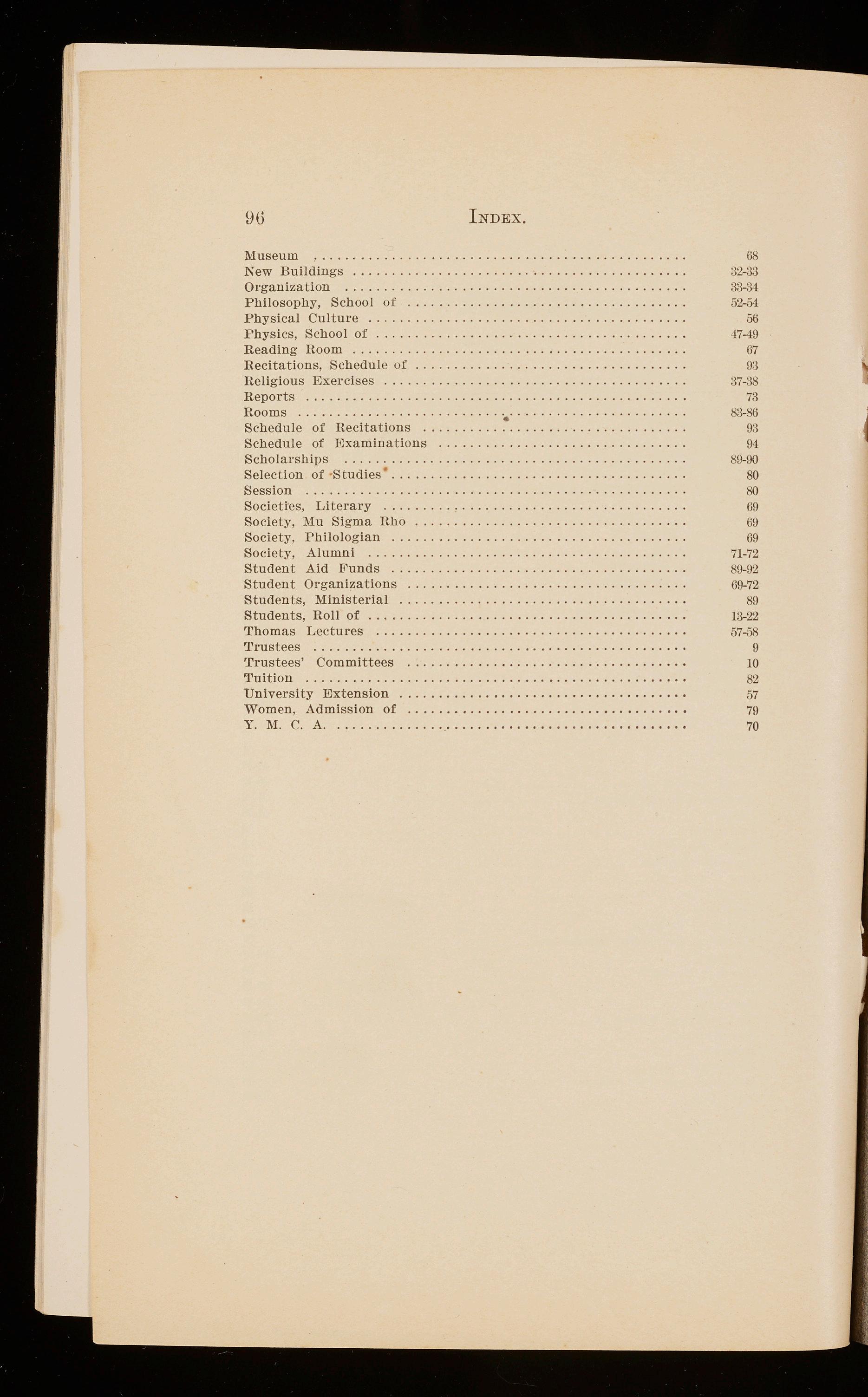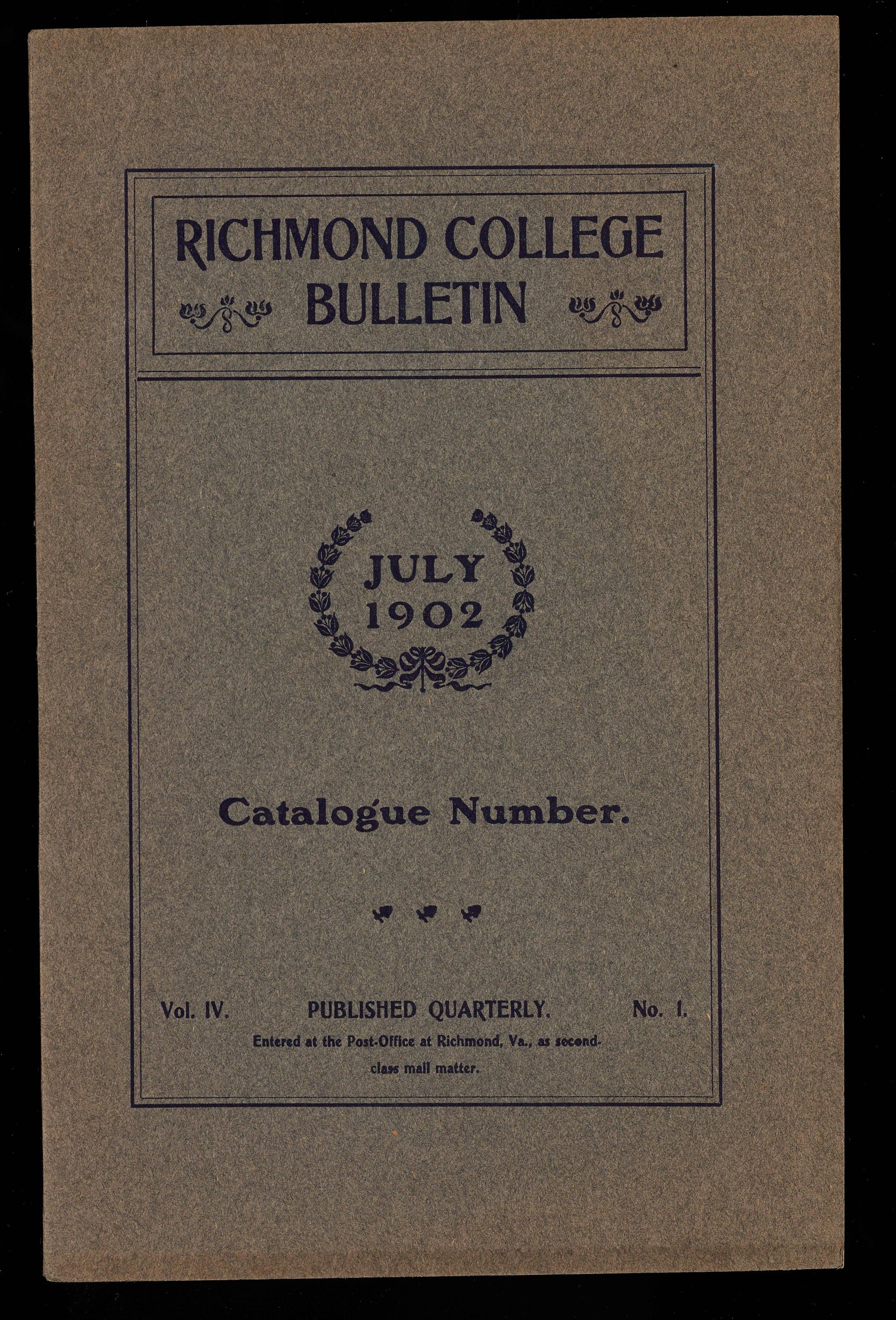


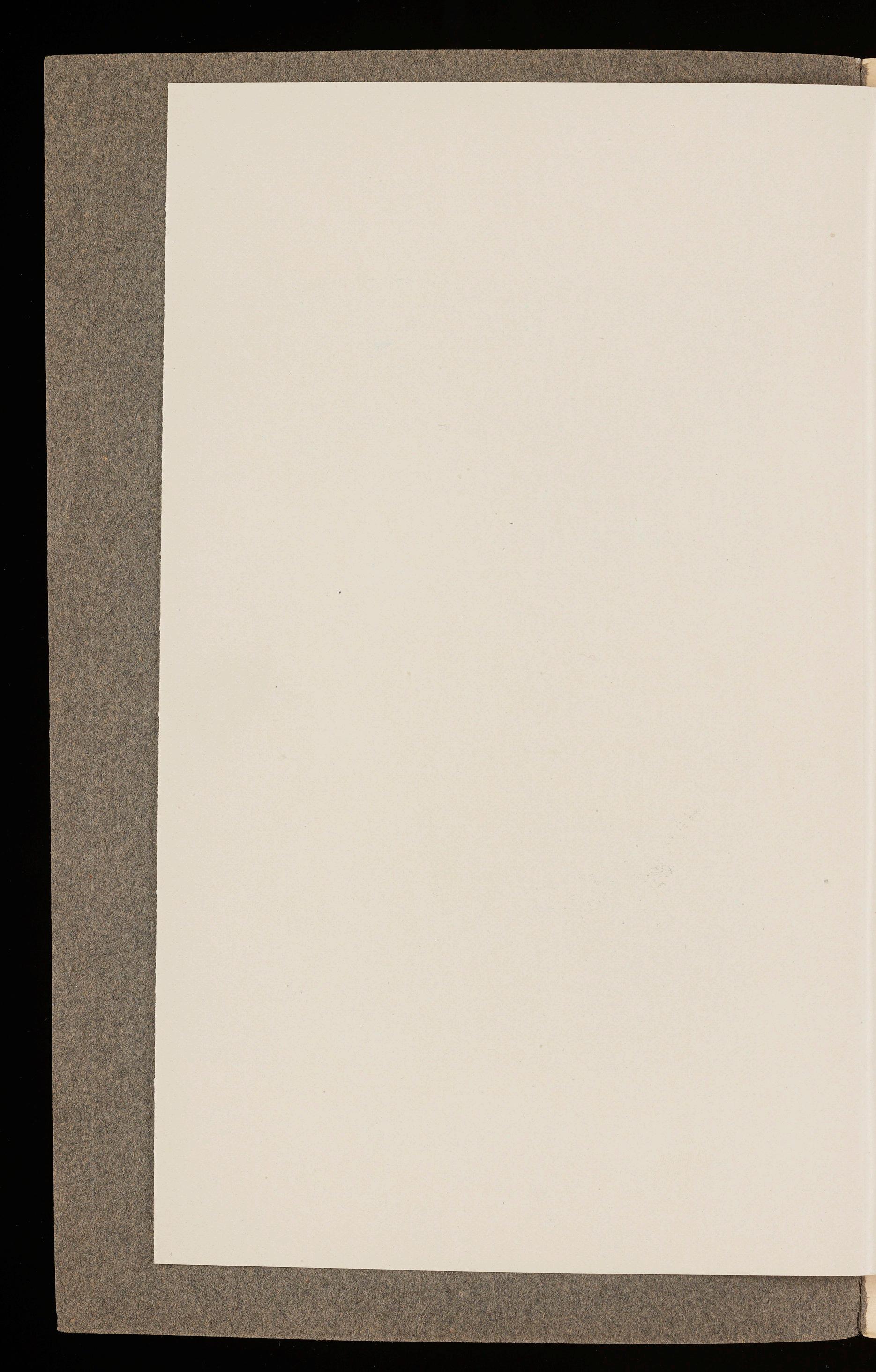
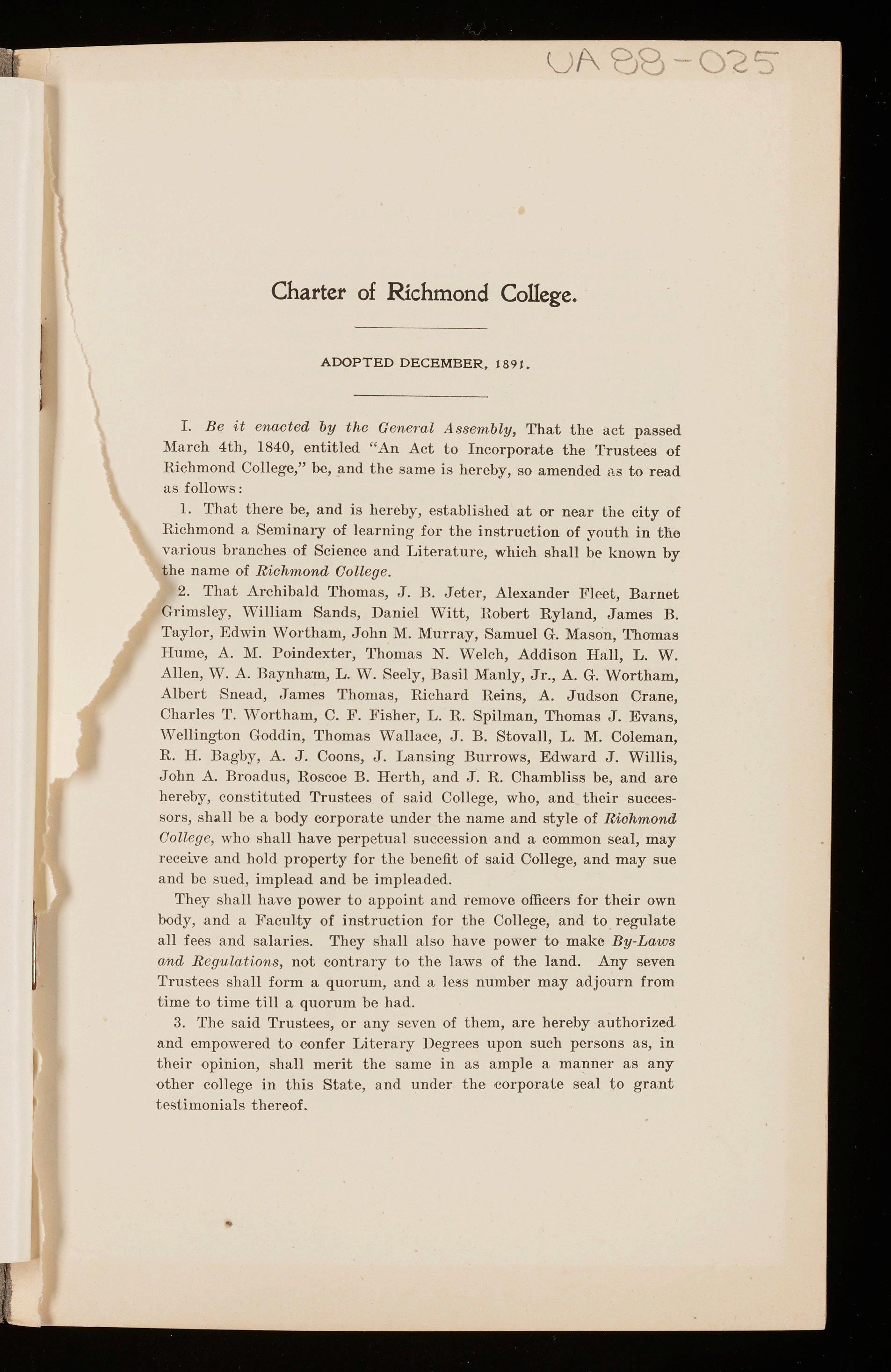






ADO P TED DECEMBER, 1891.
I. Be it enacted by the General Assembly, That the act passed March 4th, 1840, entitled "An Act to Incorporate the Trustees of Richmond College," be, and the same is hereby, so amended lls to read as follows:
1. That there be, and is hereby, established at or near the city of Richmond a Seminary of learning for the instruction of youth in the various branches of Science and Literature, which shall be known by the name of Richmond College.
2. That Archibald Thomas, J. B. Jeter, Alexander Fleet, Barnet Grimsley, William Sands, Daniel Witt, Robert Ryland, James B. Taylor, Edwin Wortham, John M Murray, Samuel G. Mason, Thomas Hume, A. M. Poindexter, Thomas N. Welch, Addison Hall, L. W. Allen, W. A. Baynham, L. W. Seely, Basil Manly, Jr., A.G. Wortham, Albert Snead, James Thomas, Richard Reins, A. Judson Crane, Charles T. Wortham, C. F. Fisher, L. R. Spilman, Thomas J. Evans, Wellington Goddin, Thomas Wallace, J. B. Stovall, L. M. Coleman, R. H. Bagby, A. J. Coons, J. Lansing Burrows, Edward J. Willis, John A. Broadus, Roscoe B. Herth, and J. R. Chambliss be, and are hereby, constituted Trustees of said College, who, and their successors, shall be a body corporate under the name and style of Riohmond College, who shall have perpetual succession and a common seal, may receive and hold property for the benefit of said College, and may sue and be sued, implead and be impleaded.
They shall have power to appoint and remove officers for their own body, and a Faculty of instruction for the College, and to regulate all fees and salaries. They shall also have power to make By-Laws and Regulations, not contrary to the laws of the land. Any seven Trustees shall form a quorum, and a le~s number may adjourn from time to time till a quorum be had.
3. The said Trustees, or any seven of them, are hereby authorized and empowered to confer Literary Degrees upon such persons as, in their opinion, shall merit the same in as ample a manner as any other college in this State, and under the corporate seal to grant testimonials thereof

4. The said Trustees shall elect a Treasurer, who shall give bond, with approved security, payable to said College, conditioned faithfully to discharge the duties of his offic~, and on failure so to do he may be proceeded against, by motion upon ten days' notice, before the Circuit or Hustings Court of the city of Richmond.
5. The said Trustees shall have power at any annual or other stated meeting, ten of them being present and concurring, to remove any Trustee, and at any time to supply any vacancy_
The number of Trustees sllall never be less than twenty-four nor more than forty_
There shall be annual and other stated meetings of the Trustee s at such time and place as their By-Laws shall prescribe. There may be special meetings at the call of their presiding officer, or any three Trustees, due notice of all such meetings being given.
6. The said Trustees are hereby authorized and required to admit to instruction in all the classes of the College, free of all charges except board, and in all respects upon terms of equality with other students, all ministers and preachers and candidates for the ministry belonging to the denomination of Christians called the Regular Baptists, who may be reco=ended by the Education Board belonging to the Baptist General Association of Virginia, in which Board all the rights, properties, privileges, powers, duties, and obligations of the Virginia Baptist Education Society are hereby declared to be vested. And said Trustees may also admit gratuitously such other students as they may think proper. And said Trustees may receive donations, bequests, 11,nddevises, or, in their discretion, purchase and hold property, real and personal, in any county · or corporation of this Commonwealth, and use and control the same for educational purposes, in the founding and maintaining of schools or academies, under such rules and regulations as may be prescribed by the said Trustees.
7. All rights, claims, privileges, and appurtenances now belonging or any wise pertaining to "the Trustees of Richmond College," as heretofore incorporated by act of the General Assembly, passed March 4, 1840, are hereby transferred to "Richmond College."
IL This act shall be in force from its passage.
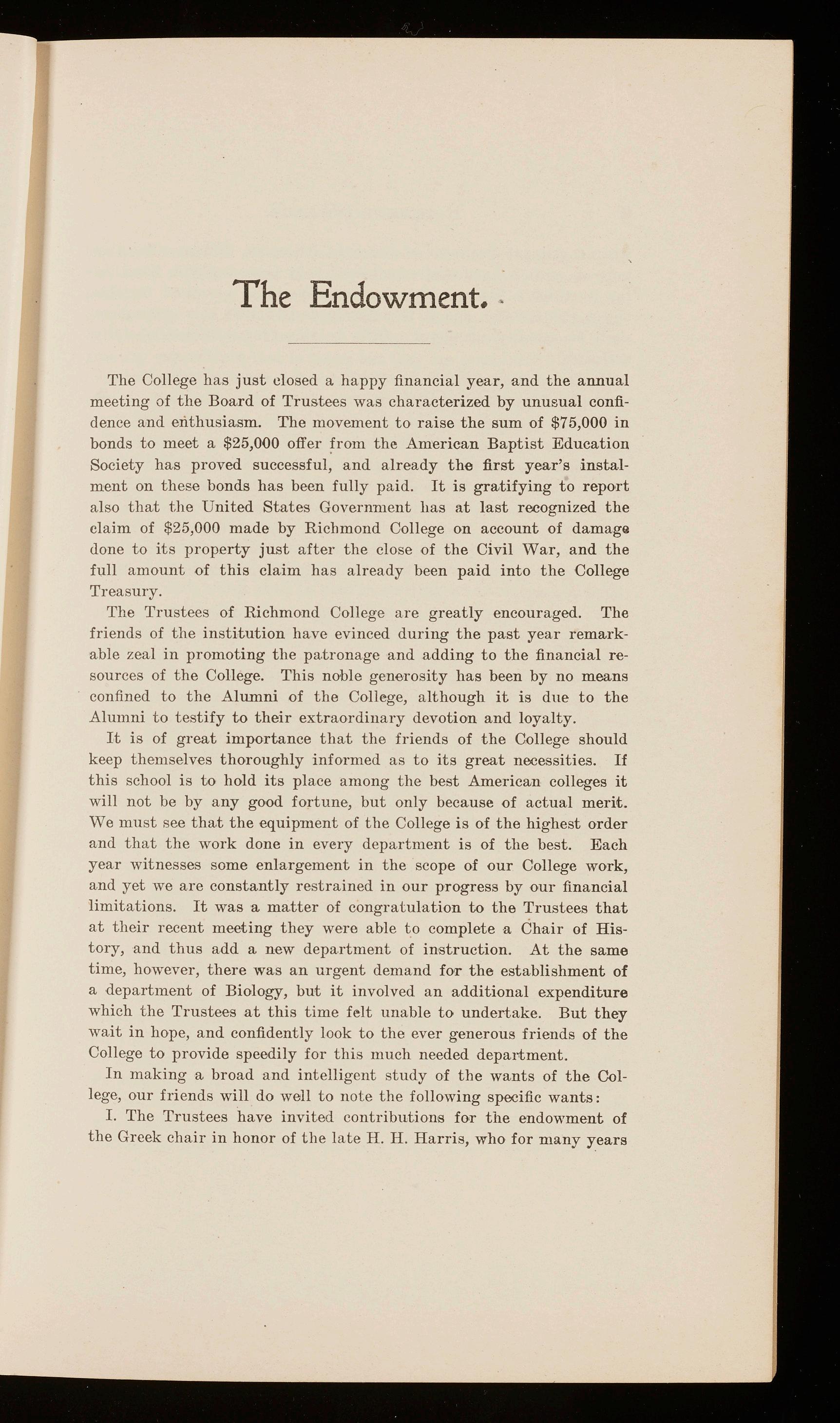
The College has just closed a happy financial year, and the annual meeting of the Board of Trustees was characterized by unusual confidence and enthusiasm. The movement to raise the sum of $75,000 in bonds to meet a $25,000 offer from the American Baptist Education Society has proved successful, and already the first year's instalment on these bonds has been fully paid. It is gratifying to report also that the United States Government has at last recognized the claim of $25,000 made by Richmond College on account of damage done to its property just after the close of the Civil War, and the full amount of this claim has already been paid into the College Treasury.
The Trustees of Richmond College are greatly encouraged. The friends of the institution have evinced during the past year remarkable zeal in promoting the pa.tronage and adding to the financial resources of the College. This noble generosity has been by no means confined to the Alumni of the College, although it is due to the Alumni to testify to their extraordinary devotion and loyalty. It is of great importance that the friends of the College should keep themselves thoroughly informed as to its great necessities. If this school is to hold its place among the best American colleges it will not be by any good fortune, but only because of actual merit. We must see that the equipment of the College is of the highest order and that the work clone in every department i s of the best. Each year witnesses some enlargement in the scope of our College work, and yet we are constantly restrained in our progress by our financial limitations. It was a matter of congratulation to the Trustees that at their recent meeting they were able to complete a Chair of History, and thus add a new department of instruction. At the same time, however, there was an urgent demand fOT the establishment of a department of Biology, but it involved an additional expenditure which the Trustees at this time felt unable to undertake. But they wait in hope, and confidently look to the ever generous friends of the College to provide speedily for this much needed clepa1tment.
In making a broad and intelligent study of the wants of the College, our friends will do well to note the following specific wants:
I. The Trustees have invited contributions for the endowment of the Greek chair in honor of the late H. H. Harris, who for many years

RJClJMOND COLLEGE.
was an eminent Professor of Greek in Richmond College. For this purpose quite a handsome sum has already been acquired, but thus far it is not sufficient. The amount proposed to be raised for this object was $30,000, and it is urgently desired that this endowment shall be speedily completed. Gifts to this fund will be gratefully accepted.
II. The sum of $35,000 is needed for the endowment and equipment of a department of Biology.
III. The Trustees are interested in academies. At their last meeting it was determined to establish an _Academy Fund. This money, as it comes in, will be invested, and the income will be devoted to the equipme;t of such academies a s stand upon a basis which promises that they will be permanently valuable as preparatory schools to Richmond College. There is a widely-felt need throughout Virginia for secondary schools to fit young men for our College. Money donated for this purpose will be exceedingly serviceable to our educational system.
IV. Richmond College is an endo wed institution, otherwise it would be impossible for it to undertake the high and expensive course of work which it is now doing. It must be understood by the friends of the College that fees for higher education fall far short of meeting the expense of instruction. The College has to rely largely upon the income from its endowment for the support of its teachers, and, as has already been indicated, the endowment of the College is far below its necessities. Not only is it true that the College needs teachers and equipment which it is unable to provide, but in point of fact the College pays its professors inadequate salaries. vVe are fortunate in having a most scholarly and efficient corps of teachers, but their efficiency would be increased if we could give them a support worthy of their gifts and services. There is urgent need of a large increase in our endowment. The President of the College, in his seventh report, made to the Trustees on the 12th of June, 1902, after outlining the needs of the College, says: "The College should have at once an endowment of $500,000, and it should be the steadfast aim of the Trustees to double this sum in the next ten years."
V. The College needs more aid funds. By this is meant such benevolent gifts as are designed to help worthy young men in their struggle for an education. Money given for this purpose often puts college education in reach of gifted youths who are struggling to educate themselves and have been defeated in their effort to gain an education. The College has already some aid funds in the way of scholarships and other donations. These have proved incalculably valuable, and not a few of the mOBt distinguished alumni of the Col-
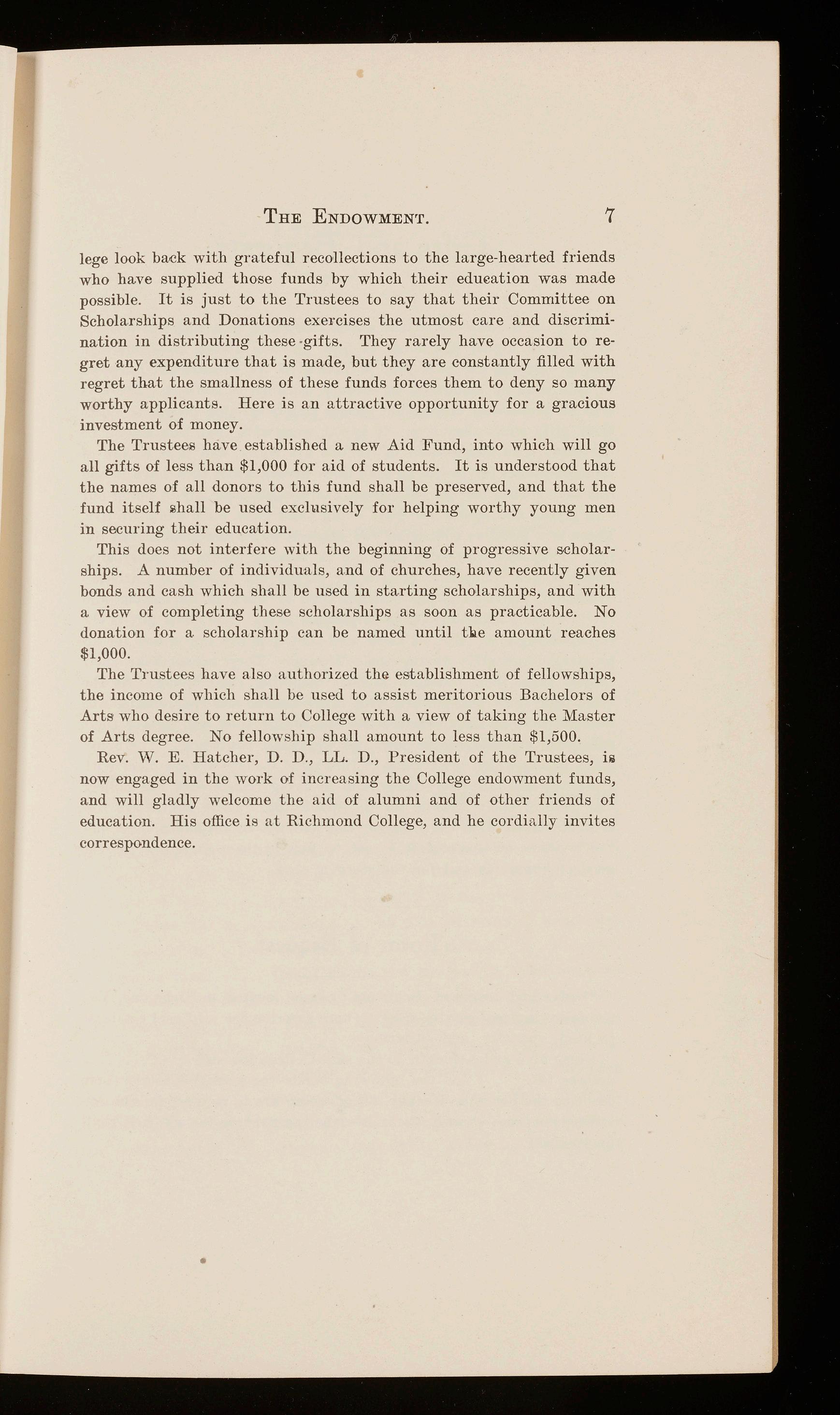
lege look ha.ck with grateful recollections to the large -hearted friends who have supplied those funds by which their education was made possible. It is just to the Trustees to say that their Committee on Scholarships and Donations exercises the utmost care and discrimination in distributing these -gifts. They rarely have occasion to regret any expenditure that is made, but they are constantly filled with regret that the smallness of these funds forces them to deny so many worthy applicants. Here is an attractive opportunity for a gracious investment of money.
The Trustees have established a new Aid Fund, into which will go all gifts of less than $1,000 for aid of students. It is understood that the names of all donors to this fund shall be preserved, and that the fund itself ~hall be used exclusively for helping worthy young men in securing their education.
This does not interfere with the beginning of progressive s.cholarships. A number of individuals, a.nd of churches, have recently given bonds and cash which shall be used in starting scholarships, and with a view of completing these scho l ars hip s as soon as practicable. No donation for a scholarship can be named until tlii.e amount reaches $1,000.
The Trustees have also authorized the establishment of fellowships, the income of which shall be used to assist meritorious Bachelors of Arts who desire to return to College with a view of taking the Master of Arts degree. No fellowship shall amount to less than $1,500.
Rev. W. E. Hatcher, D. D., LL. D., President of the Trustees, ii now engaged in the work of increasing the College endowment funds, and will gladly we lcom e the aid of alumni and of other friends of education. His office is at Richmond College, and he cordially invites correspondence.
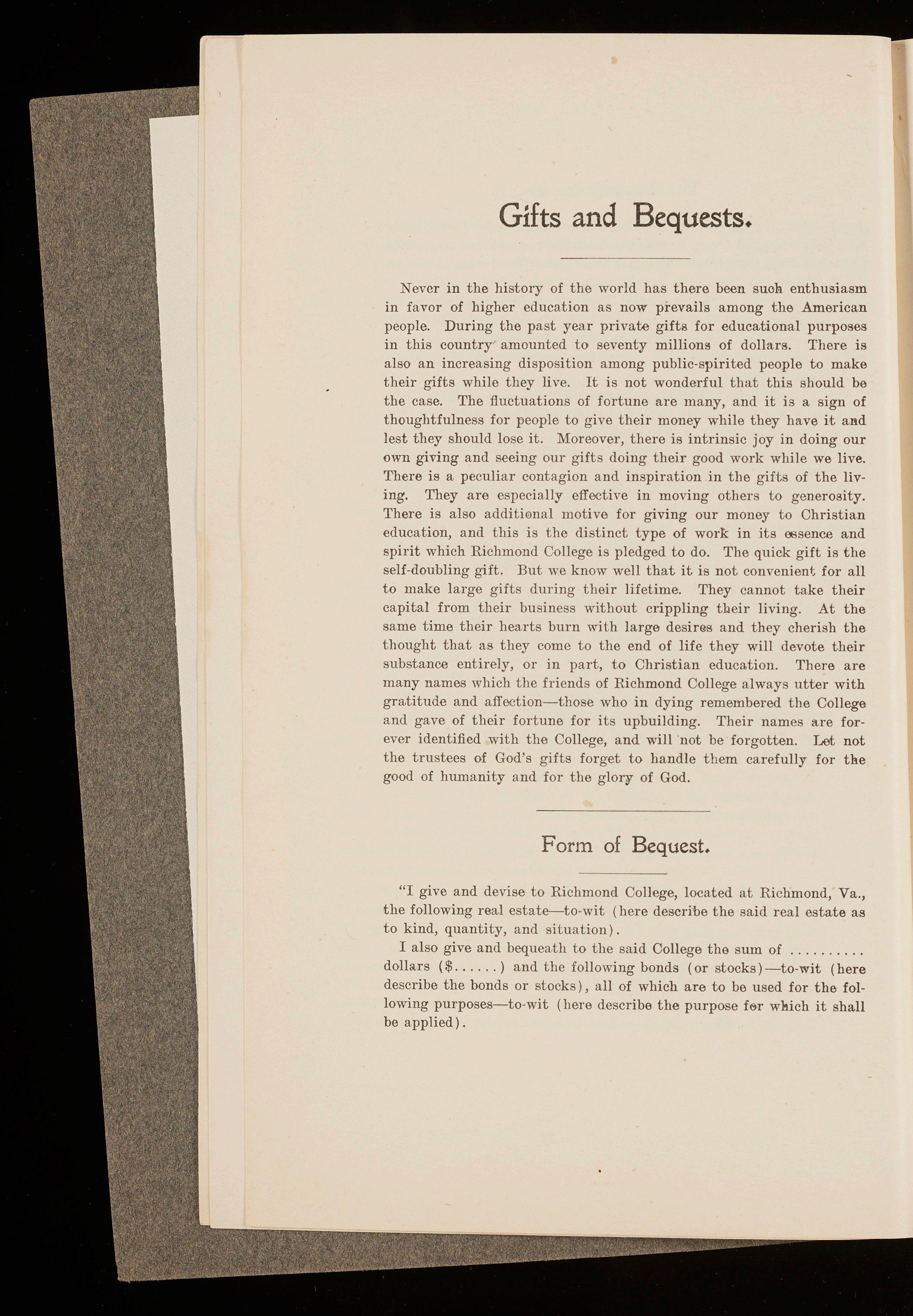
Never in the history of the world has there been suoh enthusiasm in favor of higher education as now prevails among the American people. During the past year private gifts for educational purposes in this country amounted to seventy millions of dollars. There is also an increasing disposition among public-spirited people to make their gifts while they live. It is not wonderful that this should be the case. The fluctuations of fortune are many, and it is a sign of thoughtfulness for people to give their money while they have it and lest they should lose it. Moreover, there is intrinsic joy in doing our own giving and seeing our gifts doing their good work while we live. There is a peculiar contagion and inspiration in the gifts of the living. They are especially effective in moving others to generosity. There is also additiemal motive for giving our money to Christian education, and this is the distinct type of work in its essence and spirit which Richmond College is pledged to do. The quick gift is the self-doubling gift. But we know well that it is not convenient for all to make large gifts during their lifetime. They cannot take their capital from their business without crippling their living. At the same time their hearts burn with large desirns and they cherish the thought that as they come to the end of life they will devote their substa .nce entirely, or in part, to Christian education. There are many names which the friends of Richmond College always utter with gratitude and affection-those who in dying remembered the College and gave of their fortune for its upbuilding. Their names are forever identified with the College, and will not be forgotten. Let not the trustees of God's gifts forget to handle them carefully for the good of humanity and for the glory of God.
"I give and devise to Richmond College, located at Richmond, Va., the following real estate--to-wit ( here describe the said real estate as to kind, quantity, and situation).
I also give and bequeath to the said College the sum of . dollars ( $ ...... ) and the following bonds ( or stocks )-to-wit ( here describe the bonds or stocks), all of which are to be used for the following purposes-to-wit ( here describe the purpose far which it sha ll be applied).
WILLIAM E. HATCHER, D. D., LL. D., President.
Hon. J. TAYLOR ELLYSON, Vice-President.
CHARLES H. RYLAND, D. D., Recording Secretary, Financial Secretary, and Treasurer.
J. M. PILCHER, D. D., Auditor.
MR. JOSIAH RYLAND....... Richmond
MA.TORA. R. COURTNEY.... Richmond
w. E. HATCIIlm, LL. D .... Richmond

MR. CONWAY R. SANDS.... Richmond
JOHN R. BAGBY, D. D Ballsville
JOHN M. PILCHER, D. D .. Petersburg
A. E. DICKINSON , D. D. . Richmond Jl[n, J. J. MONTAGUE Richmond
MR JOHN C. WILLI BIS Richmond llIR. T. C. WILLIAMS, Ju ., Richmond
J. R. GARLICK, D. D ..... Richm ond ;\IR. T. H. ELLE1'T Richmond
C. H. RYLAND, D. D ....... Ri chmo nd :\In. J OHN T. GRIFFIN ... Portsmouth
T. S. DUNAWAY, D. D., Fredericksburg :\Iu. A. J. MONTAGUE...... Richmond
II. WYTHEJ D.HIS, M. D Ri chmo nd :\In. J. T. ELLYSON . Richmond
I. B. LAKE, D. D ......... Upperville G,:oHGE W. BEALE, D. D Heathsville
J. L. M CURRY, LL. D Ri c hmond J u DGFl B. A. HANCOCK l\Ianchester
C. F. JA~IES, D. D ....... . Danville R. H. PITT, D. D Richmond
COL. 'I.'HOMAS TABB ........ Hampton ;\flt, II.W. STRALEY,Jn., Princeton,W.Va
GEORGE B. STBEJL, D. D. s., Ri c hmond ;\JR. R. s. BOSHElR Richmond
A. E. OWlllN, D. D Berkley i\llt. Ill<lNRY L. SCHMELZ ... Hampton
JUDGE W. R. BARKSDALE .. Houston Mn. GEO. B. WEST .. Newport News
MR. C. V. MERBDITH ...... Richmond W.R. L. SMITH, D. D Richmond
H. R. POLLARD, LL D ..... Richmond l\In. J. H u KT HARGRAVE.... Chatham
GEJORGECOOPER, D. D . Richmond i\IR, J. L. CHIP Franklin
PROF. GEORGfl SWANN Danville R~ •- T. H. ATRElY . Lynchburg

ENDOWMENT.-J. Taylor Ellyson, J. L. i\I. Curry, R. S. Bosher, T. C 'Williams, Jr., H. L. Schmelz, J. T. Griffin, Georg e B. \,Vest, T. II. Ellett, B. A. Hancock.
lNSTRUCTION.-W. R. L. Smith, J . R. Garlick, J. Ryland, J. M Pilcher, J. T. Ellyson.
FrnANCE.-John C. Williams, l-I. R. Pollard, Thomas C. Williams, Jr., John T. Griffin, R. S. Bosher.
GROUNDSANDBUILDINGS.-J. J. Montague, R. S. Bosher, H. \,V. Davis, R. 11. Pitt, A. R. Courtney.
LAW Sc1100L.-T. C. \Yilliams, Jr., C. V. Meredith, C. R. Sands, A. J. Montague, B. A. Hancock, and Professor Roger Gregory.
Am FUNDS (Scholarships and Donations) .-Josiah Ryland, George Swann, George Cooper, J. M. Pilcher, R. I-I. Pitt, I. B. Lake.
LIBRARY.-Gcorge Cooper, II. R. Pollard, George B. Steel, W. R. L. Smith, Professors Mitchell and Chandler.
ACADEMIES.-J. L. C'amp, George B. West, J. R. Bagby, George W. Beale, C. F. James.
No11nNATlONS.-T. ll. Ellett, W. R. Barksdale, T. S. Dunaway, J. H. Hargrave, A. E. Owen, B. A. llancock.
The By-Laws provide that the President of the Trustees and the Financial Secretary shall be members of all the above committees, except Nominations, and have equal privileges with other members; further, that the President of the College shall be ex-officio a member of all except Nominations.
NEWPORTNEWS ACADEMY.-Geo. B. West, Henry L. Schmelz, F. \,V. Boatwright, Maryus Jone , W. E. Barrett, T. J. Simms, G. F. Adams.
RICHMONDAcAnE111Y. - R. I-I. Pitt, J. Taylor Ellyson, George Cooper, J. J. Montague, F. ,v. Boatwright.
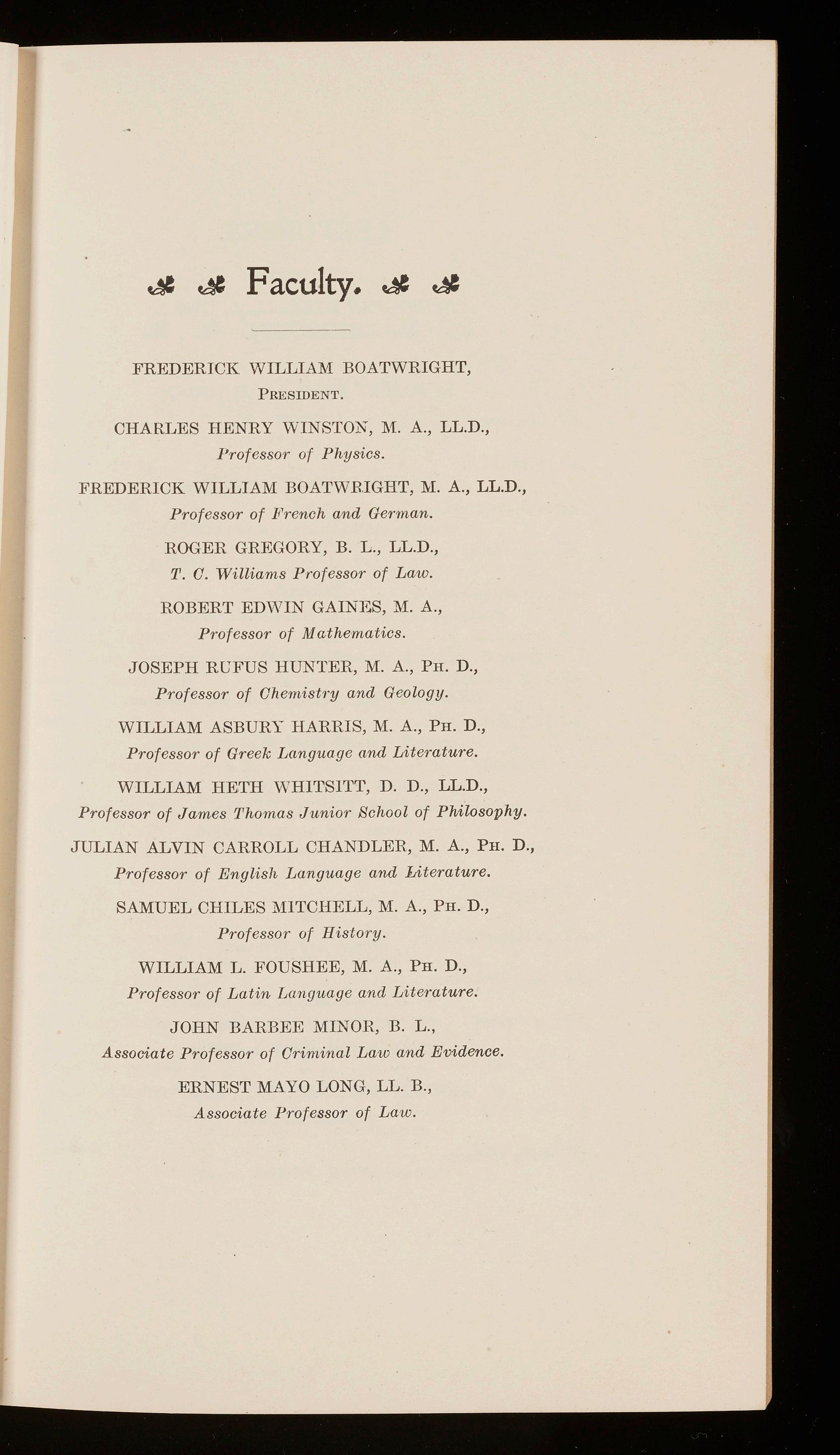
FREDERICK WILLIAM BOATWRIGHT, PRESIDENT.
CHARLES HENRY WINSTON, M. A., LL.D., l'rofessor of Physics.
FREDERICK WILLIAM BOATWRIGHT, M. A., LL.D., Professor of French a,nd German.
ROGER GREGORY, B. L., LL.D., T. C. Williams Professor of Law.
ROBERT ED\VIN GAINES, M. A., Professor of Mathematics.
JOSEPH RCFUS HUNTER, M. A., PH. D., Professor of Chemistry and Geology.
WILLIAM ASBURY HARRIS, M. A., Pn. D., Professor of Greek Language and Literature.
WILLIAM HETH V\'HlTSlTT, D. D., LL.D., Professor of James Thomas Junior School of Philosophy.
JULIAN ALVIN CARROLL CHANDLER, M. A , PH. D ., Professor of English Language and Literature.
SAMUEL CHILES l\flTCHELL, M. A., Pn. D., Professor of History
WILLIAM L. FOUSHEE, M. A., PH. D., Professor of Latin Danguage and Literature.
JOHN BARBEE MINOR, B. L., Associate Professor of Criminal Law and Evidence.
ERNEST MAYO LONG, LL. B., Associate Professor of Law.
HENRY VAN DYKE, LL. D. (/901-2.J Art and Poetry.
Sir ROBERT BALL, LL. D. (/901-2.) Astronomv.
LORADO TAFT. (/902-3.) Art.
*---------- (1902-3.) Philosophy.
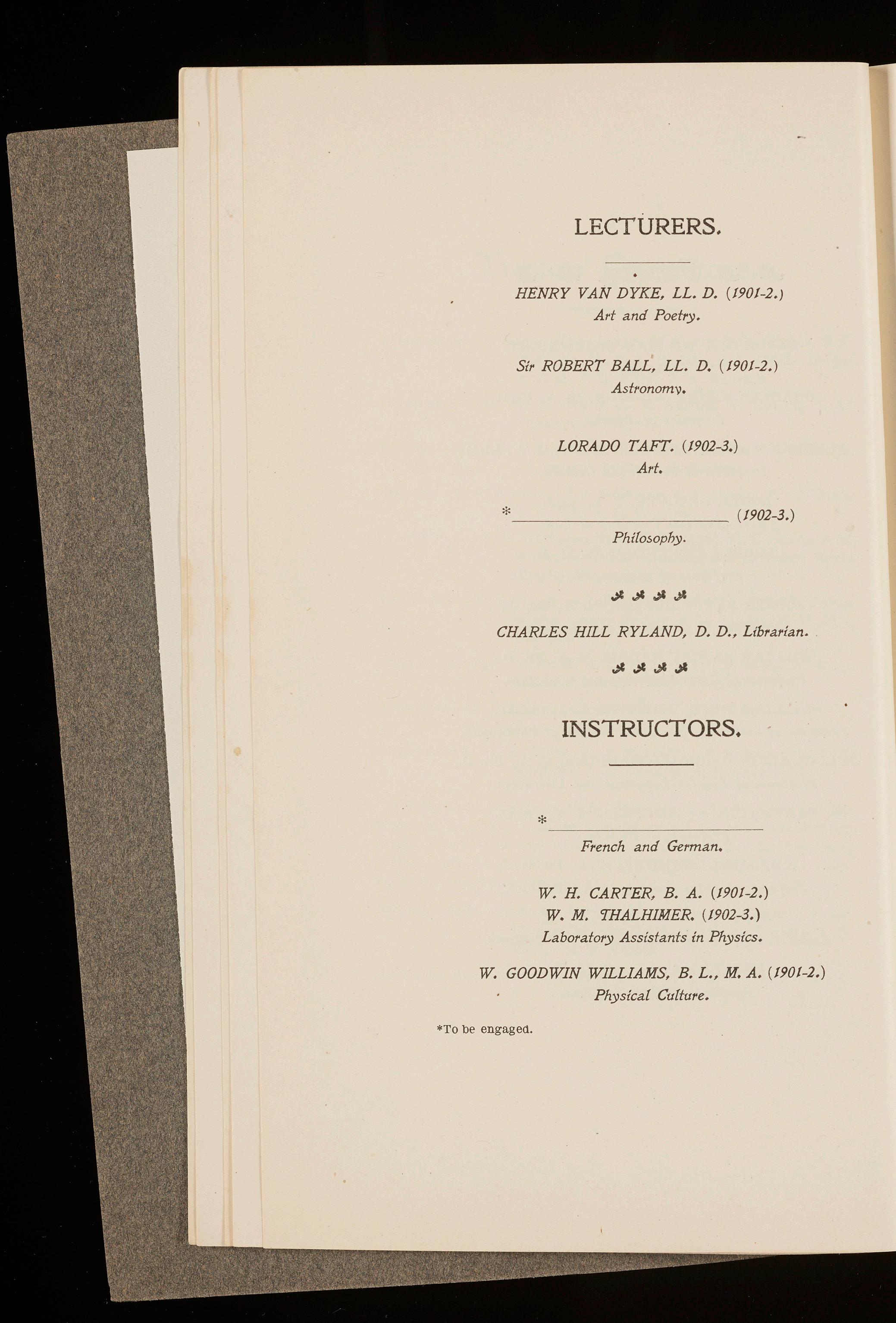
CHARLES HILL RYLAND, D. D., Librarian. INSTRUCTORS.
French and German.
W. H. CARTER, B. A. (1901-2.) W. M. 'THALHIMER. (1902-3.) Laboratory Assistants in Physics.
W. GOODWIN WILLIAMS, B. L., M.A. (1901-2.) Physical Culture.
•To b e engagect.
Allen, E dg ar L
King and Queen Co ., Va. Law .
A lley, B. Per cy Norfolk, Va.
Latin, Greek, Mathematics, Bible.
Anke r s, R. E ... Loudoun Co , Va.
L a tin, French, German, Mathematics
Bailey, W. Norris . Richmond, Va. Law.
Belote, T. T
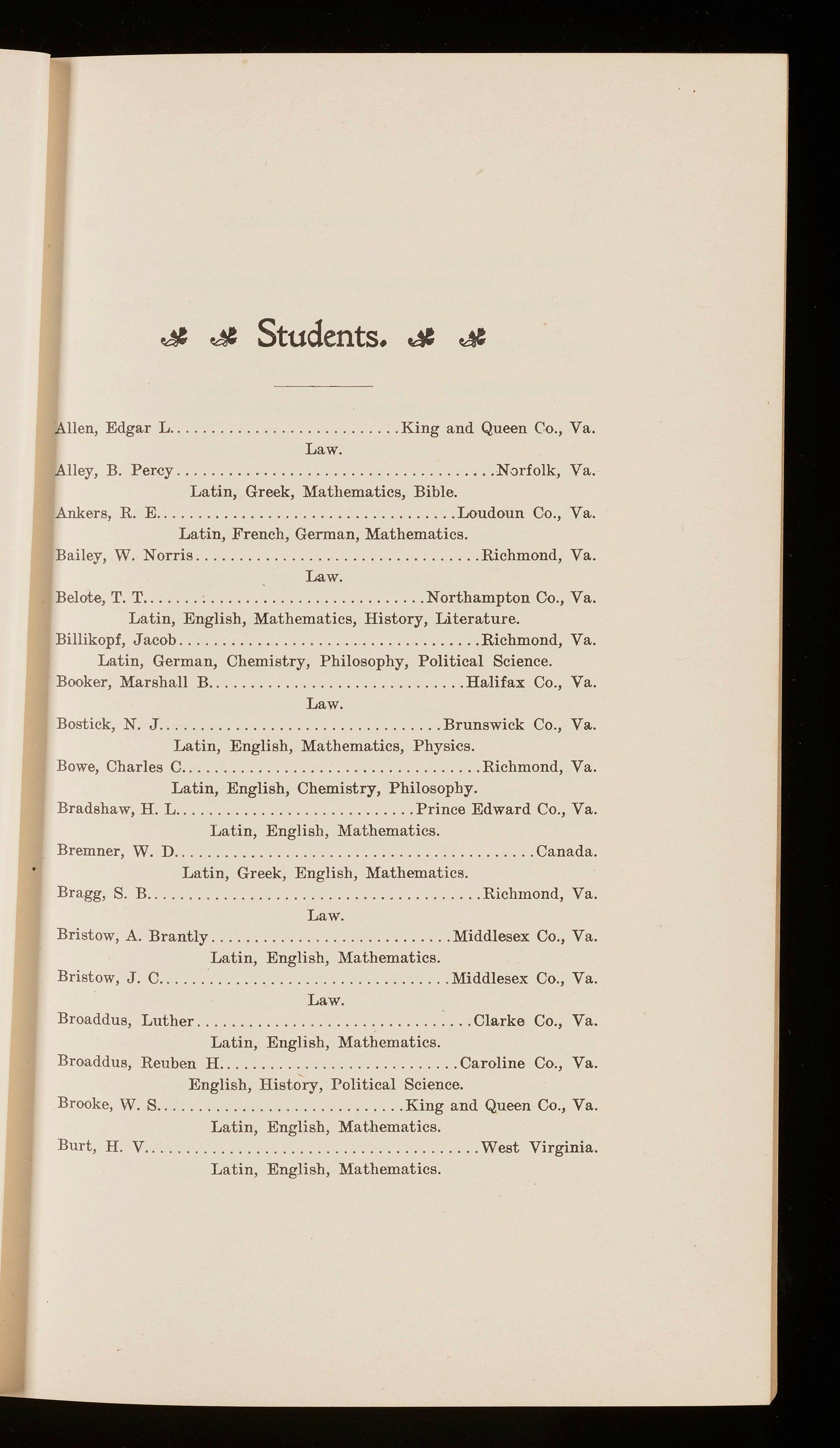
Northampton Co., Va
L a tin, English, Mathematics, History, Literature. Bi ll ik opf , Jacob .. Richmond, Va. L atin , German, Chemistry, Philosophy, Political Science.
Book er , Marshall B Halifax Co., Va Law.
Bosti ck, N J . ........ Brunswick Co , Va, Latin, English, Mathematics, Physics.
Bowe, Charles C . ... Richmond, Va. Latin, English, Chemistry, Philosophy.
B r a d sh a w, H L .. .. Prince Edward Co., Va. Latin, English, Mathematics.
Br emner , W D Canada. Latin, Greek, English, Mathematics
Brag g , S. B Richmond, Va Law .
B ri st ow, A Brantly ... Middlesex Co., Va. Latin, English, Mathematics.
B r is tow , J. C
Middlesex Co., Va . Law.
B roa ddu s, Luther .. Clarke Co., Va. Latin, English, Mathematics.
B r oa ddus, Reuben H .. Caroline Co., Va. English, Hist ory, Political Science.
B rook e, W. S .. King and Queen Co., Va Latin, English , Mathematics.
Burt, H. V .
... West Virginia . Latin, English, Mathematics.

Buxton, E. P .......... Newport News, V a. Latin, English, Philosophy, Political Science. Cabell, R. E . Richmond, V a. Law.
Calzado, Alfonso Mexico French, English.
Campbell, Clarence King William Co., V a. Latin, English, Mathematics, Physics. Cannon, Arthur M Richmond, Va Law.
Carleton, B. L Essex Co., Va. Latin, English, Mathematics
Carroll, E. L ...................................... Richmond, Va . Chemistry, Philosophy, Political Science, Astronomy.
Carter, W. H Roanoke Co., V a. Greek, English, Philosophy, Literature.
Carver, D. J .......................................... Tennessee . Greek, English, Mathematics, PhysicsChristian, Guy D Richmond, V:t Latin, English, Mathematics.
Clark, W. P ................................. Chesterfield Co., Va . Latin, Greek, English, History.
Collier, C. L Elizabeth City Co., Va Law.
Collier, F. A .............................. Elizabeth City Co., V a. French, German, English, Mathematics, Physics. Compton, U. B Rappahannock Co., V:t Latin, Greek, English, Philosophy.
Cox, L. B Princess Anne Co., Va. Law.
Cox, R. B ...................................... Amherst Co., V:t. Latin, Mathematics, Physics, History.
Cox, W. D Amherst Co., Va. German, English, Physics, Philosophy, Political Science, Astronomy
Daniel, J.E ......................... .... ..... ..... Richmond, Va . Law.
Daughtery, M. Colgate Richmond, Va. Greek.
Davidson, A. D .. Chesterfield Co., Va Latin, English, Mathematics.
Davis, B. H Bedford Co., Va. Law
STUDENTS. 15
Deans, H. L . ....... ................ Nansemond Co., Va.
Latin, English, Mat h emat ic s, History.
Deans, Pa rk e P ... ... ......... Isl e of vVight Co., Va. Mathematics, Chemi stry, Philosophy.
DeHa rt, John T .. ... ... . ........... Tennessee. Law.
Derie ux, S. A ... . ...... . .... .. . Richmcnd, Va. La.tin, English, Chemi stry , Philo sop hy, History.
Dickinson, C. W., Jr ...... . ... , Cumberland Co., Va.
Latin, E ngli sh , Ma.th em atics.
Dickinson, S. W . ..... ..... C umb erland Co., Va.
Latin, Ma.th emat ics, Physics, Chemi st ry .
Dickinson, J. T. L .......................... Rockbridge Co., Va.
Latin, E ng li sh, Mathematics, Physics.
Dill, J B. ....................... ... Ric hmond , Va.
Latin, English, Mathematics.
Duna way, C. H . .. .................. .. . ...... Lancaste r Co., V a.
French, Ch emistry, History, Literature.
Dunaw ay, W. F., Jr . .. ... .............. . .. Heiuico Co., Va. Philosophy, Literature.
Dunn, H. C. .
East, Robert B . ...
Ellett, J. A .

Latin, Eng li sh, Mathematics.
.. Richmond, Va.
.. Halifax Co., Va.
Latin, G re ek, Mathematics, Ch emistry
Latin, English, Mathematics.
Falls, 0. B. ... ........
Latin, Greek, English, Mathematics.
. Hanover Co., Va.
Bedford Uo., Va.
Field, E D ....... ... ... . Alb emar l e Co., Va.
Latin, English, Ma.thematics.
Fitzge rald, J. T .... . . ... Pittsylvania Co., Va
Latin, E n gl i sh , Mathematics.
Flourn oy, Isaac P . .
...... Ric hmond , Va.
Latin , E ngl i sh, Mathematics, History.
Fogg, G. W ................. .. ... King a nd Queen Co., Va .
Latin, Greek, Che mi stry, P hilo sop h y.
Frank lin , J. II ....... .......... . Roa nok e, Va. English, Philosophy, History.
Frank lin, J. M . ................ .. .. .. . Roanoke, Va.
Latin, English, Philosophy, Bible.
Frayse r, W. Ashby ............ . . . Henrico Co., Va. Law.
Frazer , Goodwin ...... . . . .. ...... Orange Co., Va.
G re ek, French, Physics, Political Science.
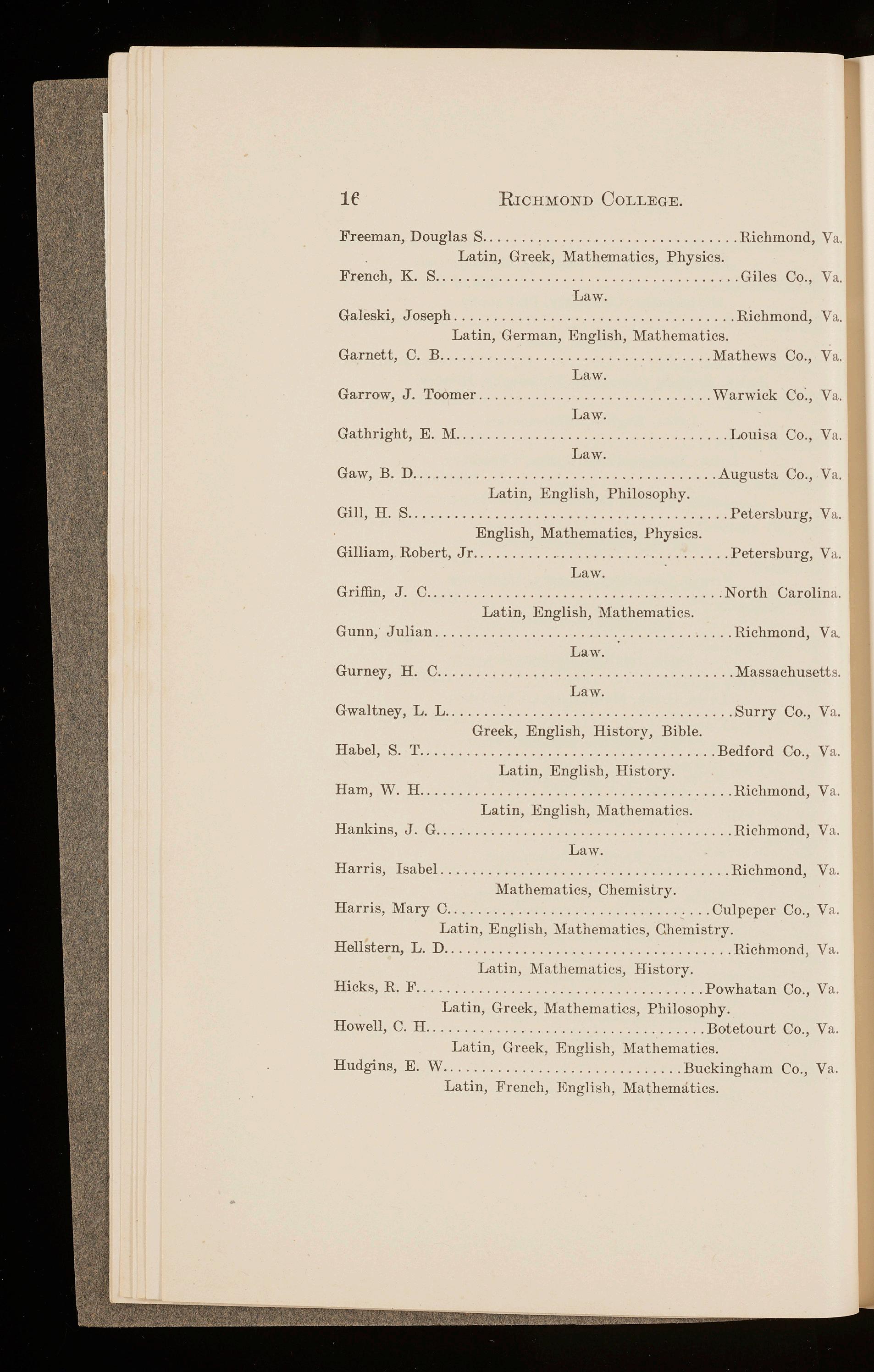
H Rrm-rMOND COLLEGE.
Freeman, Douglas S ................................ Richmond, Va. Latin, Greek, Mathematics, Physics.
French, K. S ........................ . ............. Giles Co., Va. Law.
Galeski, Joseph ........... Richmond, Va. Latin, German, English, Mathematics.
Garnett, C. B ........ Mathews Co., Va. Law.
Garrow, J. Toomer ............................. i Varwick co·., Va Law.
Gathright, E. M ........ ... . ........ ... . . . ... Louisa Co., Va. Law.
Gaw, B. D ... .. August,t Co., Va. Latin, Eng li sh, Philosophy.
Gill, H. S ................... Petersburg, V a. English, Mathematics, Physics.
Gilliam, Robert, Jr Petersburg, V a. Law.
Gr iffin, J. C.... ...... North Caro li n a. Latin, Eng li sh, Mathematics.
Gunn, Julian ·.· ... Richmond, Va.. Law.
Gurney, H. C ................................... . . Massachusett s. Law.
Gwaltney, L. L . .. . ........... Surry Co., V a. Greek, English, History, Bible.
Habel, S. T Bedford Co., V a. Latin, English, Hi sto ry.
Ham, W. H Richmond, V a. Latin, Eng li sh, Mathemat i cs.
Hankins, J. G ...... Richmond, Va. Law.
Harris, Isabel. .. . ................................ Richmond, V a. Mathematic s, Chemist ry .
Harris, Mary C................. ..... Cu lp eper Co., V a. Latin, English, Mathemat ics, Chemistry.
Hellstern, L. D .................................... Richmond , Va. Latin, Mathematic s, History.
Hicks, R. F Powhatan Co., V a. Latin, Greek, Mathematics, Philosophy.
Howell, C.H ..... Botetourt Co., Va
Latin, Greek, English, Mathematics.
Hudgins, E. W Buckingham Co., Va. Latin, French, Eng li sh , Mathematics.
STUDENTS. 17
H udg in s, R. Le ster ............ . ....... ... . .. Buckingham Co., Va . Latin, Engli sh, Mathematics, Physics.
H udg in s, Robert S ...... Elizabeth City Co., Va Ge rman, Engli sh, Physics, Political Science, Astronomy.
H ud mon , G. N. , Jr . ... Alabama Philo s ophy, Literature , Political Science
H udso n , Clem H . Warwick Co. , Va. Law.
H ughes , J Mortimer ....... ..... Rappahannock Co., Va . Latin, German, En g li sh, Chemistry.
H ugh es, Thomas E .. . Rappahannock Co , V a La,tin, German , Engli sh, Chemistry.
L \.n son, Tillar : South Carolina L a tin, Greek, English, History, Astronomy.
Is bell , C. W . Richmond, Va. Mathematics.
Is h , Georg e B Loudoun Co , Va. Latin, English, Philosophy, Political Science . .Ja mes, P. vV Culpeper Co., V a. Latin, Mathematics, Chemistry, Philosophy, History .
Je nke n s,- C . A., Jr . North Carolina Mathematics, Chemistry, Philosophy, Literature
Je nning s, J . W .
. Norfolk Co ., Va. Greek, English, Mathematics, Astronomy. ,Jen ning s, Lewis L . Culpeper Co., Va. Latin, Physics, Chemistry, History.
J ohn son , J , Jeter Southampton Co , Va. Greek, English, History, Bible.
J ohn son , Lucile F ..
. Richmond, Va. French, English, Mathematics, Physics, History.
J ones, A W. H ...... Spotsylvania Co., Va. Latin, Greek, English, Philosophy.
J ones, H. M. B ....
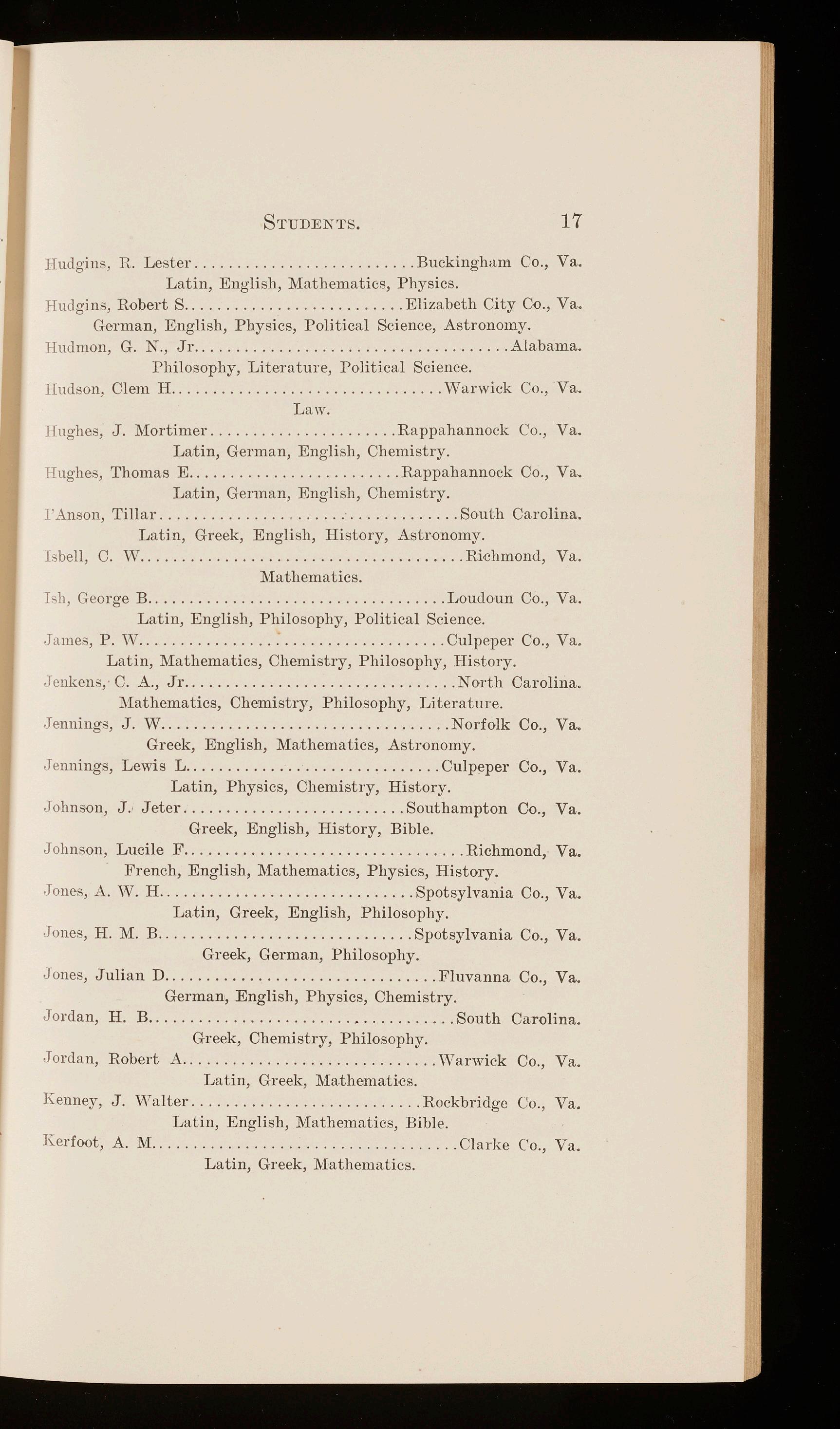
... Spotsylvania Co., Va . Greek, German, Philosophy.
J ones, Julian D ... .... Fluvanna Co., Va. German, English, Physics, Chemistry
J or dan, H B ..•. . South Carolina. Greek, Chemistry, Philosophy.
J or dan, Robert A .. Warwick Co., Va Latin, Greek, Ma.thematics.
Ke nney, J. vYalter ................. Rockbridge Co., Va. Latin, English, Mathematics, Bible.
Ke rfoot , A. M .. Clarke Co., Va. Latin, Greek, Mathematics.

18 RICHMOND COLLEGE.
Kerfoot, F. W ........... . ........................ Clarke Co., Va. Latin, Greek, Philosophy, Literature, History.
Kincheloe, J. W Fairfax Co., Va. Latin, English, Ma.thematics, Physics.
King, V. L ...................................... Hanover Co., Va. Latin, Greek, JI.Iaihematics, Chemistry.
Kirby, George R. .................................. Richmond, Va. Chemistry.
Lacy, Lane . ........ . .......... .................. Richmond, Va Lall'.
Lankford, Menalcus .' Norfolk, Va. Latin, German, Mathematics, History.
Leigh, J. H. P ......... North Caroli na. Law.
Leonard, I. S ................... \Vashington Co., Va Latin, English, History, Bible.
Lewis, J. Marshall King \Yilliam Co., Va. Latin, English, Physics.
Lloyd, Mark R. ................................. Manchester, Va La11·.
Lodge, J. E ........................................... Maryland. Latin, English, Mathematics.
Lowe, W. E ........................ Prince Williall). Co., Va Chemistry, Liieraiure.
Marshall, Otis ................ Orange Co., Va Latin, English, Chemistry.
Martinez, F. R., Jr. ............................... Mexi co English.
Matthews, S. T., Jr. Norfolk, \ 'a Latin, Greek, English, Philosophy.
Maxey, R. i\I. . ............ Richmond, Y.1. History, Political Science.
McCabe, J. P., Jr. Bedford Co., Va French, Philosophy, Li iera ture, Astronomy.
McCaul, Thomas V ......................... ...... Richmond, Va English, Mathematics, Phi l osophy, L i terature.
McConnell, Strubbe Georgi a Latin, English, Mathematics, Philosophy, Literature.
McElroy, C. W ..................................... Bath Co., Va Latin, Greek, English.
McFarland, R. A North Carolin a. Mathematics, Physics, Philoso phy.

McNiel, H. L ................................... Franklin Co., Va. Latin, English, Mathematics. Moffett, Ingersoll ................................ .. Alabama. Law.
Moncure, John .................. ... .. ..... Richmond, Va. Latin.
Moore, C. R., Jr ............................ :Nort hampton Co., Va. Law.
Moore, T. V ...... . .... . ..... Richmond, Va. Law.
:\!organ, R. I. ... ...................... Richmond, Va. Greek, Mathematics, Chemistry.
:Morison, A. Kyle. · . .. ......... .................... Scott Co., Va. Latin, English, Chemistry, Political Science.
i\Iorriss, C W .............. Richmond, Va. Law.
Nelson, W. E . ... ... ................. Culpeper Co., Va. Law.
Newell, Paul F .. ... . . ..... Richmond, Va. Law.
Nicol, A B ...... ........ Prince William Co., Va. Latin, Greek, Mathematics.
Oliver, J. Edward ............................. Botetourt Co., Va. Latin, Greek, English, Physics.
Oliver, R. R .... ... Hanover Co., Va. Mathematics, Philosophy, History.
Owen, C W ...................................... Tennessee. Latin, Greek, :Mathematics, Physics.
Owens, R. S . ................. ....... King George Co., Va. Latin, Greek, English, Bible.
Pearson, H. L ...... ................... · Richmond, Va. Law.
Pendleto n, E. B ............................. Louisa Co., Va. Latin, English, Mathematics. Phillips, William L .................................. New Jersey. Law, Bible.
Pollard, F. G ................... ... Richmond, Va. Latin, English, Mathematics, History.
Pollard, Robert N ........... Richmond, Va. Law.
Pond, E dward S ............................ Southampton Co., Va. Latin, Greek, Mathematics, History, Bible.
20
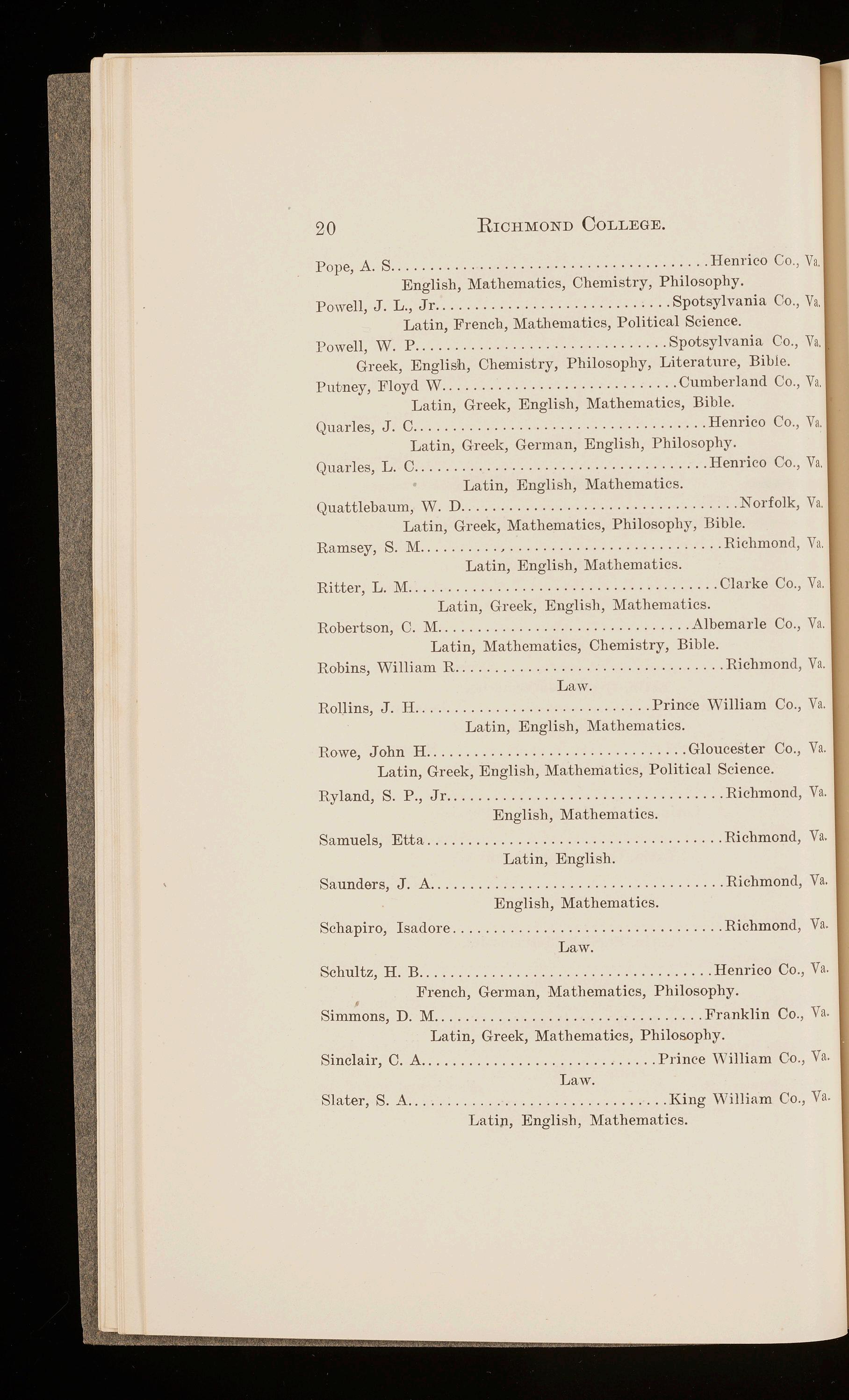
RICHMOND COLLEGE.
Pope, A. S ....................................... Hemico Co., Va. English, Mathematics, Chemistry, Philosophy.
Powell, J. L., Jr ............................. Spotsylvania Co., Va. Latin, French, Mathematics, Political Science.
1>owell , W. P ............................... Spotsylvania Co., Va. Greek, English, Chemistry, Philosophy, Literature, Bible.
Pubney, Floyd W ............................. Cumberland Co., Va. Latin, Greek, English, Mathematics, Bible.
Quarles, J. C Henrico Co., Va. Latin, Greek, German, English, Philosophy.
Quarles, L. C .................................... Henrico Co., Va.
Latin, English, Mathematics.
Quattlebaum, W. D .................................. Norfolk, Va. Latin, Greek, Mathematics, Philosophy, Bible.
Ramsey, S. M .......... , ...... Richmond, Va. Latin, English, Mathematics.
Ritter, L. M ...................................... Clarke Co., Va.
Latin, Greek, English, Mathematics.
Robertson, C. M ... ........................... Albemarle Co., Va. Latin, Mathematics, Chemistry, Bible.
Robins, William R. .......... .......... Richmond, Va. Law.
Rollins, J. H
Prince William Co., Va. Latin, English, Mathematics.
Rowe, John H ................................ Gloucester Co., Va. Latin, Greek, English, Mathematics, Political Science.
Ryland, S. P., Jr .. Richmond, Va. English, Mathematics.
Samuels, Etta Richmond, Va. Latin, English.
Saunders, J. A .................... ............... Richmond, Va English, Mathematics.
Schapiro, Isadore ............... ................. Richmond, Va. Law.
Schultz, H. B ........... .. . ........ . Henrico Co., Va. French, German, Mathematics, Philosophy
. Simmons, D. M ................................. Franklin Co., Va. Latin, Greek, Mathematics, Phi l osophy.
Sinclair, C. A ............................. Prince Vi ' illiam Co., Va. Law.
S l ater, S. A ...................
Lati;n, English, Mathematics.
King William Co., Va.

STUDENTS. 21
Smith, E. T ..................................... Petersburg, Va. Greek, Philosophy, History. Smith, Hiram M . .. ..... .. ... Richmond, Va. La,tin, English, Mathematics. Sowers, Ma rion 0 .. . ... . ...... . Page Co., Va. Latin, French, Phy sics. Spencer, H. G ..... ................. Kentucky. Law.
Spilman, M. W . ... . .. ... Rappahannock Co., Va. Latin, French, English, Ma thematics. Staples, Ray F Port smouth, Va.
Latin, Greek, Mathem at ics, Physics, Astronomy. Stephenson, H. W ... ...... Isle of Wight Co., Va. Eng li sh, Mathematics, Hi story.
Sublett, Hugh W ........................... Richmond, Va. Greek, German, English, Philosophy.
Sutherland, L. L ...... . ............... Richmond, Va. Latin, Gr eek , Mathematics, Philosophy.
Swartwout, J. B .............. . Henrico Co., Va. Philosophy, Politi ca l Scien ce, Law. Swift, Robert 0 . .............. . Richmond, Va. L at in, Engli sh, Mathematics.
Taber, C. W .............. . .... Richmond, Va. Latin, Engli sh, Mathematic s. Taylor, T. B ... ... Brazil. Latin, Greek, French, English, Mathematics.
Templeman, S. H . . ..... Rappahannock Co., Va. Latin , Greek, English, Philosophy.
Terrell, A. C.................................... Hanover Co., Va. Latin, Greek, English, Philosophy. Thalhimer, W. M .......... ............ .Richmond, Va. German, Mathematics, Physics, Chemistry.
Thomas, J. M., Jr ...... Gloucester Co., Va. English, Philosophy, History, Bible.
Thomas, J. P., Jr. . ...... .. .. . Richmond, Va. Latin, History, Political Science. Thra,·es, ,v. V ...... ......... Powhatan Co., V a. English, Philosophy, History.
Tindal, L. R., Jr. . ...... ......... South Carolina. Latin, French, En g lish, Astronomy. Turner, ,Yilliam M .......... . Ri chmond , Va. Chemiatry.
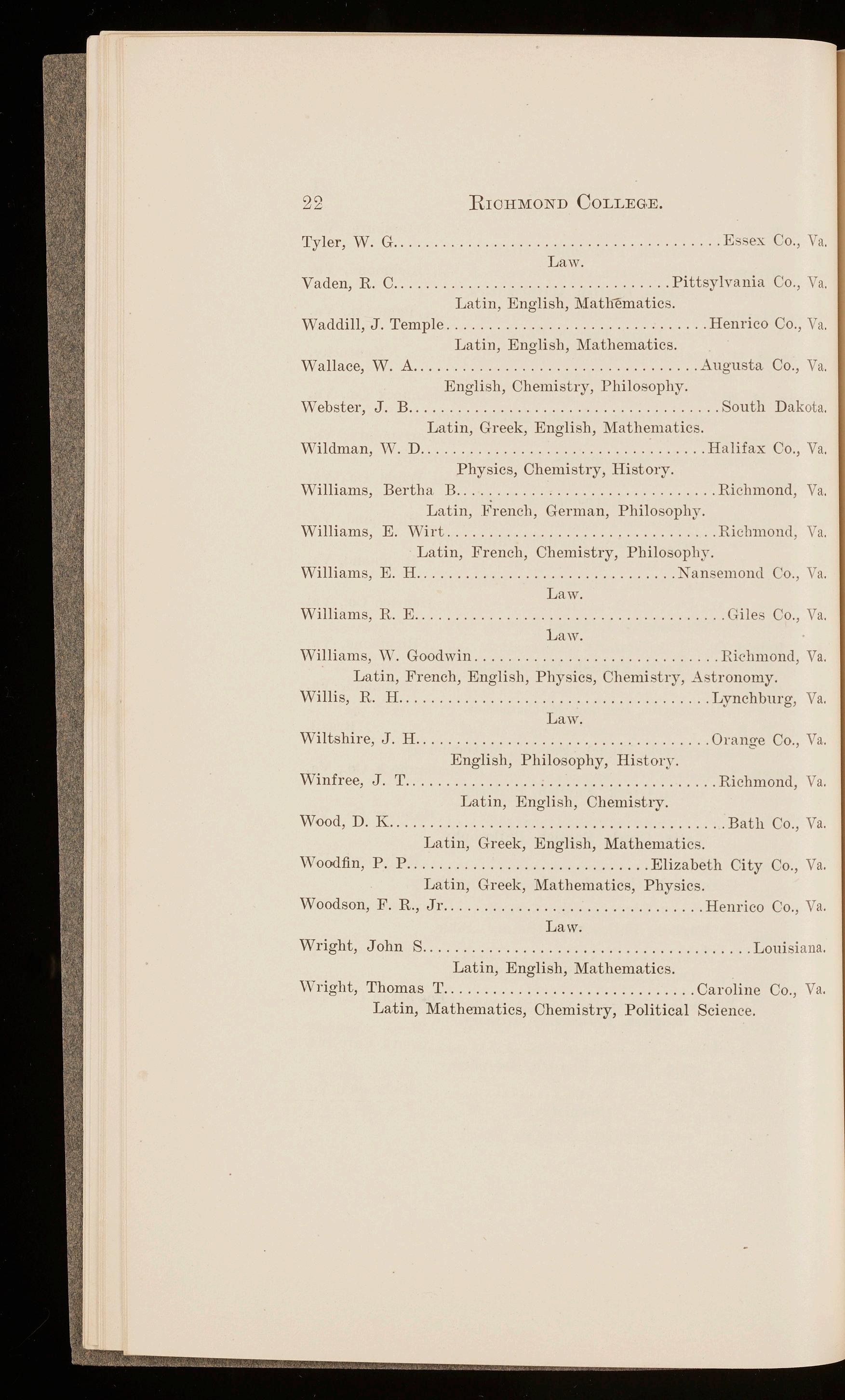
22 Rrou11rnND COLLEGE.
Ty ler, W. G ....... Essex Co., \'a, Law.
Vaden, R. C..... Pittsylyania Co., Ya. Latin, English, i\Jatnematics.
\Yaddill, J. Temple ......... , .. Henrico Co., Ya. Latin, English, i\Iathematics.
\Vallace, W. A ........ . ...... Augusta Co., Ya. English, ChemisLry, Philosophy.
\Yebster, J. B ..................................... South Dak ota Latin, Greek, English, i\Iathematics.
Wildman, \Y. D .... . ........ ..... Halifax Co., Va. Physics, Chemistry, History.
Williams, Bertlrn B. ...... . , ... Richmond, Va, Latin, lirench, Ge r man, Phi l osophy.
Williams, E. V1 ' irt ........ . ..... ... ......... Richmoncl, \'a Latin, French, Chemistry, Philosophy.
\Villiams , E. H ..... , ....... , ... Xansemond Co., \'a. Lnw.
Williams, R. E ........... . ... Gile,; Co., Ya lAl\V.
Williams, \Y. Goodwin ..... . ....... Richmond, Va. Latin, French, English, Physics, Chemistry, _.\stronomy. Willis, R. IL. . .......... Lynchbmg , Va. Law.
Wiltshi r e, J. I-I........... ... , ......... Orange Co., Va. Eng l ish, Phi losophy, 1-lislory.
Winfree, J. T .. ,, ....................... , ......... Richmond, \'a Latin, English, Chemistry.
Wood, D. K ....................... Bath Co., Ya. Lat i n, Greek, Eng li sh, Mathematics.
Woodfin, P. P ... El i zabeth City Co., Va Latin, Greek, Mathematics, Physics.
Woodson, F. R., Jr ........................... ,, .. Henrico Co., Ya. Law.
Wright, John S .... ......... , . ....... , , , , , , ..... Louisi ana. Latin, Eng l is h , Mathematics.
\\"rig h t, Thomas T ......... Caro li n e Co., Va. Latin, Mathematics, Ch emistry, Po l it i cal Science.

Program of Exernises on the Occasion of the Celebration of the Seventieth Anniversary of the College.
Si:;xoAY, JuNE 8.-Commencement Sermon by P. S. Henson, D. D., LL.D ., of Brooklyn.
1IONDAY, Ju:cm 9.-Annual Celebration of the Mu Sigma Rho and Philo logian Literary So,cieties. Addresses by W. C. Bitting, D. D., of New York Ci ty, and by Rev. A. J. Ramsey, of Berkley, Va.
TcESDAY, JUNE 10.-Final Exercises of the G raduating Class of 1902. Address by Governor A. J. l\Iontague, of Virginia.
\\'EDXl':SDAY, JUJ'>E11, 11 A. l\I .-A nnu a l l\I eet ing of Trustees of Richmond College.
2 P. M.-L un cheon of Society of Alumni.
8:15 P. M.-Public Meeting of Society of Alumni. Address by Wallace Buttrick, D. D., of ~ew York.
THURSDAY, JUNE 12, 11 -e\. ~I. -Genera l l\Ieeting for the Discussion of Secondary Education. Addre ss es by Secretary Frank P. Brent, Preside nt George J. R a msay, LL.D ., Professor Hugh S. Bird, and Professo r A C. Wightman.
8:15 P. M.-Addresses by Professor l\fit chell Carro ll , Ph. D., of Columbian University; Professo r vV.Owen Carver, D D., of the Sout hern Baptist Theological Seminary; President Lyon G. Tyler, LL .D., of 1Yilliam and Mary College; Professor J. H C. Bagby , Ph. D., of Hampden-Sidney College; Pro fesso r James A. Quar les, LL D., of Washington and Lee University; President R. E. Blackwell, M. A., of Rando lph -Macon Coll ege, and Professor Willi am M. Thornton, LL.D., of the University of Virginia, r eprese nting Ed u cationa l In st itution s of Virginia an d other States in Commemoration of t h e Seventieth Annive r sary of the Founding of Ri,chmond College. Hi storic a l Paper by A E. Dickinson, D. D. Aw ard of College Honor s a nd Degrees
College Calendar, Session l 902- l 903.
1902-T hursday, Septembe r 25 th .- Opening of the Session.
1903-Tuesday, February 10th.-Beginning of Second Half-Session. 'l'uesday, February 10th - Semi-Annua l Meeting of the Trustees.
Sun day, June 14th.-Commencement Ser mon.
Wednes day, Jiin e 17th -A nnual Meeting of the Trustees.
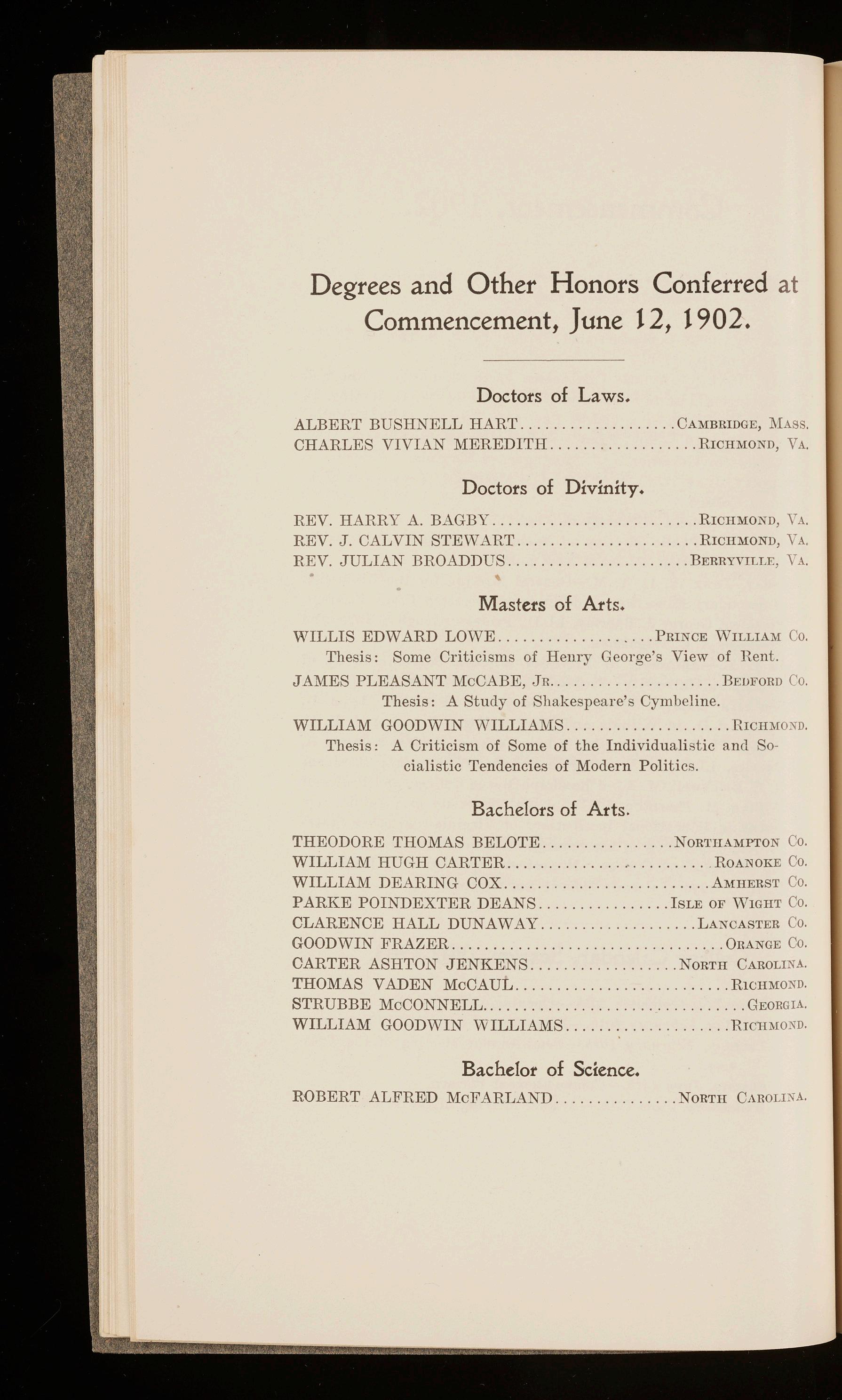
Degrees and Other Honors Conferred at Commencement, June l 2, l 902.
Doctors of Laws .
ALBERT BUSHNELL HART ........ CAMBRIDGE,MASS. CHARLES VIVIAN MEREDITH........ . ... RICHMOND, VA.
Doctors of Divinity.
REV. HARRY A. BAGBY RICHMOND, YA.
REV. J. CALVIN STEWART ............... ...... RrcrrMOND, VA.
REV. JULIAN BROADDUS ................. . .... BERRYVJUE, YA.
Masters of Art s.
WILLIS EDWARD LOWE PRINCE WILLIAM Co.
Thesis: Some Criticisms of Henry George's View of Rent.
JAMES PLEASAL~T McCABE, Jn.. . BEoFono Co
Thesis: A Study of Shakespeare's Cyrn beline.
WILLIAM GOODWIN vVILLIAMS RICHMOND.
Thesis: A Criticism of Some of the Individua l istic and Socialistic Tendencies of Modern Po l itics.
Bachelors of Art s.
THEODORE THOMAS BELOTE ......... NORTIIAMITON Co.
WILLIAM HUGH CARTER ............... ROANOKECo. WILLIAM DEARING COX ......................... AMIIERST Co.
PARKE POINDEXTER DEANS ISLE OF WIGHT Co.
CLARENCE HALL DUNAWAY ............. LANCASTER Co.
GOODWIN FRAZER ......... ORANGECo.
CARTER ASHTON JENKENS ...... NORTIT CAROLINA. THOMAS VADEN McCAUL ...... . . .. ................ RlCIIM0 ND. STRUBBE McCONNELL ........ .......... GEORGIA.
WILLIAM GOODWIN WILLIAMS .................... Rrcmro ND.
Bachelor of Science.
ROBERT ALFRED McFARLAND NORTH CAROLIXA.

HONORS CONFERRED AT COMMENCEMENT. 25
EDGAR LEE A LLEN ... ... . . .... Kixo AND QUEEN Co.
ROYALL EUBANK CABELL Rrc:n1110No
LUCIAN BAUM COX ........................ PmxCEss ANNE Co.
JOHX TE 1PLE DEHART TESNESSEE.
CHRIST OPHER BRO\Y~E GARNETT MATHEWSCo.
ELDRIDGE McGUIRE GATHRIGHT . LOUISA Co .
CHARLES HENRY GURNEY ................... MASSACJIUSETTS.
ROBERT NELSON POLLARD .... . ... . ...... .. ..... . RrcmroND.
CIIARLES ARMISTEAD SINCLAIR PRINCE WrLI.IAllf Co.
HOWARD GAY LE SPENCER .. ................. .... KENTUCKY.
ERNEST HOW ARD WILLIAMS N ANSEllfONDCo.
ROBERT EDWIN \YILLJAMS ..... ..... ........ GILES Co.
T. T. Belote Korthampton Co.
C. C. Bowe ..... .. . ........ ...... . ..... .......... Richmond.
E. P. Buxton ... Newport News.
J. Billi kopf .. ....... . . . .. . ... .. ... Richmond.
\1 P. Clark Chesterfield Co.
S. A. Derieux ............ . .... . . . ................... Henrico Co.
Mar)T C. Harris _ .............. Culpeper Co.
G. \Y. Fogg .... King and Queen Co.
P. \Y. James .......................... Culpeper Co.
L. L. Jenn ings Culpeper Co.
A. \Y. H. Jones . . ...... Spotsylvania Co.
F. \V. Kerfool. .. Cl arke Co.
S. 1IcConn ell ... . ...... ..... ... ........ Georgia
J. Moncur e .... ..... Richmond.
J. C. Quar les .. .. ...... .. . .......................... Henrico Co.
J. E. Oliver ............ .. .... ...... ....... ... ... Botetourt Co.
L. M. Ritter Clarke Co
A. C. Terre ll ....... . .... .. . . ....... . . Hanover Co.
J. P. Thomas, Jr. , Ri <:hmond.
Bertha B. William~ ... ... .. .... . .. . . .. ... .. Richmond.
W. G. Wi lli ams .......... . ... . .. Richmond.

2G RrcnMOND COLLEGE.
Greek.
W. H. Carter .................... . Roanoke Co.
Goodwin Frazer ...... .. ..... . ...... . .. Orange Co. ~.\, W. H. Jones .................... . . ..... Spotsy l vania Co.
F W. Kerfoot ........................................ Clarke Co.
S. T. Matthews, Jr ........ Norfolk.
J. E. Oliver ................. ·...... . ........ ...... Botetourt Co.
H. W. Sublett ... . ....... Richmon d.
French.
R. E . Ankers ...... . ... . ................... ..... Loudoun Co.
Lucille Johnson ............... Richmon d.
T. B. Taylor ................. Brazil.
E. Wirt Williams ............ ................. .. .... Richmond. W. Goodwin Williams ...... · .... R i chmond.
German.
R. E. Ankers . ... . Loudoun Co.
Jacob Billikopf. ........ ..... Richmond.
\Y. D. Cox........ .. . .. ... Amherst Co.
J. M. Hughes ............ Rappahan no ck Co.
T. E. Hughes. . . . . . . . . . . . . . . . Rappahannock Co.
H. B. Schultz ....................................... He nri co Co.
W. H Carter ................................... Roanoke Co.
C A. Jenkens, Jr · .... North Carolin a.
W. P. Powell .......................... .... Spotsy l van i a Co.
Isabel Harris... . . . . . . . . . . . . . . . . Richmon d.
R. A. McFarland ............... North Carolina.
Strubbe McConnell ... · Georgi a.
R. R. OliYer Hanover Co.
P. P. Dean s Isle of Wight Co.
W. E. Lowe ........ .......... .. ............ . Prince William Co.
C. :!\I. Robertson . ............ Alb ema rl e Co.
W. A. Wallace ........... . . . .......... Au gusta Co.
I -IoNORS CONFERR ED AT COMMENCEMENT. 27 Physics.
\V. D. Cox Amherst Co.
R. A. McFar land .......
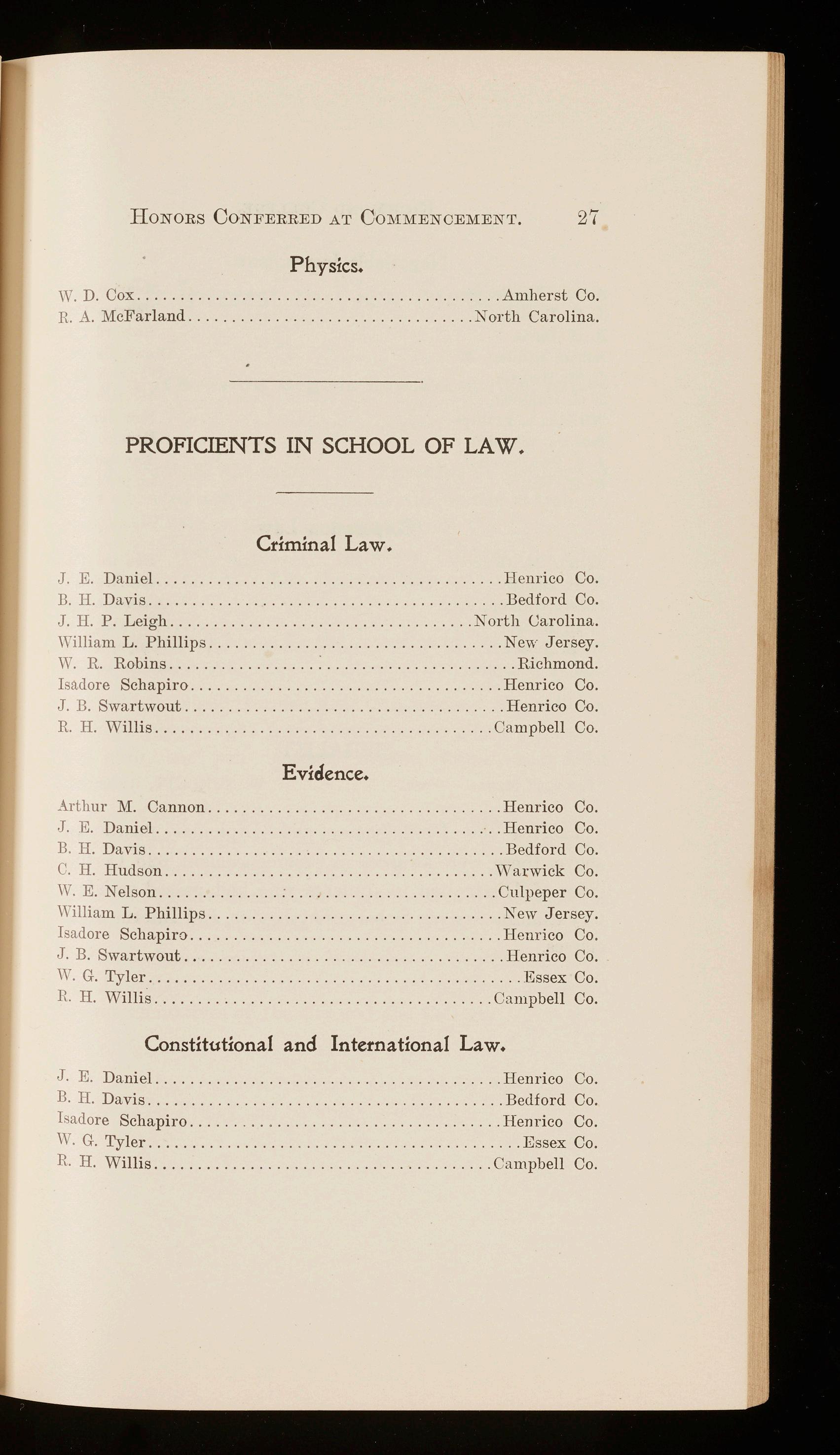
. Nort h Carolina.
Criminal Law.
J. E. Danie l ....
........ . .. Henr i co Co.
B. H. Dav i s Bedford Co.
J. H.P. Leigh ..................... ............. North Uarolina.
Willia m L. Phillips
New Jers ey.
\V. R. Robins ........... : .... Ric hmond.
Isadore Schapiro Henrico Co
J B. Swartwout. . . Henrico Co.
R. H. Willis Campbell Co.
Arthur M. Ca nnon
Henrico Co.
J. E. Danie l Henrico Co.
B. H. Dav i s ........ Bedford Co.
C. H . Hudson
1Vai:wick Co.
\V. E. Nelson .... : .. . Culp eper Co.
Willia m L. Phillips .......................... New Jer sey
Isadore Scha piro Henrico Co.
J. B . Swartwo ut Henrico Co.
W. G. Tyle
Essex Co.
R. H. W illi s .. Ca mpbell Co.
Constitutional and International Law.
J. E. Dan iel Henrico Co.
B. H. Davis ................... Bedford Co.
Isadore Schapiro
Henrico Co.
\V. G. Ty ler Essex Co.
R. H. W illis ... ..................
Campbe ll Co.
28
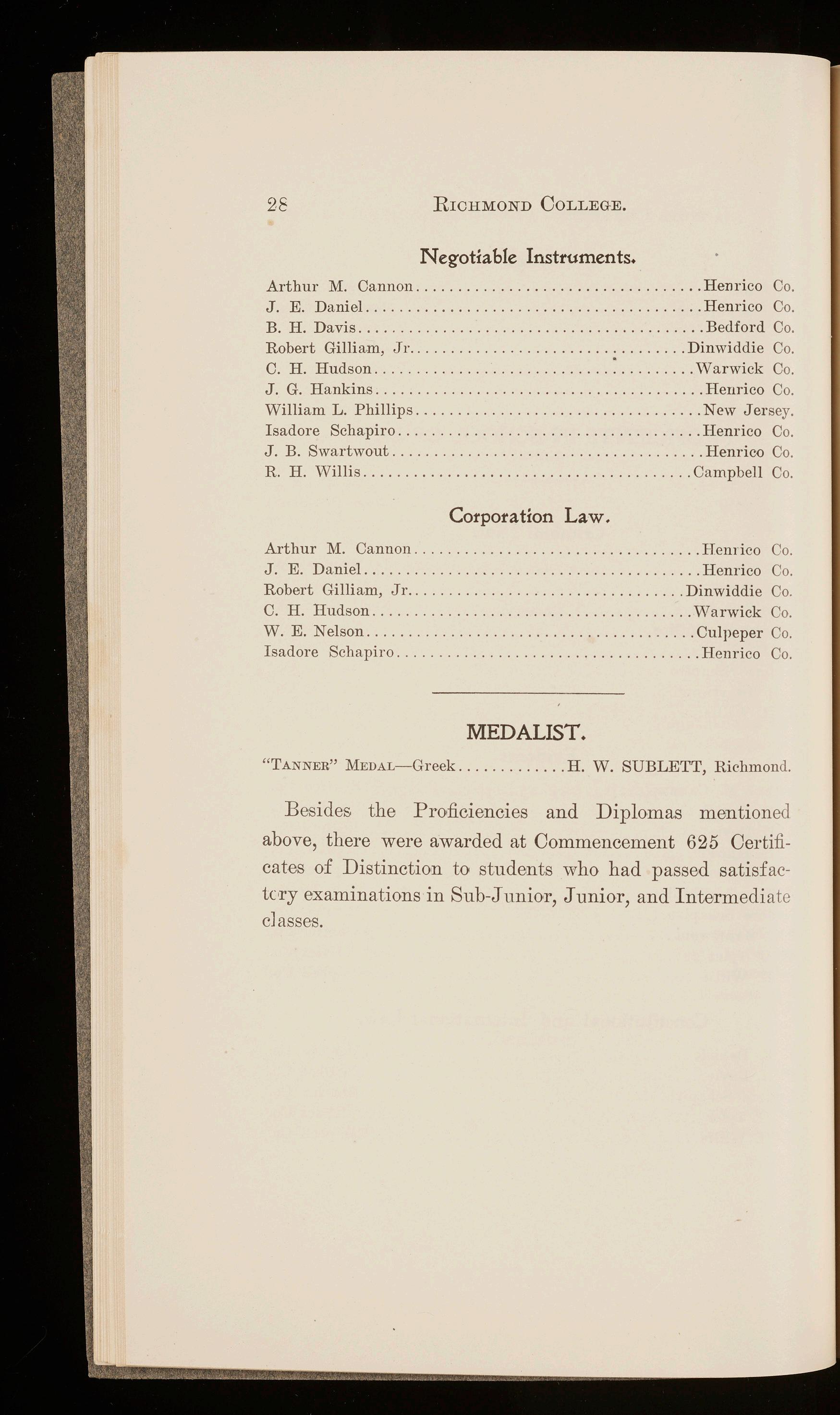
RICHMOND COLLEGE.
Negotiable Instruments.
Arthur M. Cannon . Henrico Co.
J. E. Daniel ....
. Henrico Co.
B. H. Davis Bedford Co.
Robert Gilliam , JL Dinwiddie Co.
C H. Hudson . : .. Warwick Co.
J G Hankins .. . Henrico Co.
William L. Phillips .. New Jer sey
Isadore Schapiro Henrico Co.
J. B. Swartwout . .. Henrico Co.
R. H . Willis ....... . ......
Corporation Law.
. . ... Campbell Co.
Arthur M . Cannon . Hemi c o Co.
J . E. D a niel ..
.. Henrico Co.
Robert Gilli a m , Jr . . Dinwiddie Co.
C H Hud s on .. Warwick Co.
W . E. Nelson .
.... Culpeper Co.
Isadore Schapiro . . Henrico Co.
" TANNER" MEDAL - Greek .. H. W. SUBLETT, Richmon d.
B esid es the Proficiencies and Diplomas mention ed above, there were awarded at Commencement 625 Certi ficat es o:f Distinction to students who had passed satis:factc,ry examinations in Sub-Junior, Junior, and Intermedi ate classes.
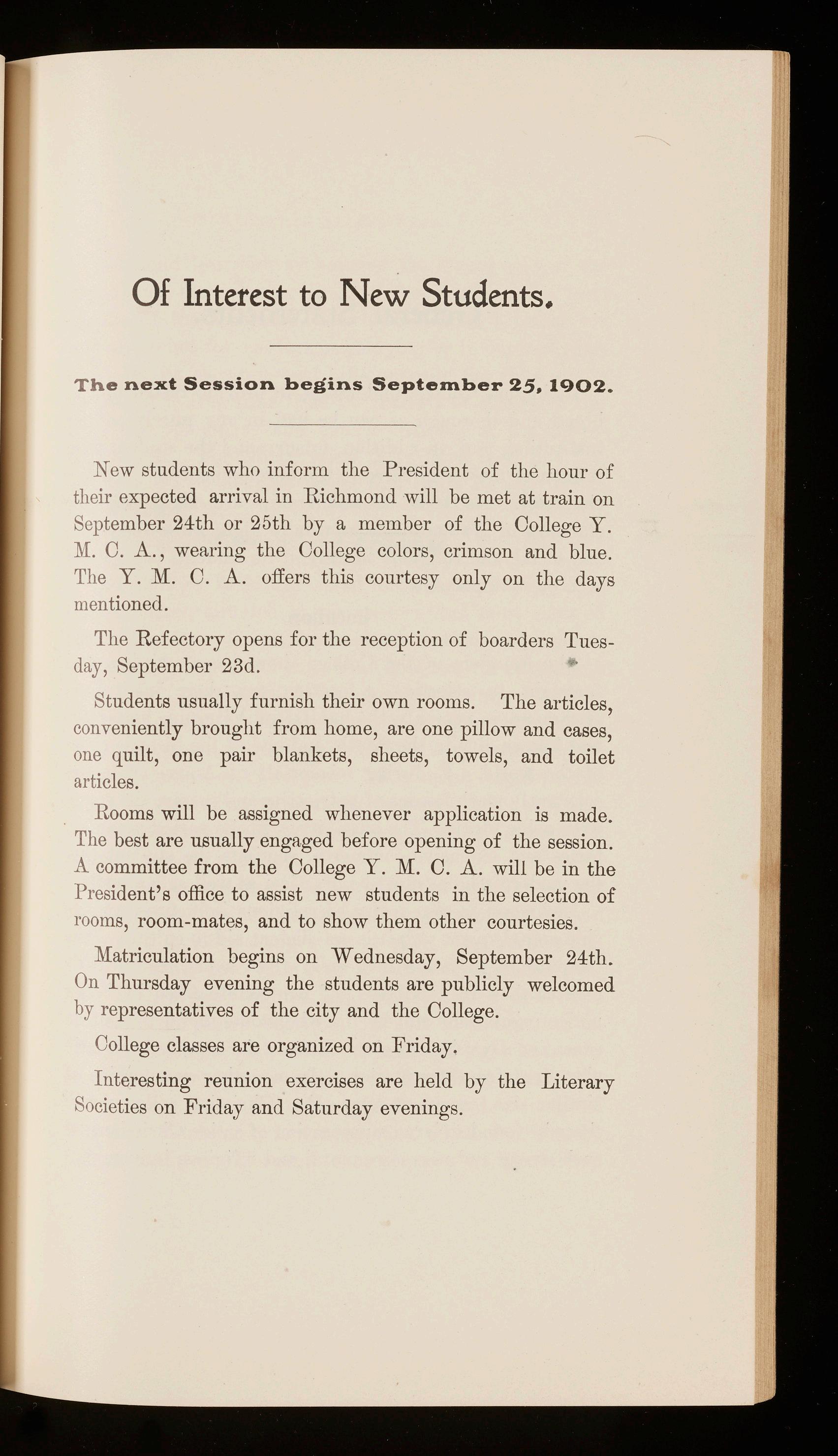
Th e next Session begins September 25, 1902.
Ne w students who inform the President of the hour of their expected arrival in Richmond will be met at train on September 24th or 25th by a member of the College Y. M. 0. A., wearing the College colors, crimson and blue. The Y. M. 0. A. offers this courtesy only on the days mentioned.
The Refectory opens for the reception of boarders Tuesday, September 23d.
Stu dents usually furnish their own rooms. The articles, conveniently brought from home, are one pillow and cases, one quilt, one pair blankets, sheets, towels, and toilet articles.
Rooms will be assigned whenever application is made. The best are usually engaged before opening of the session. A committee from the College Y. M. 0. A. will be in the Presid ent's office to assist new students in the selection of rooms, room-mates, and to show them other courtesies.
Matriculation begins on Wednesday, September 24th. On Thursday evening the students are publicly welcomed by represen tatives of the city and the College.
College classes are organized on Friday.
Inte resting reunion exercises are held by the Literary Societies on Friday and Saturday evenings.

Richmond C-Ollegeundertakes to provide in1:,truction as broad and thorough as can be had in any purely secular institution, and, in. addition, to sunound the student wi th influences most conducive to the development of Christi an character. Its tests of scholarship are rigid and the standard of graduation is unusually high, while the ph ysical, social, and religious welfare of its students is regar ded as no less important.
The found e rs of the College showed rare wisdom and for esight in selecting a location for their institut ion. Richmond is not only the capital of Virginia, but _ i s the best known city in the South, and one of the historic cities of the world. Enduring memorials of American heroes constantly teach lessons of patrio t ism and ins ·pire the young with noble ideals. The busy city, with its varied manu factories and extensive commerce, reminds the student th at the mod ern s.cholar must be practical as well as learned. Richmond is also a city of r eligious influences, and its able and eloqnent pulpit is an efficient aid to culture. The temptation s to young men away from home are but li ttle greater than in a villag e, and are counteracted by better police reg·ulations and by the wholesome moral tone of an exceptionally religious city. Life on the campus is rem arkably free from temptation. In no other communit y of similar size, except at some other · Christian colleges, will there be found so large a proportion of active Christian s, or such str011gand pervasive moral and r •eligious influen ces.

Richmond lies midway between the severe col d of the North and the relaxing heat of the South . T he nine months of the scholastic year have few days either too cold or too hot for comfort in studying or in outdoor exercise. By its elevation-on hills opposite the fa ll s of the James- it is free alike from the malaria of tidewater and from the pulmonary and enteric diseases of the mountain region. For thirty years there have been but few serious cases of sickness-none that could be ascribed to local causes.
The College buildings stand in a beautiful park of thirteen acres, situated in the western and most elevated part of the city. This is the residence section, and abounds in homes of wealth and culture. These natural advantages have been supplemented by municipal improvements, including gas and electric lights, a water supply, and a thorough system of drainage. The sanitary arrangements are first clas&in every respect.. Thus health, comfor t, and means of recreation in open-air exercises, with sufficient seclusion to promote &tudy, have been provided for and will receive constant attention.
The main building stands near the middle o,f the campus, and from it the surface slopes gently down on e,verysi de to the encompassing Etreets. The north wing, 46x104 feet, is devoted mainly to dormitories, 18xl 4 feet, hi_ghpitc hed, well lighted, and ventilated by open :fireplaces. The centre building, 110x42 fret, contains on first floor a chapel with seating capacity of eight hundred; on second floor, lecture-rooms, well furnished with blackboards, maps, charts, and other appliances ; and on the third ' floor t hree hanclsom0ly furnished halls, 30x40 feet, for the Collegewcieties. The south wing contains a Library Hall

RICHMOND OoLLEGE.
dedicated to the memory of Dr. J. B. Jet er ; and on the second fl.om a spacious and elegantly furnished }.Ifus 0um and Art Gallery, a memorial to James Thomns, Jr. All these public balls are heated by steam.
Directly in the rear of the main building is n Dining Hall, with all needful appliances, and a Gynmas ,ium and Bath-Room under the same roof. On one side of this, arnl in the s-ameline, making a row parallel to Lombardy &treet, is a cottage for students, with rooms arranged in pairs, study and cbnmber. each 9x14; also two residEm0es of professors. On the other side are three such residences. Thus the students are brought all the time within the personal influence of at least five professors and their families, and the social, religious, and literary life of the College is very greatly promoted.
On November 17, 1899, two new buildings ·were opened. These buildings are known as Science Hall and Memorial Hall. The former cost, with equipment, thirty thousand dollars; the latter twenty thousand dollars ' . Both are built of pressed brick, with granite trimmings.
Science Hall rneasmes 120x51 feet, and is three s.tories above a basement. The well-lightE-Jdbasement contains boilers for heating three buildings with steam, and also shops and apparatus rooms. The twenty-seven rooms above the basement are all devoted to instnlCtion in the natnral sciences. On the first floor are three bbora tories for chemistry, a lecture hall, a library-room, a bnlanceroom, professor's office, and two supply rooms for chemicals and apparatus. The first y-ear laboratory accommodates fifty students at one time. The second year bbor atory lias desks for twenty-four. The l ecture-room hns terraced
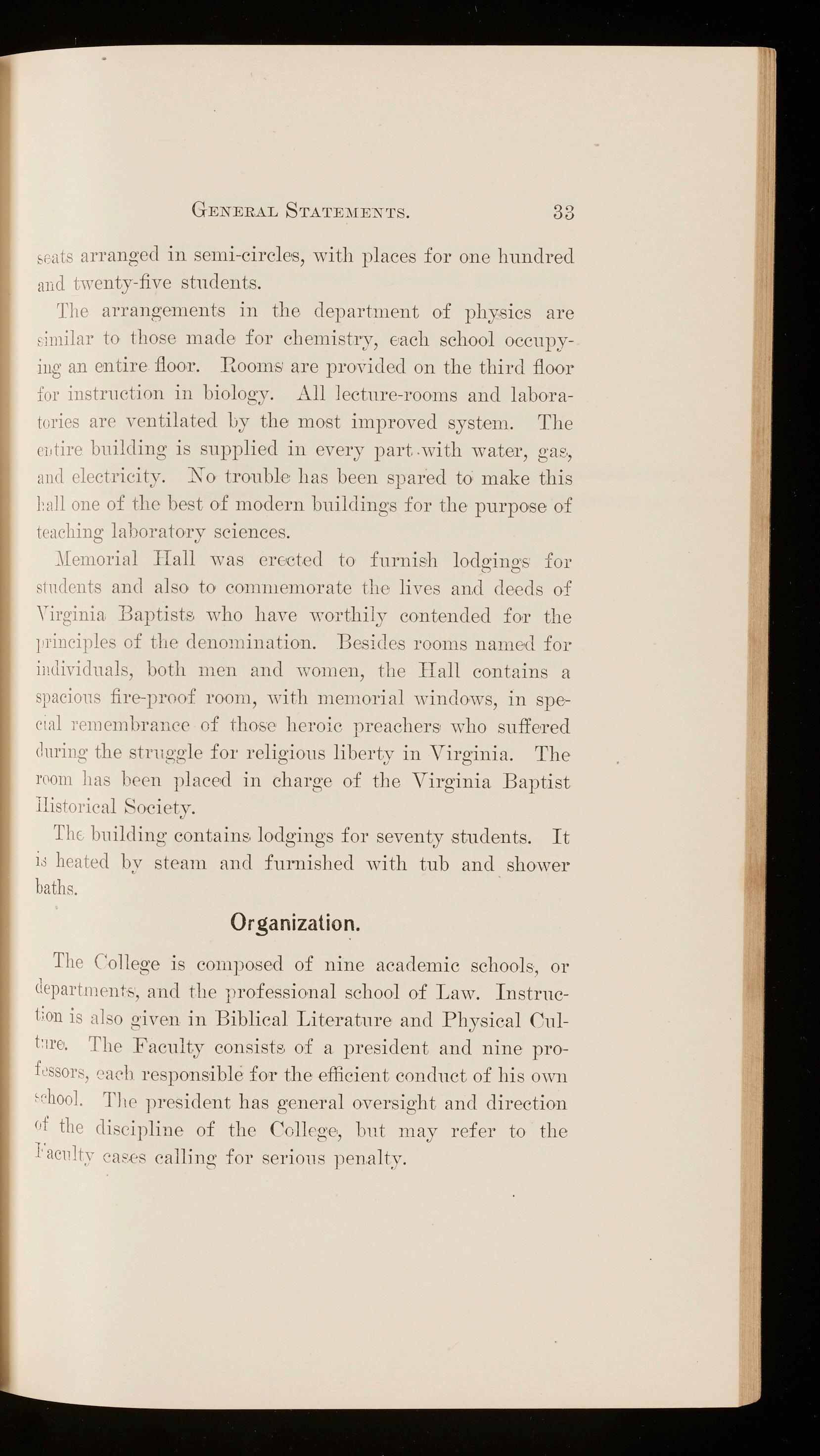
GENE R A L ST ATE~ ! EX T S
frats arrange d i n semi -circl es, with pl aces fo r on e hundr e <l and twenty-five st nd ents
The arra n ge m en ts i n t h e department of phys i cs a r e ,imilar to tho se mad e for ch em i stry, eac h sch ool occnpyiug an entire Hoor. Rooms a r c p r ovi de d on the t hir d Hoor for inst ructio n i n bio l ogy . A ll lect ur e-r oom s and l aboralO!'iesar e ventilated by t h e most i rn p rond system . T h e c,,tirc b uilding i s su pp l ied in enry pa r t. with wate r , ga e. , a\l(l elect ri city. Xo trou bl e ha s been spa r ed to ma k e t hi s hill one of the best 0£ m ode rn b uil d in gs for t h e pur pose of teaching la h or a t ory sciences .
.:\Iemorial Hall was crcdcd to furni s·h l odg i ngs for stndcnts and al so to commemorate th e li YCS and deed s of Yirginia Bapt i st & who h aYe wort hi ly con tended fo r the 1,rinciples of t l 1e fl enorn i 1rntio11. Besides rooms named for imliviclual s, both men and women, th e Hall conta i ns a spacious fire -pr oof room, ,1· i t h memo ri al \\·i nclows, i n spee1al rrme mhran cc of t h ose h cTOic preac h ers , w h o su ffe r ed during t he strngg l e fo r r eli gio u s lib erty in V irg ini a . Th e room has bre n pbced in ch a r ge of t h e V i rg ini a Ba p t i st Historical Soc i e ty.
The b ui l d in g con ta in &l odg in gs fo r seven ty st u de n ts . It i.; heated by stea m and ful"lli sh ed w i t h t ub and sh ow er baths
The College i com pose d of nin e ac a,l erni c sch ool s, or departrnr nt,;, an d t h e p rof ess i onal sch ool of L aw. In st rn c1:oni s al so g i ven in Bibl i c al Li ter a t ure and P h ys i ca l <:11lt :1re, . T he Fac ul ty con si st & of a pr esid en t a nd nin e p r of,•ssor~,('acb r espo n sibl e fo r t h e effici en t con du ct of hi s ow11 , d100]. The pr es id en t ha s ge n er al ov er si g h t an d dir ect i on r,f the di sci p lin e of t h e C ol l ege,, b ut may r efe r to th e hc 11lty ca~e8 ra llin g fo r ser i o11 s p enalt y
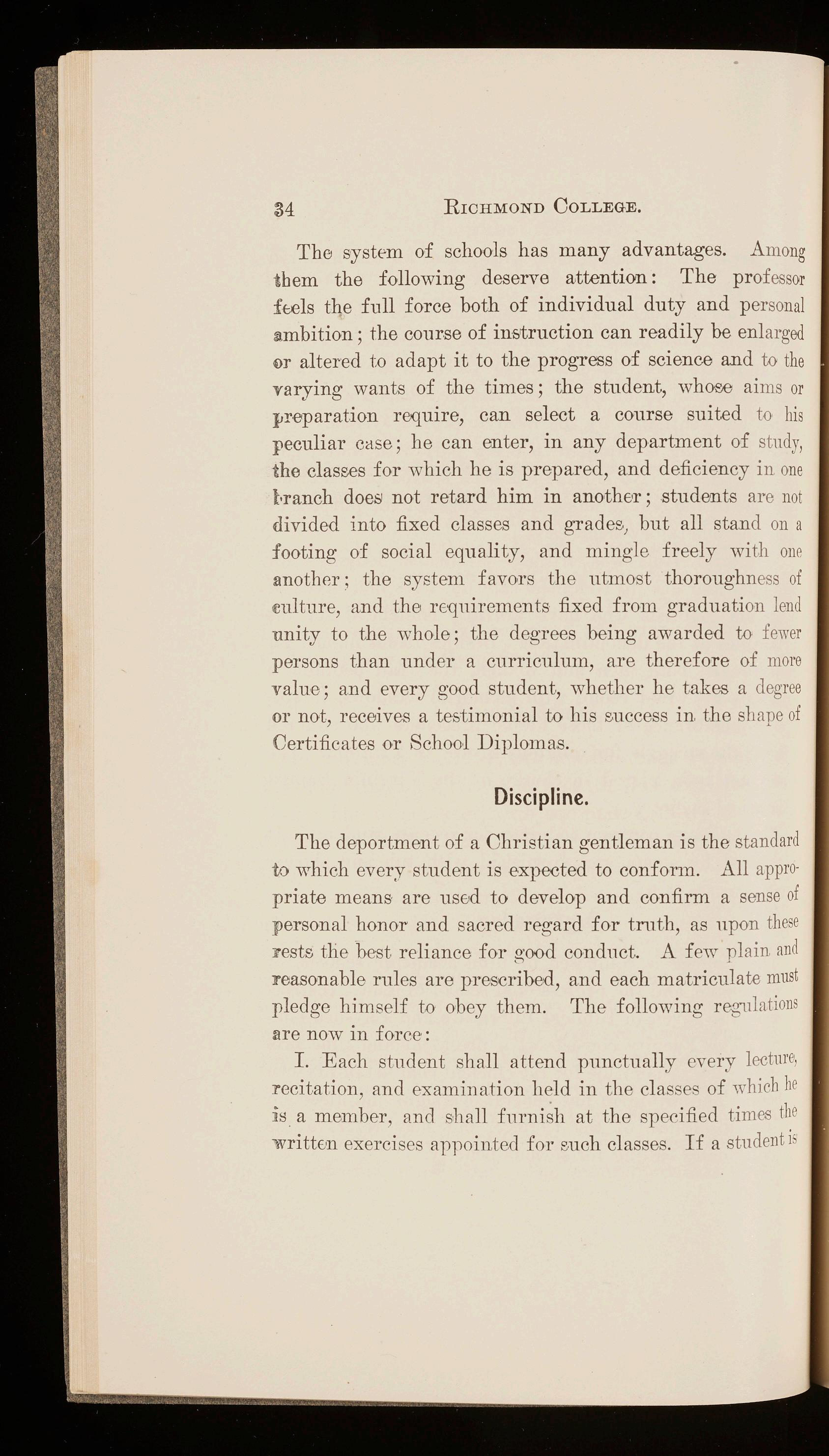
RICHMOND COLLEGE.
Th0 system of schools has many advantages. Among the m the following deserve attention : The pro fessor fb€ls the foll force both of individual duty and personal ambition; the course of in&truction can readily be enlarged or altered to adapt it to the progress of science and to the varying wants of the times ; the student, whooo aims or i,reparation require, can select a course suited to his peculiar case; he can enter, in any department of stndy, the classes for which he is prepared, and deficiency in one hanch doef! not retard him in another ; students are not divided into fixed classes and grades, but all stand on a footing of social equa li ty, and mingle freely with one imother; the system favors the u tmost thoroughness of cmltnre, and the requirements fixed from graduation lend unity to the whole; the degrees being awarded to fewer persons than und er a curriculum, are therefore of more value; and every good student, ·wheth er he takes a degree or not, receives a te&timonial to his Emccessin the shape of Certificates or School Diplomas.
The deportment of a Christian gentleman is the standard to which every stude nt is expected to conform. All appropriate means are u s0d to develop and confirm a sense of :personal honor and sacre d regard for tn1th, as np on these ::reststhe best reliance fo r good condnct. A few plain nnd reasonable rules are prescribed, and each matriculate must pledge himself to obey them The following regulations are now in force:
I. Each student shall attend punctually cyery lecture, :recitation, and exami nation h eld in the classes of whichhe is a member, and sha ll forni~h at the sperified times the writtEm exercises appointed for such classes. I { a student is
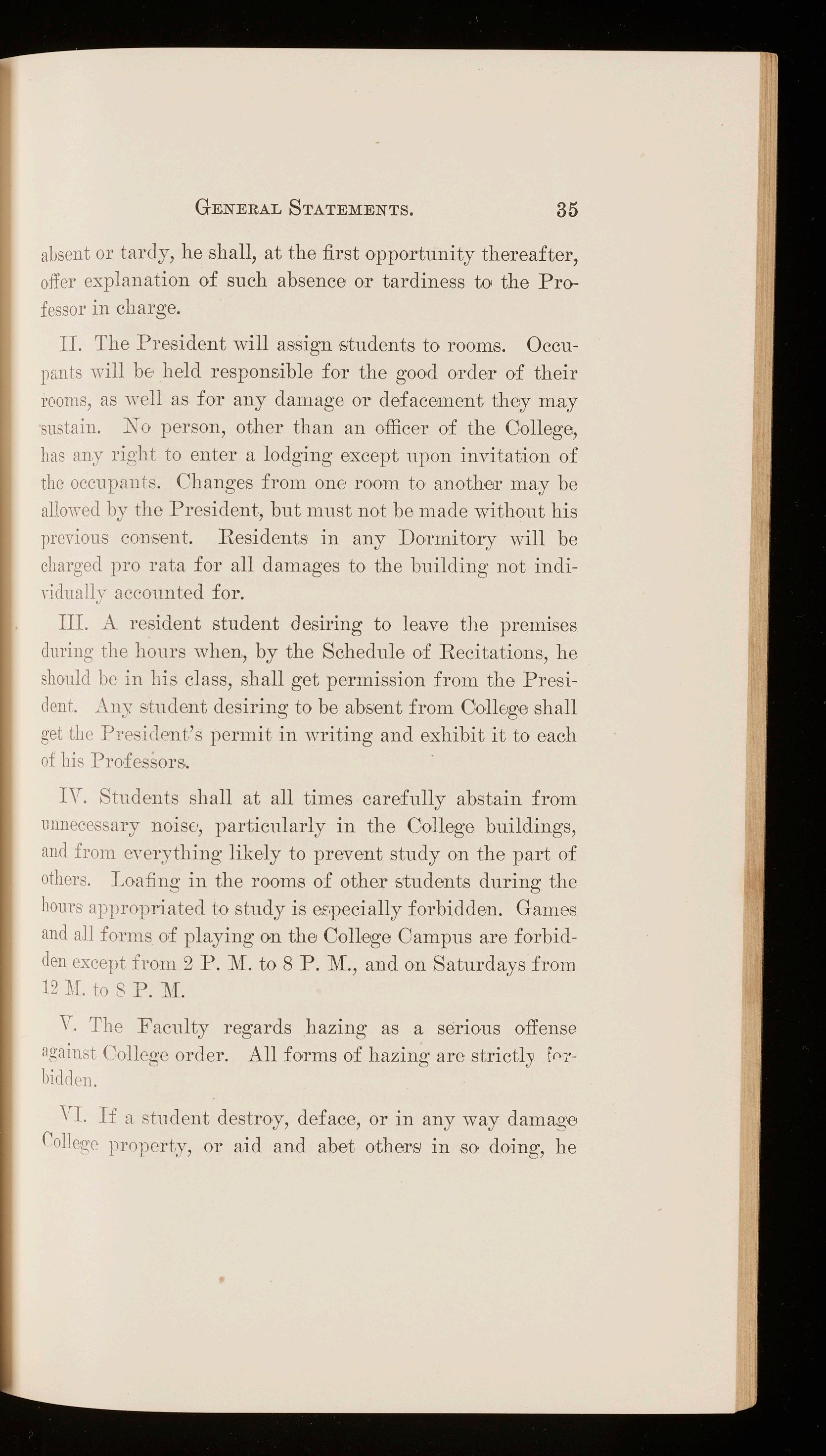
a!Jsentor tardy, he shall, at the first opportunity thereafter, offer explanat ion of such absence or tardiness to the Professor in charge.
II. The President will assign f,tudents to rooms. Occupants will bE:•held respom;ible for the good order of their rc,oms, as ,rell as for any damage or defacement they may sustain. X o person, other than an officer of the College, has any ri,1::htto enter a lodging except upon invi t ation of the occupants . Changes from 0110 room to another may be allowedby the Pres id ent, but must not be made without his previous com,ent. Residents in any Dormitory will be charged pro rata for all damages to the building not indiriclnally acconnte d for.
III. A r esident student desiring to leave the premises during the hours when, by the Schedule of Recitations, he should be in his class, shall get permission from the Pre sident. , \ny stndent desiring to be absent from Ooll0geshall get the Pl'esid0nt.'s p ermit in writing and exhibit it to each of his Professors.
IY. Students shall at all times carefully abstain from nmH:ccssary nois0, particn1arly in the College buildings, and from ever yt hing likely to prevent study on the part of others Loafing in the rooms of other ·students during the hours appropr iat ed to study is e£,peciall y forbidden. Garn es and all forms of playing on the CoUege Campus are forbiddenexcept from 2 P. J\L to 8 P. M., and on Saturdays from 12 ).L t o S P. }.I.
Y. The Faculty regards hazing as a serious offense against College ord er. All forms of hazing are strictly f01•hiclrk n.
iT If a stm lcnt destroy, d eface, or in any way damage f'ollrQ·c prope rty, or aid and abet other8 in so doing, he
shall, within tw-enty-fonr h011rs, report the fact to t h e Pres ident in writing, and pay (to tlic Treasurer) th e n ecessary cost of repairs; othern·ise clonble that amoun t ,, i ll be charged against his contingent deposit, which mu st be renGwed whenever exhausted by such charges. Pl ay in g ball in the buildings and throwing water from windo 1rs or porches are strictly prohibited.
YII. Ko student shall bring upon the premis e:; or keep in his posses sion any playing cards, intoxica t in g li qnors, dogs, or deadly we apons.
VIII. No Clubs or Societies shall be formed nnl e~s the Faculty, on application made, approve the d esign of snch ,\ssociation, the rules by ,d1ich it propo f,es to be g ovemed, and the hours of m eeting.
Re sident students desiring to board elsewh ere t h an on the College premises shall fo·st obtain the approval of the President. ·
In tlrn observance of these rules and in all matt ers not specially mentioned, the deportment of a gentleman and n student is the standard to which eYery one is exp ected to conform. His sense of honor is the main reliance, an d his word in matters touching his own conduct will be call ed for at the discretion of the President.

Whenever the President learns that a student is n ot im· JJroving his time, or is living disorderly, he first advi ses mid admoniEhes the young man before any penalty is im posed, except in grave offenses. It is neither the desire nor the purpose of the authorities to disgrace any student, bu t ewry one must live a pure, orderly and hnsy life, or wi thclraw from the College. Idling, card playing, and all oth er forms

:37 of dissipatio n aro strongly cond emned by the authorities, and stnde nts who pcrsi e.t in th ese thing s will be disciplined aud Jll,ty be clis1uistic<Cl.
The <'ollcge is neither a reform school nor a prison, bnt r,n in,tit 11tion of learning, and the opportunities i t offers for n ~omi(l C'hri5tian edncation at moderat e cost are to k ]oohd 11pon a s high priYileg rn , in return for which tho,<' \\'ho a ttc ud upon i ts. in s tn1ctio11 arc nncler a positive 0Lliµ:a1io11to make the mo st of th e acl vantage&' placed at tlwir d ispm:nl by tlic rnnnificcnc e of i ts founders a nd bcnefac-tnr,. The }'rcsicle1 1t and mern l, crs of 1he Faculty hold tlic111,<lYrs at nll times ready to assist ancl encourage those yo1111!.!·rnrn \rho are ea rn est in their ~earC'lt after knowlcd!.;e;li11tif thrrc he, au.'- in whom thr spir i t of ea rne 5tnc ss rloe~11ot<·xi,t, or in whom it cannot h e, inculcated, they are herrh:· wnr necl that· R i clnnoncl C'ollrp:e is n ot the place fo r tliern. [t. is gratify ing to add that, clnring the session 1001-:?,tl1<•hclrnvio r of stm l ent s wa& 1 so excellent that the Faenlty '.rm; not r eq nirecl t o n<·I up on any case of clic,l'iplinr.
Student.;; haYe easy acces5 to all t he nclvantages afford ed l•,, th( varion:'I c ity churches with their Bible classes and Snndaysc-hools Tho se who a r c profossors of religion may bring \\'ith tl1rm l etters of cornrnrndation, and 1Yithout SlH'1·ing-tltPir re cles ,ia stica l conucct i on s at home, attach the1n,c·l1·t•s,,·liilr h ero to some chu r ch, so as to hav e a chnrcl11101111,with the sympat h y and care of a pastor The daily dntirs of the C'ollege arc oprncd with brief d evotional (•xcn ·i~cs, conducte d hy the Prrf.ident and attended hyprof<,sors. Praycr-mcetillgP, cornlncted by the students tJ.c.m,ehr~. are held t,l'icc or oftener e,·rr,r \\'eek. Attend-

RICHMOND COLLEGE.
ance on religious exercises is <ontirely voluntary. All students resident in college buildings are expected to attend n "Yvednesday Confen =:mce" of professors and student:::.,held every Wednesday at 8 :30 A. :M:. This conference is opened or closed with brief religious exercises. The object of the conference is to promote the social and moral wellbeing of the college community.

Professor Foushee.
The course of study, embracing four years, i s indicated by the text- books u sed in the sever al classes. Stud0nts entering the school will be cl assed according to their preparation. For the l owest class there is r6quired such acquaintance with the el ements of Latin gramma r as will enableone to begin to translate with profit.
The SuB-J UNIOR and J UNIOR Cl asses are persistently drilled in the forms and the syntax of the language, with dueattent ion to quantity. The I NTERMEDIATEand SENIOR Classes continue to g iv e needful attention to grammatical principlrn, wh il e they are required to attain a good vocabulary and to imbibe the spi r it of Latin lit erat ure by an extensivecom·se of reading, somewhat varied from yea r to year. In all the cla ss-es th e student's progress i s tested, and his powers of analysis and compo&ition are cultivated by ,nitten exerci ses in rendering English into Latin and Latin into English. The disciplinar y power and cu ltural valueof the st udy of Latin are equally emp ha si~ed.
TEXT-BOOKS.
Sub-Junior.-Seco nd Year in Latin (Ginn & Co.); Nepc:s (A merican Book Compa ny) ; Bennett's Latin Composition; Bennett's Latin Grammar.
Junior.-Sa llu st's Catiline ( Ginn & Co.) ; Cicero's Or ations and Letters; Vergil's Aeneid (Ginn & Co.); Hexameter Verse; Collar 's Practical Pros e Composition; Gilder sleev e's Latin Grammar.
40

RJCHJ\IOND COLLEGE.
I ntermediate.-LiYy, 1 , XXL, a nd XX II .; Ho ra ce, Od es, Satires, and Epistles (G i nn & Co ); Meie r s of Horace; exerc i ses in Latin Prose Compos i tion based on Cicero's De Se n ectute and De Amicitia; Gilders l eeve's Lat i n Gram m a r ; n!acka i l's Lat in Literature.
Senior.-The Satires of Ju y en al; The Anna l s of Tacitus, l'lau tus, Menaechmi, Terence; Crowc ll 's se l ections from Lucret i us, Catullus, Tibu ll us, P r opert iu s, Ovi d, a nd L u ca n . Exe r ci ses i n Latin Composition; Gildersleeve's Lat i n Gramma r.
For Reference: IIarpcr s Lat i n Lexicon; Ginu's Classical Atlas; Gayley's Classic Myths.
Professor Harris.
The aim of this school is to give the student an appreciatiYc acqnnintance "·ith the best Greek autho r s and in spire fl love for Hellenic s.tudies From the beginning of the cr-urse exact ness will be insisted upon. In nll classe s, read iEg at sight will be practiced, and English will be put into Greek, either as a set exercise Ol' at. dictation. At suitablr t;mes there will he confe r ences on Greek l ife, myth ology, history, lit£ •ratnre and art, and at all times an effort "·ill be made to lead the s.tudent into a kconer appreciation of tlir grnins of the Greeks, and to cultiYate a sense for their literary tandarcls.
The work of this sch ool is embraced in the following courses:
I SuB-J ux10R CL.1.ss.-This class begins ,1·ith the alphabet, and is occu pied in secm·i.ng a thorongh kno\\·lerl?·e of forms, a working vocalrnlary, and the fondarn ental 1ioints- of syntax. In the spr ing, the Anabasis 'II-illbe taken np, and one or mo-re books wi11 be reacl. Fiv e hours n wcf'k thr011gho1dtlie year. To enter this course a k1101rledge of Latin is prereq ui site.
II. J1.;NIOR CL.,s:,;.-This class will complete , £om bookc
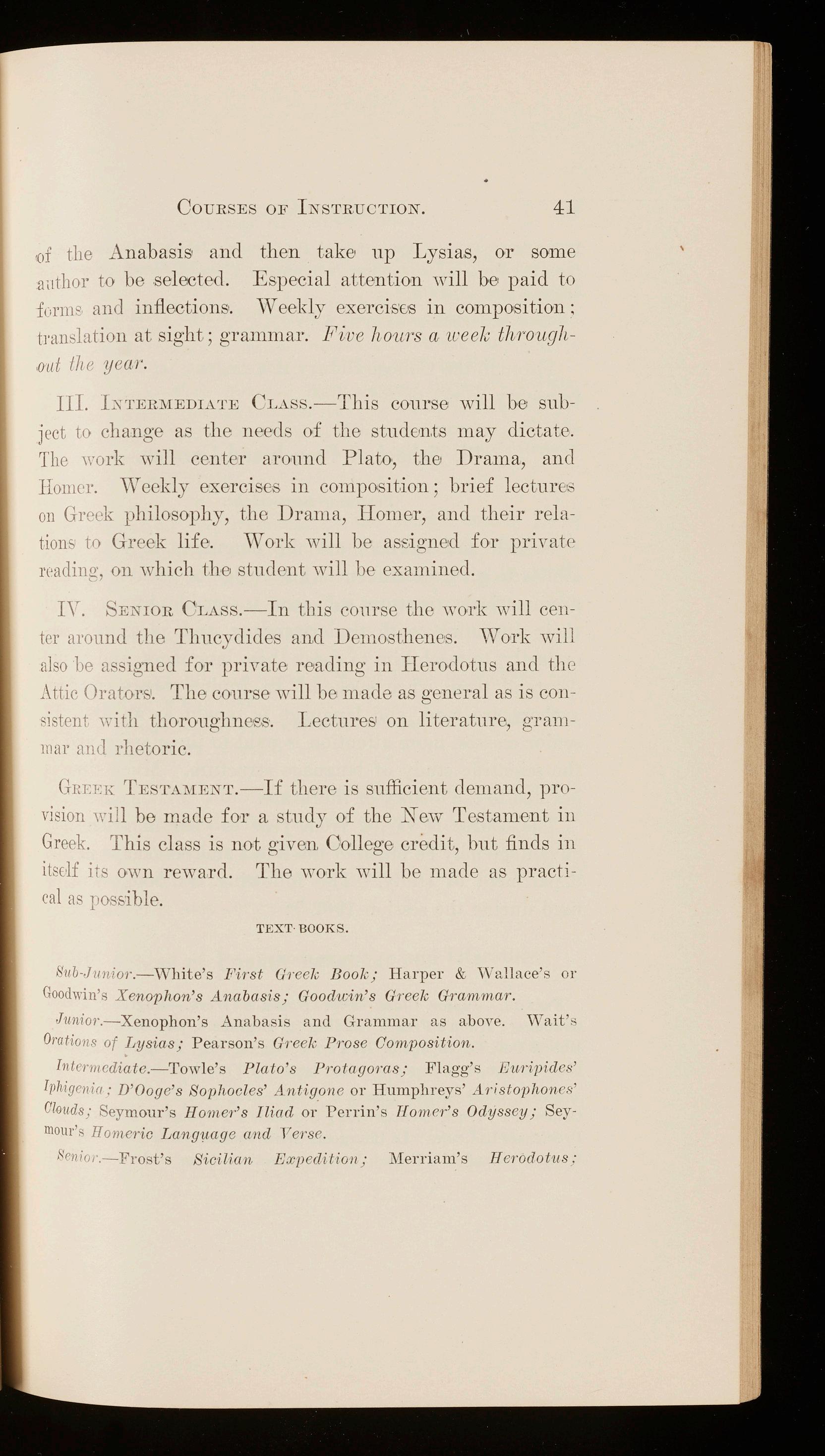
OounsEs 01, 11',sTRUCTION.
41 of the Anabasis and then take np Lysias, or some anthor to be selected. Especial attention will be paid to ft;rJll 8 and inflections,. ,Veekly exercisrn in composition; translation at sight; grammar. F'ive hoi1rs a n·eek through-Out171 e year .
III. lsTElDIE DJATB CLAS8.-This course will be suhjcct to change as the needs of the students may dictate. The work wiJl center arrnmcl Plato, the Drama, and Homer. ,Vecldy exercises in composition; brief lectur ec:o on Greek philosophy, the Drama, Horner, and their relations to Greek life. Work will be asE.ignecl for pri rn tP rl'ading, on which the stndent will be examined.
IY. SEN IOR CLASS.- In tbis conrse the -work will ce11ter aroun d the Thucydides and Demosthenes. '.Vork will alsobe assigned for private reading in Herodotus and the J\ttic Orato rs'. The co11rsewill be made as general as is collsistent ,rit h thoroughnees. Lectures 1 on literatnre, grammar aml rhetor ic.
GRF.FK TESTA:-IENT.-If there is sufficient demand, provisionwill be made for a study of the New Testament i11 Greek. This class is not given College credit, but finds in itsc,lfits own reward. The ,rnrk will be made as practical as 1,ossible.
TEXT· BOOKS.
&'11b-,Junio1·.-Vi l hite's Ji'i?-st Gre ek Book; Harper & "'allace's or Goodwin's Xeno phon's Ana basis; Gooclicin's Greek Grammar. J11nior.- Xenophon's Anabasis and Grammar as aboYe. ,vait' K Orations of J,ysias; Pearson's Gre e k Prnse Composition. lnte r111ccli~te.-Tow l e's Plato's Protago1·as; Flagg's Bwripicles' Iphigenia: D'Ooge's Sophocl es ' Antigone or Humphreys' A1·istophoncs' Clouds,· Seym our's Homer's Jliacl 01_-T'crrin's Homer's Odyssey; Seymour'., Home ric Language and Ve1·sf.
8cnior -F rost's Sicilian Bxpeclition ; Merriam's Herncloti1s:
±2

RICHMOND COLLEGE.
D'Ooge's or Tyler's Demosthenes' De Corona; Jebb's Selections from the Attic Ornto?'S; Gilders l eeve's Syntax of Classical Greek (Part I.); Jebb's Greek Literatitre.
Greek Testament.-W'estcott & Hort's Greek New Testament.
Through the Coll ege librar y the student ha5 access to all 1,ccessary works of reference .
Professor Boatv.;right.
French and German are thEJ language s taught. The aim is to give the student a knowledge of vocabulary and grammatical struct ure sufficient to enable him to read their literature with understanding and pleasurEJ; secondarily, to teach him to speak these languag es, and to undE:rstand them when spoken . In junior cla8ses, modarn authors are read, and languag e, is taught as an art. In senior classes, more attentio n i s paid to the classics and to the scientific study of l ang u age structure. Much time is devoted to the history of lit erat ur e.
The course is varied from yeai- to year in order that advantage may be taken of the latest and best helps in this department of study . The following text-books will be used during the session 1902-3 :
TEXT-BOOKS.
FRENCII.-Junior Glass.-F iv e Hours a Weelc.-Edgrcn·s French Grammar; Kuhn's French Reading for Beginners, published by Henry Holt & Co.; Le Voyage de M. P erri ch on; Le Cid Frequent dictation, conversation, and theme writing, ba sed on Fre n ch to be asRigned.
Senior Class.-Four Hours a Week.-Edgren's French Grammar; Cameron's French Composit i on; Corne ill e's Polyeucte; Moliere's Les Precieuses Ridicules; Le Bo ur geois Gent ilh omme and L' Ava re; Hugo's Hemani; Canfield's French Lyrics; selections from modern novelists;
COURSES OF INSTRUCTION.
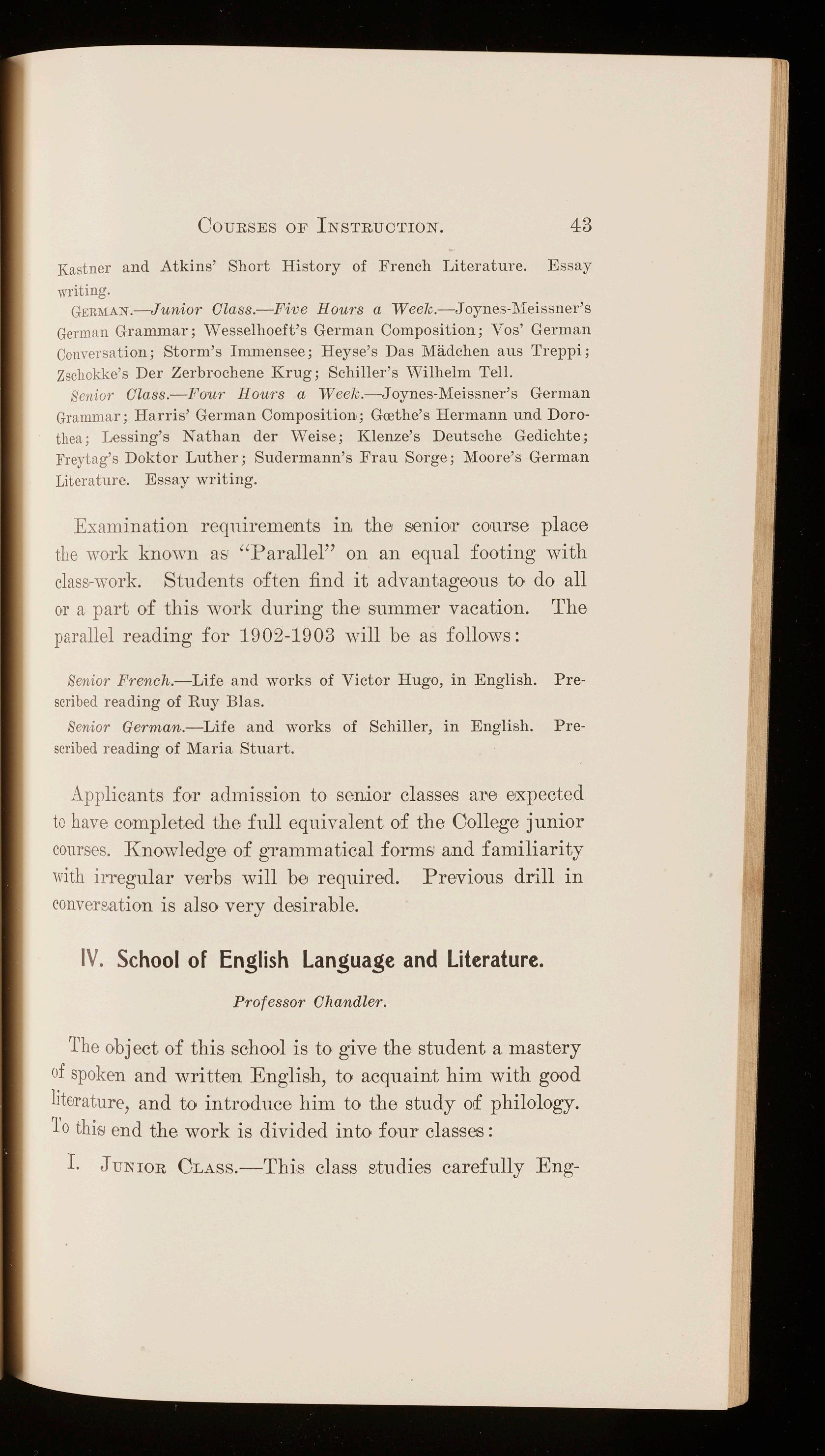
43
Kastner and Atkins' Short Hi st ory of French Literature. Essay writing.
GER11AN.-Junior Olass.-Five Hours a Week .-Joyne s-1\Iei ss n er' s German Gramma r; ,ve sse lhoeft' s German Compos ition ; Vos' German Conwrsatio n; Storm 's Imrnen see; Heyse 's Da s Madchen aus Treppi; Zschokke's Der Zerbro ch en c Krug; Schiller's Wilhelm Tell.
Senior Olass .-Fmtr H ours a W cel.:.-Joynes-Meissner's German Grammar; Harris' German Composition; Grethe's Hermann und Dorothea; Less ing's Nathan der Weise; Klenze's Deut sche Gedichte; Freytag's Doktor Luth er; Sudermann's Frau Sorge; Moore' s German Literature. E ss ay writing.
Examination r equ ir ements m the senior course place the work known a&'"P arall el" on an equal footing with class-work Stud ents often find it advantageous to do, all or a part. of this work during the summer vacation The parallel reading for 1902-1903 will be as follows:
Senior Frenc h .- Life and works of Victor Hugo, in Engli sh. Prescribedreadi ng of Ruy Blas.
Senior Germ an.-Life and works of Schiller, in English. Prescribedread ing of Ma ria Stuart.
Applicants for admission to senior cla sse.s are expect ed to have completed the foll equivalent of the College junior courses. Knowledge of grammatical forms and familiarity with irreg ular verbs will be required. Previous drill in conven,atio n is also very cle.sirable .
Prof essor Chandler.
The object of this school is to give the student a mastery of spoken and writt e n English, to acquaint him with good litEJrature, and to introduce him to the study of philology. To thif,iencl the work is divided into four classes:
I. JUNIO R CLAss.-Thi s class studies carefully Eng-
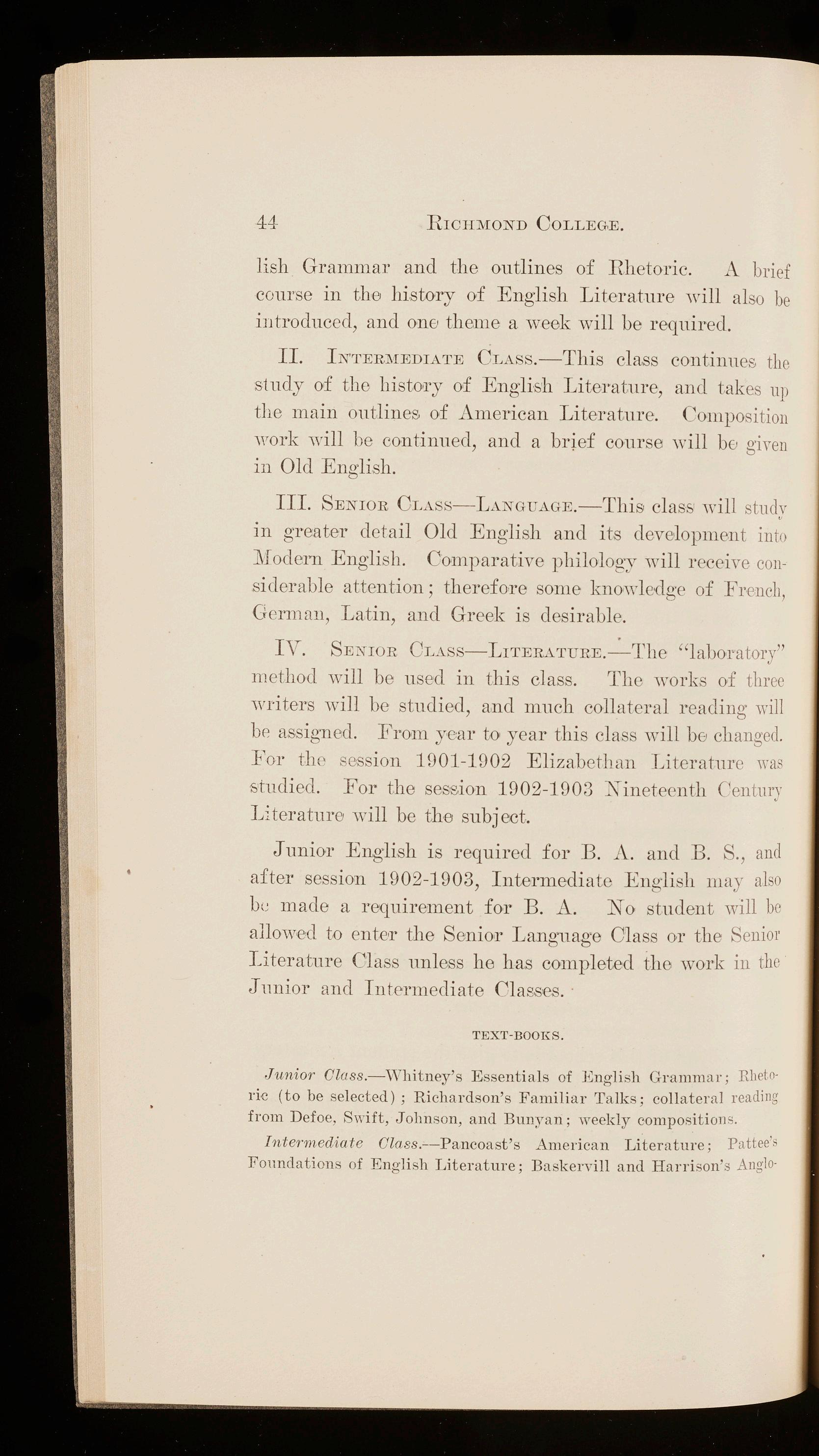
44 R1m1"'rmrn COI,LEGE. lish Grammar and the outlines of Rhetoric. A brief course in the hi sto ry of English Literature will also be iJJtroduc ccl, and ono theme a ,reek \\'ill be required.
II. Il\ "'l'ERMJ~DIATE CL.\s:-;.-This class conti1me8- tlir s1ndy of tho history of English Literature, aml 1akes up tho main outlines of Am erican Literature. Comp ositio11 work will be contim1e(l, and a brief comse will bo ginn in Old English.
III. SENIOR Cuss-L.rnGL'.WE.-This, class 1\·ill stu dy in greater detail Old English and it s clm·clopment into :i\Jodcr:n English. ComparatiYe philology will rc·ceiw consid erable attention; therefore some knmdodge of Fr ench, Onman, Latin, and Greek is desirable.
I\r. SE:\IOR C1L_\,;,;-L1TEJU.Tl'.RE._:_'I'he ''lnhorntory'' method "-ill be nsed iu this class. The \rnrks of 1hrC'e ,niters will be stndiecl, and much collateral reading ,rill bP assigned. I•'rom ;yc-ar to year this class "·ill b0 changed .For tlw session 1901-Hl02 Elizabethan Lit erntnre m1, stud ie d For the session 1!)02-190;3 Sinetef'nth Crn tmy Literatmo will be the subject.
Junior English is required for B. .\. and B. S., and after session 1902-1903, Intermediate E11glish rna y nbo b,· made a requirement for B. A. ]\ o student will hr allowed to entc •r the Senior Language Clas or the Senior I.iteraturo Class nnless he ha s completed the "·ork in the J1111ior and Iut ermccl iale C'la>'.C'S.
TEXT-BOOKS.
,Jwzior Class.-,Yhitney's Essenlials of l ngli,h Grarnma r ; TThetn· ric (to be se l ected); Richardson's Familiar Talks; co ll ateral rcadin~ from Defoe. Sll'ift, Johnson, and Btrn?an; 11·eC'klycomposition,. fnt ermecliate Closs.--Pancoast'B .American Lilerature; Pattee ·, Fo1111dations of English Literalure; Basken·ill and Harrison' s Anglo·

Co-uRsEs OF INSTRUCTION.
S,n:on Reader; English a nd American writers ( texts to be selec ted) ; collatera l reading from Longfellow , Cooper, Poe, Lanier, Timrod, Spenser, Milton, and Shakespeare; compositions.
Senior Class.-La n guage; Eme r so n 's Hi stor y of the English Language (larger book); Bright's Ang lo-Sa xon Reader; Morris and Skeat's Spe cimens of Ea rl y English, Part II.; Hall's Beowulf. Essays.
Senior CZass.-Literature: Sess ion Hl01-Hl02-Saintsbury's E li zahethan L iterature; Moul ton's Shakes p eare as a Dramatic Artist; Spenser, Marlowe, a nd Shakespea r e ( texts to be se l ected) ; cc llateral reading from Ascha m , Sidney, Jonson, Hooker, Marl01Ye, S hakespeare, a nd Bacon . Essays .
Session 1!)02-1903-Saintsbu r y's Nineteent h Centu r y Literature; Tennyson, Browning, Byron, vVord swo r t h , a nd Macau l ay (texts to be selected); colla tera l reading from Tennyson, Browning, Macaulay, Carlyle, Shelley , Keats, vVordsworth, a nd Arnold. Essays.
Professor Gaines
This school offers a course of pur e J\Iat h E.matics ext ending o-ve r four years, or di vicled into four cla sses. The ,rnrk of tho lo,n! st class pre-supposes a thorough knowledge of /1rithmctic and of Elementary Alg£,bra through simple "Equations.
The aim of t h e course i s not so much to make specialists of a few ent husiastic st udents as to give thorough mental discipline to the man y . It i s intended to increase the student's power of independ ent, earnest, hon est inv estigatio,n; to encourage th e habit of stating with clearnE-58and exactness his own convictions, and of giving logically his reason s for t h em. Throughout th e entir e course numerous ewrcises Rnd original problems ar 0 given to stimulate the stnclent's confidenc e in hi s own reasoning, and to cultivate his power of inv ention.
Bnt while mental d evelop1ne,nt i s the chief aim, st ill it i, believed that the student who master s the cours e given k low will have re,a]ized something of the power and ele-
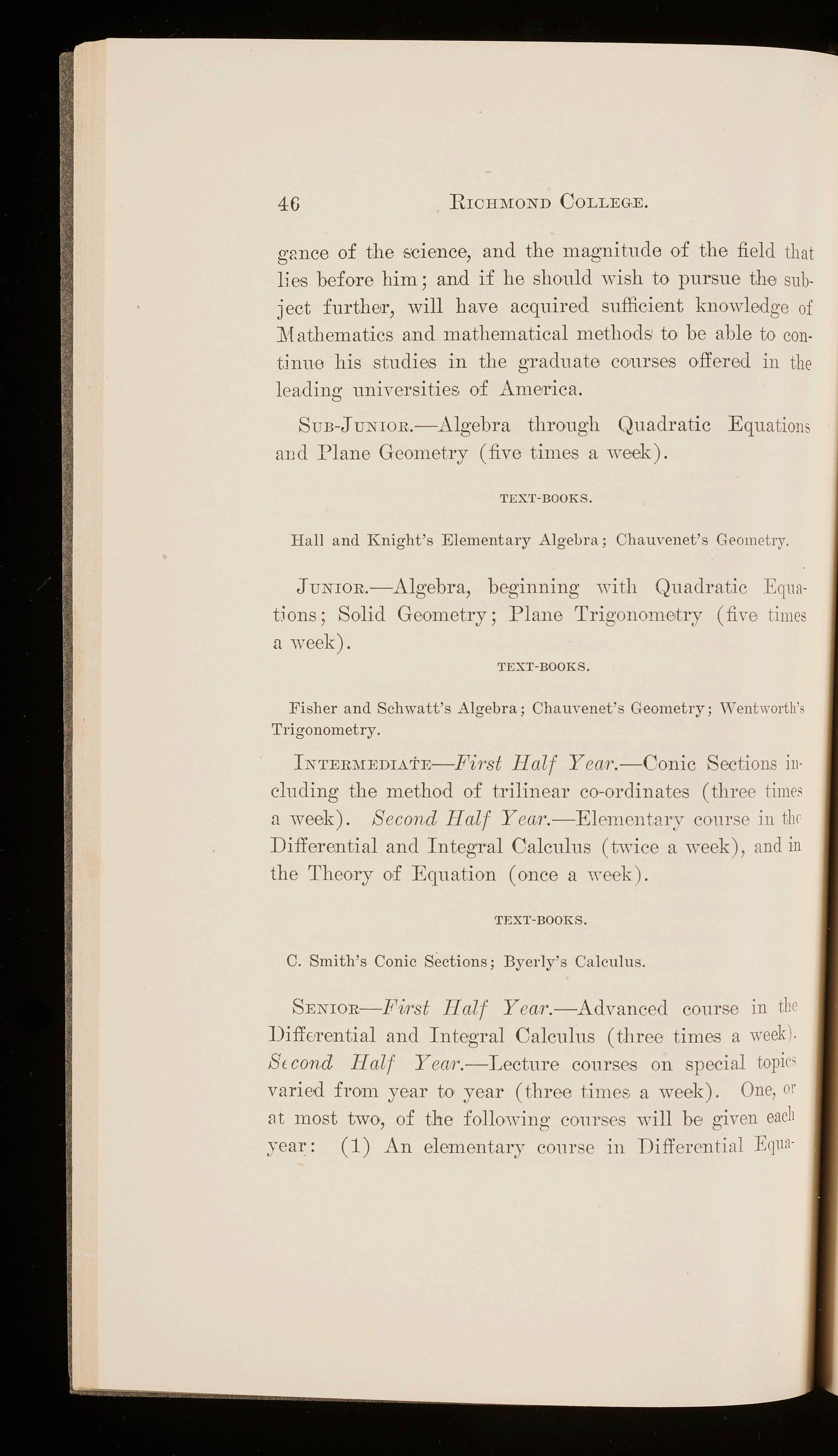
Rrc1nIOND CoLLEGE.
gfmce of the science, and the magnitude of the field that lies before him ; and if he should wish to pursue the subject further, will have acquired sufficient kno,Yledge of 11athematics and mathematical methods to be able to contiime his studies in the graduato courses offered in the leading universities of America.
SuB-Juxrnn.-.Algebra through Quadratic Equations a1id Plane Geometry (five times a week).
TEXT-BOOI,S.
Hall and Knight's Elementary Algebra; Chauvenct's Geometry.
JuNIOR.-.Algebra, beginning ,rith Quadratic Equations; Solid Geometry; Plane Trigonome ,try (fi.rn times a week).
TEXT-BOOKS.
Fisher and Sch watt's Algebra; Chaurnnet's Geometry; Wentwortli", Trigonometry.
INTERllfEDI.A.TE-Pirst llalf Year.-Conic Sections iu· eluding the method of trilinear co-ordinates ( thre e time, a week). Seco11dIIalf Year.-E]crnentary comse in thr DifferCJ1tial and In teg-ral Calculu ( t"-ice a »·eek), and in the Theory of Equation ( once a week).
'£EXT-BOOKS.
C. Smith's Conic Sections; Byerly's Calculus.
SENIOR-First Jialf Year.-Advanced comse in the Difft ,rential and Integral Calculus (three times a week) S ( co11 d II alf Year. - Lecture co1uses on special topic, varied from year to year (three times a "·eek). One, or at most two, of the foJlo,ring conrscs will be given each year: ( 1) An elementary com e in Differential Eqnn·
COURSES OF INSTRUCTION.
47 tions. (2) The theory of Infinite Series and Produch; 1 • (3) The theory of complex quantities with a brief introduction to the Theory of Functions. ( 4) The theory of Invari ants and Covariants, with applications to geometry. (5) Modern methods in geometry. As parallel work the students are rEquired to read a short history of mathe~ matics in order that they may know something of the development of the science and of the mathematicians who have principally contributed to this development.
The subject of Land Surveying i8 taught in an additional class, open to students who have finish ed the junior class. Much of the time devoted to this class is spent in the field, thus giving the e-tudent familiarity with the instruments used and considerable practice in doing the field work.
TEXT-BOOK

Gillespie's Land Surveying.
Professor Winston.
The School of Physics embraces the several subj eds uwally grou ped under this title, or under the practicallyequivalent name-----Natural Philosophy. These include the General Properties of Matter; Mechanics proper, or the cardinal doctrines 0£ Force, Equilibrium, Motion, and Energy, in their variou5 1 kinds, their rolations to the several states of matter, and their practical applications; th e phenomena and laws of Sound, Light, Heat, Magnetism, and Electricity, and the applications of these in our daily life.
The metho d of instruction is by t,ext-books and by lectures.,for the most part referring to the text, with daily
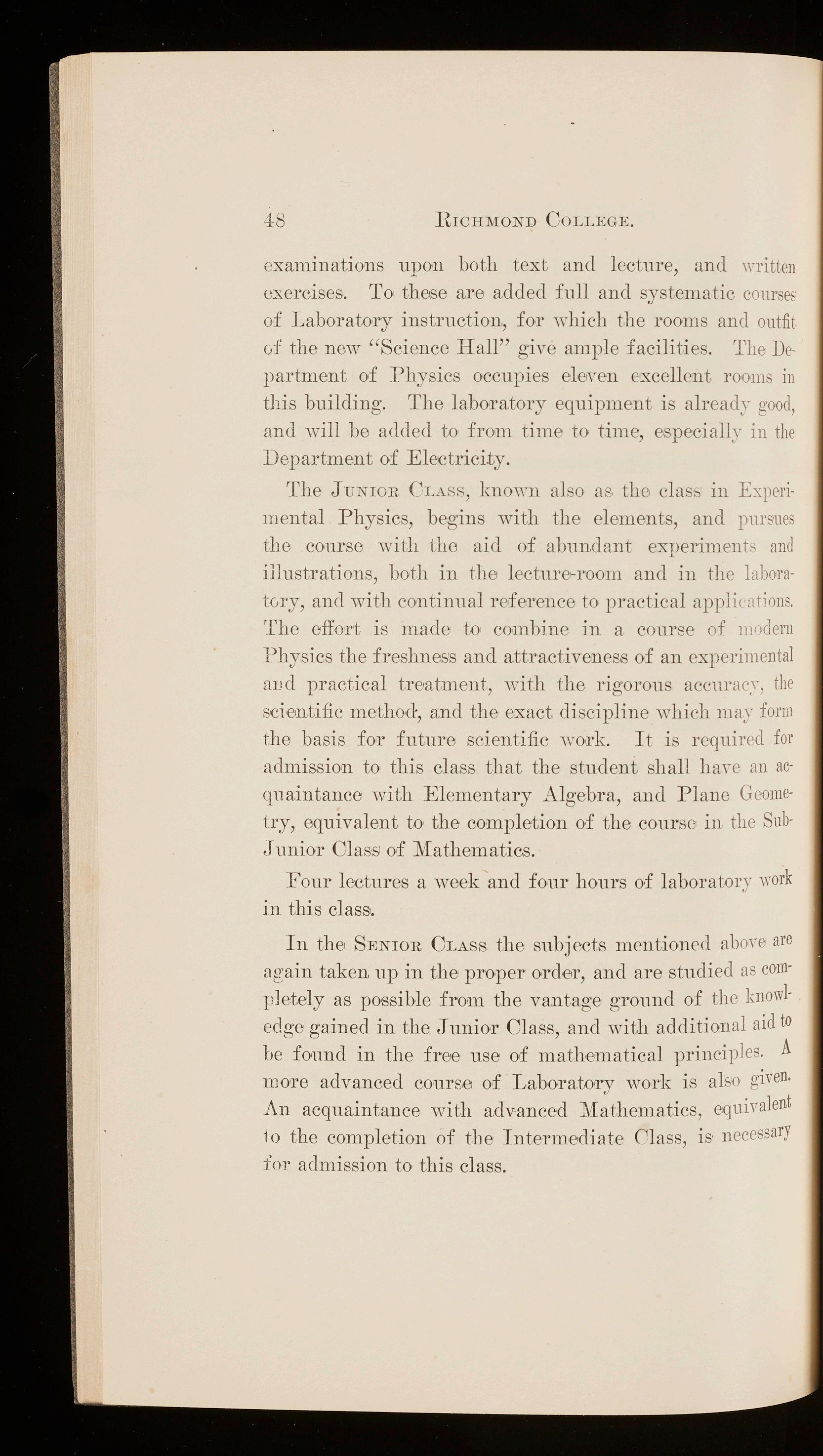
RrnnMOKD CoLLEG•E.
exa minations upon both text and lecture, and written exercises. To th0se are added full and systematic course, of Laboratory instrnction, for ·which the room s and outfit c,J the new "Science Hall" give ample facilities. The Department of Physics occupies eleven excellent rooms in this building. The laboratory equipment is alread y good, and will be added to from time to time, especiall y in the Department of Electricity.
The J UKIORC'LAss , kno,vn al so a s. tho clasti in Expcrirnental Physics, begins with the elements, and pursues the course with the aid of abundant experim ents and illustrations, both in the l ect ur e"room and in th e hborat0ry, and with contimial reference to practical appli cations The effort is made to combine in a course of rnoclern Physics the freshness and attractiveness of an experi mental aiJd practical treatment, with the rigorous accur acy, the scientific methocl, and the exact discipline which ma y form the basis for future scientific work. It is requ ired for admission to this class that the student shall ha m an acqnaintance with Elementary Algebra, and Plane Geometry, equivalent to the completion of the course , in the SnbJ unior Class of Mathematics.
Four lectures a week and four hours of laborat ory "·ork in this class,.
In th0 SENIOR CLASSthe subjects mentioned aboni are again taken up in the proper order, and are studied as com· pletely as possible from the vantage ground of the knowledge gained in the Junior Class, and with addition al aid to be found in the free use of mathematical princip les. A n10-re advanced coun:.e of Laborato ·ry work is also given An acquaintance with advanced Mathematics, equivalent io the completion of the Intermediate ('lass, is· n ecessary fo.r admission to this class.

C o uR s Es o :F IN
Three lectures a week and thre e or more hours of laboratorywork in this class.
TE XT- BOOKS.
Junior --Ga ge 's Principl es of Phy sics will be the principal textbook, wit h other s for reference Gage's Phy s ical Measurements was the labor a tory m a nu a l u sed la st ye a r.
Senior.- Ca rh a rt 's Univer s ity Phy sics, with r eference to Barker's Advanced Phys i cs, Dani ell 's Phy s ic s , a nd Wat s on's Physics The Laboratory B ook u sed l as t ye a r w as Ames and Bliss' Manual of Experiments in Physi cs
Heretofor e the cour se in Junior Physics has embraced a brief stu dy of Celestial Physic s, or Astronomy. This wasstud ied mainly as affording on the largest scale illustrations an d applications of physical principles. The last sixor seven weeks of the session w er e given to it.
The fu ll introduction of Labor atory work consequent uponthe occupancy of the n ew Scienc e building, and the constantenlarg em ent of th e cours es in Physics prop er, haverendere d this additio11 of Astronomy as a part of the • course in P hy sics no l on ger pr act icabl e.
It is design ed, howev er , to continu e th e teaching of Astronomy in th e Coll ege. It will r emain in connectiem with the De p artm ent of Physics, but will be made hereafte r an inde p end ent cla ss.
Under th i s n ew arrang em ent th e cla ss in Astronomy beginsat th e op011ing of th e second half session, in February, andcontinues t o th e end of th e session. Two lessons Ii.
\\'eek arc cive n with th e addi tion of some exercis es and ~, ' somelaborato r y work. Th e course is gen eral and elementary, and i s a dapt ed esp eci all y to students having some
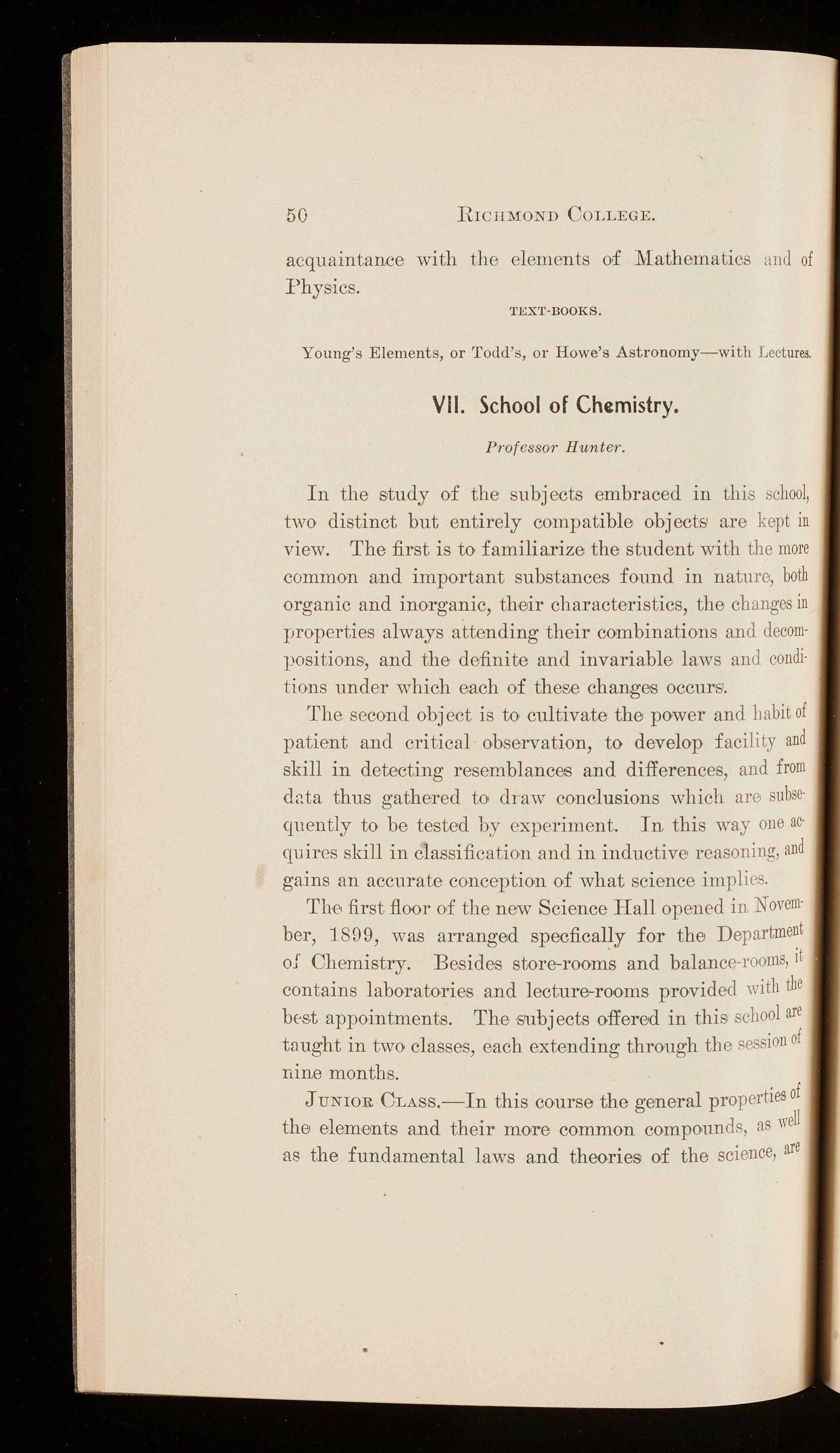
RICHMOND COLLEGE.
acquaintance with the el ements of Mathematics a11<lof I'hysics.
TEXT-BOOKS.
Young's Elements, or Todd's, or Howe's Astronomy-with Lectures.
Professor Hunter.
In the study of the subjects embraced m thi s school, two distinct but entirely compatible object& 1 ar e kept in view. The first is to familiarize the student with the more common and important substances found in natu re, both organic and inorganic, their characteristics, the changesin y;roperties always attending their combinations an d decompositions,, and the defin i te and invariable l aws and conditions under which each of these changes occurs.
The second object is to cultivate the power and habit of patient and critical observation, to develop fac ility and skill in detecting resemblances and differences , and from chta thus gathered to draw conclusions which are subsequently to be tested by experiment. J n this w ay one acquires skill in cl assification and in inductive rea soning,and gains an accurate conception of what science impl ies.
The, first floor of the new Science Hall opened i n November, 1899, ·was arranged specfically for the D epartment ol' Chemistry. Besides store-room~ and balanc e-rooms, it contains laboratories and lecture"rooms provide d with the bf.st appo intments. The subjects offered in this schoolare taught in two classes, each extending through th e sessionof nine months.
JUNIOR CLASS. - In this course the general pr opertiesof the elements and their more common compoun ds, as well as the fundamental laws and theories of the science, are
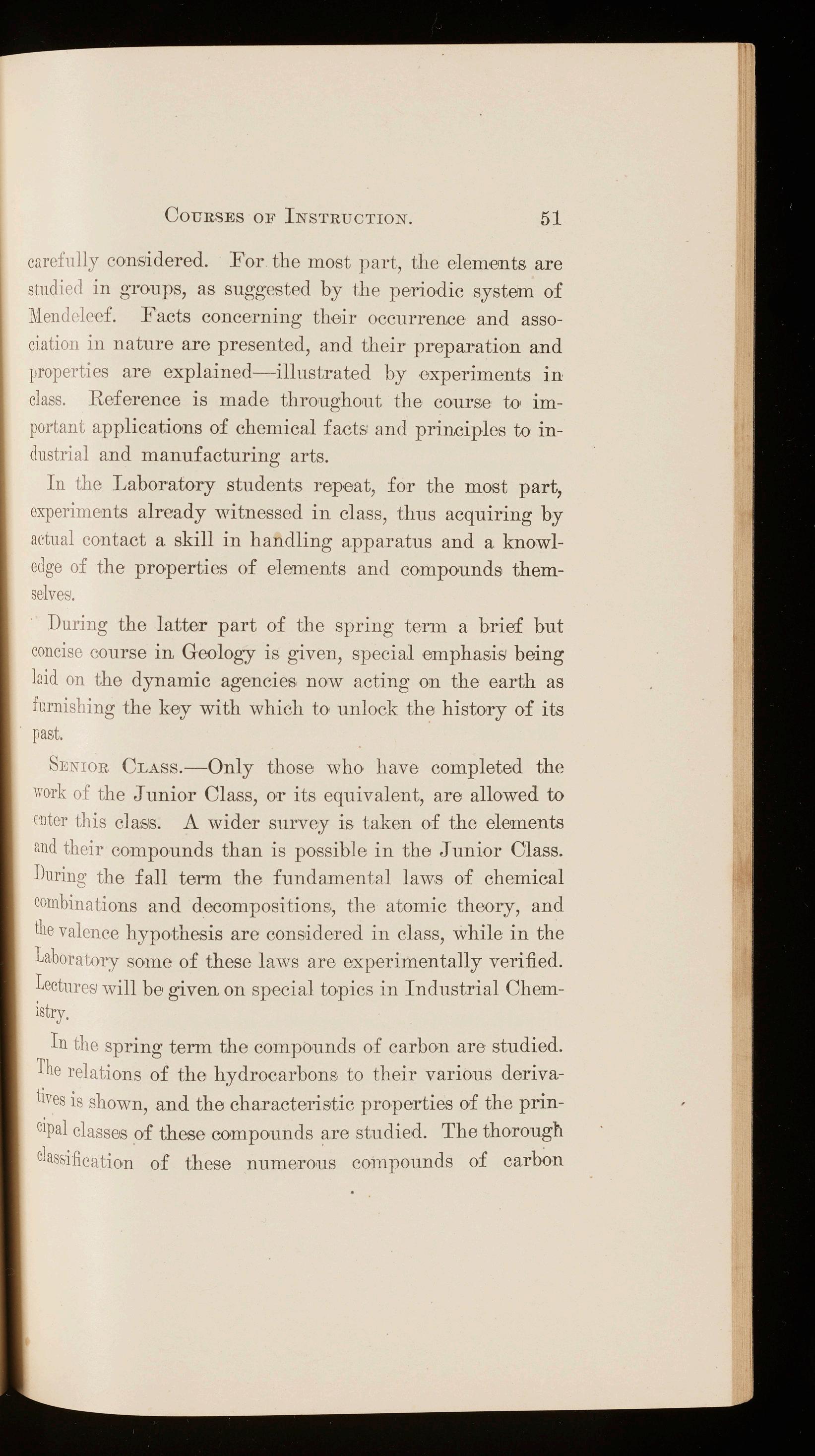
51 carcfoll_yconsidered. For the most part, tlie clements are studird in groups, as suggested by the periodic system of )l enddcc f. Facts concerning their occ11rrence and associatio11 i n nature arn presented, and their preparation and 1,ropcrtirs are explained-illustrat ed by experiments in class. R eference is made throughout the course to impo1iant applications of chemical facts and principles to industrial and manufacturing arts.
In the Laboratory students repeat, for the most part, experirnc,nts already witnessed in class, thus acquiring by aetual contact a skill in handling apparatus and a knowledge of the properties of elements and compounds themselve&.
During the latter part of the spring terrn a brief but concise course in Geology is given, special emphasis being !~id on t he dynamic agencies now acting on the earth as furnishing the key with which to unlock the history of its past.
S1rnr<m CLAss.-Only those who liave completed the work of the Junior Class, or its equivalent, are allowed to enterthi s class. A wider survey is taken of the elements and their compounds than is possible in the Junior Class. During the fall term the fundamental laws of chemical combinati ons and decompositione , 1he atomic theory, and thevalence hypothesis are considered in class, while in the Labor atory some of these laws are experimentally verified. Lectures will be given on special topics in Industrial Chemistry.
In the spring term the compo,unds of carbon are studied. The relation of the hydrocarbons to their various derivativesis shown, and the characteris ·tic properties of the principal classes of these compounds are stndied. The thorough. claSoification of these numerous compounds of carbon
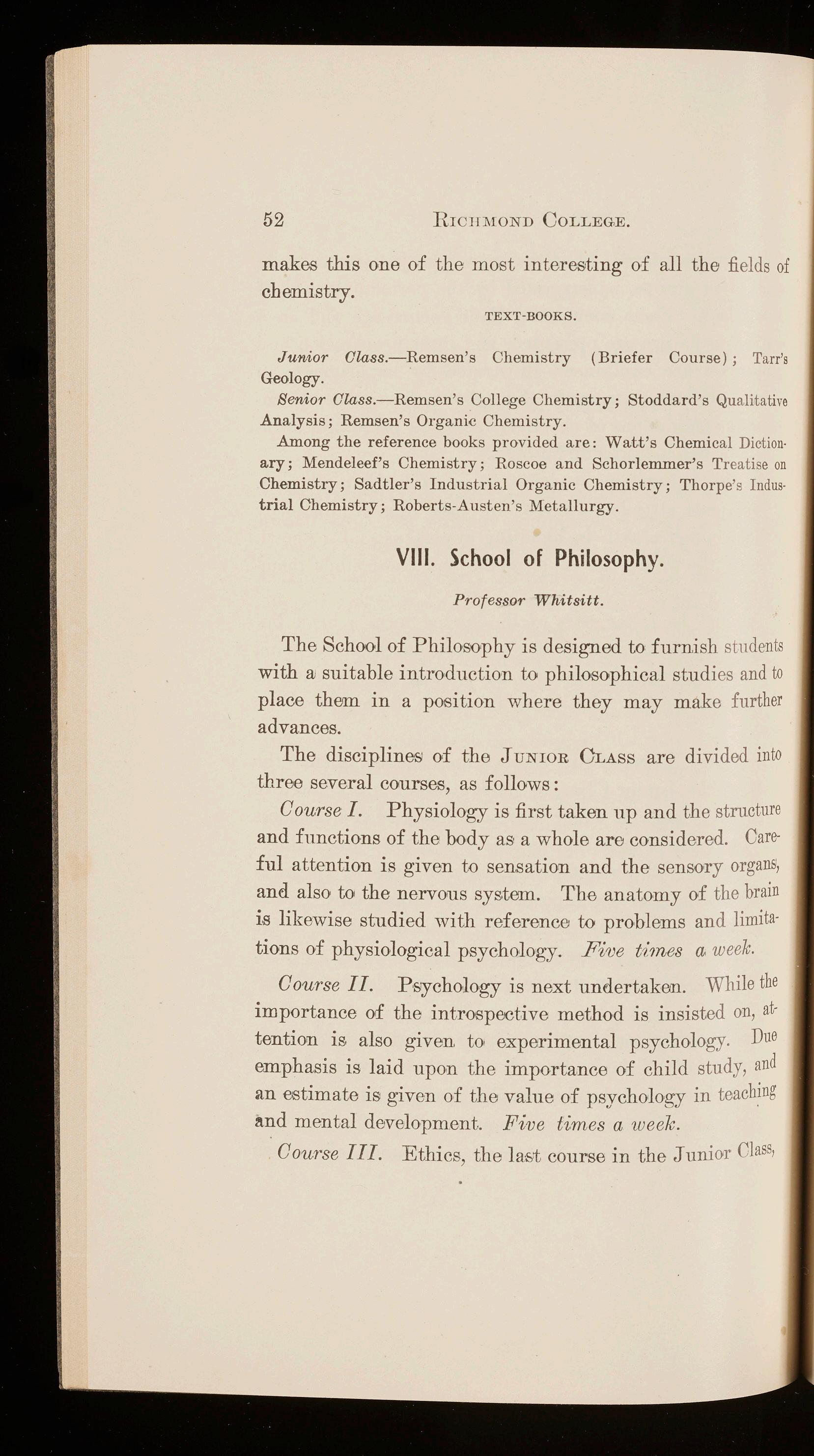
Rrc11 J\IOND CoLLEGE
makes this one of the most interesting o• f all the fields of chemistry.
TEXT-BOOKS.
Juwior Glass.-Remsen's Chemistry (Briefer Course); Tarr's Geology.
Senior Glass.-Remsen's College Chemistry; Stoddard's Qualitative .Analysis; Remsen's Organic Chemistry.
Among the reference books provided are: Watt's Chemical Dictionary; Mendeleef's Chemistry; Roscoe and Schorlemmer's Tr eat ise on Chemistry; Sadtler's Industrial Organic Chemistry; Thorpe 's Industrial Chemistry; Roberts-Austen's Metallurgy.
Professor Whitsitt.
The School of Philosophy is designed to furnish students with a, suitable introduction to philosophical studi es and to place them in a position where they may mak e further advances.
The disciplines of the JUNIOR OLAss are divid ed into three several courses, as follows:
Course I. Physiology i s first taken np and the structure and functions of the body as a whole are considered. Careful attention is given to sensation and the sensory organs, and also to the nervous system. The anatomy of th e brain is likewise studied with reference to problems an d limitations of physiological psychology Five thnes a, week.
Course II. Peychology is next undertaken. While the importance of the introspective method is insist ed on, attention is also given to experimental psychology. Due emphasis is laid upon the importance of child study, aucl an estimate is given of the value of psychology in teaching and mental development. Five times a week.
Co1irse III. Ethics, the la&t course in the Juni or Class,
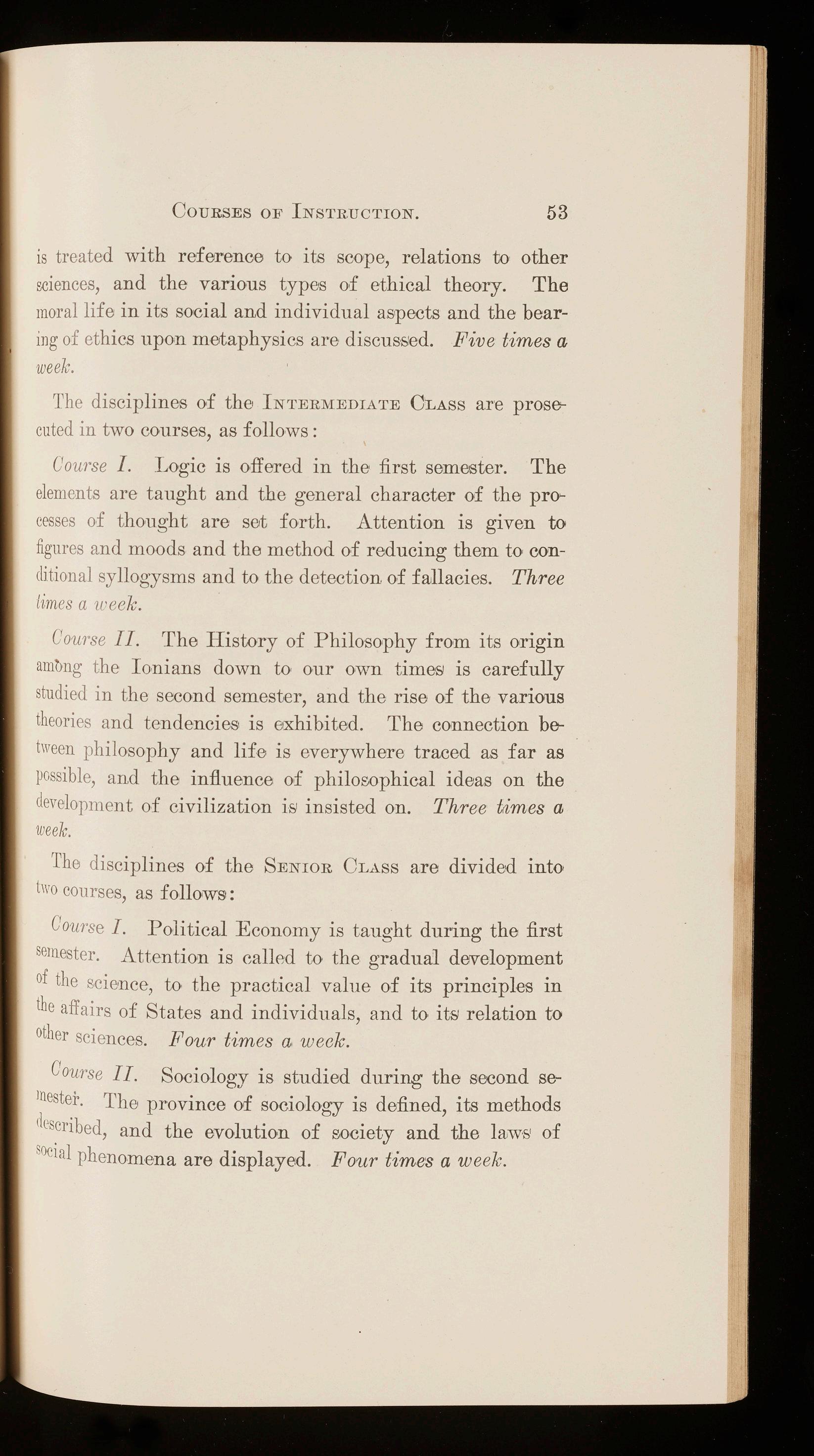
53 is treated with reference to its scope, relations to other sciences,and the various types of ethical theory. The morallife in its social and individual as,pects and the bearingof ethics upon metaphysics are discussed. Five times a week.
The disciplines of the, INTERMEDIATECLASSare prosecutedin two courses, as follows:
Uourse I. Logic is offered in the first semester. The elementsar e taught and the general character of the pro-cessesof thought are set forth. Attention is given to figuresand moods and the method of reducing them to conditionalsyllogysms and to the detection of fallacies. Three limesa week:.
CourseII. The History of Philosophy from its origin amtng the Ionians down to our own time:! is carefully studiedin the second semester, and the rise of the various theoriesand tendencies, is exhibited. The connection betweenphilos ophy and life is everywhere traced as far as possible,an d the influence of philowphical ideas on the developmentof civilization if! insisted on. Three times a week.
The disciplines of the SENIOR Cuss are divided into twocourses, as follows:
OourseI. Political Economy is taught during the first semester. Attention is called to the gradual development of the science, to• the practical value of its principles in theaffairs of States and individuals, and to it:! relation to othersciences Four times a week.
OourseII. Sociology is studied during the second seinestei·.The province of sociology is defined, its methods ilt-scribed,and the evolution of wciety and the laws of socialphenomena are displayed. Four times a week.

RrCJJMOND COLLEGE
TEXT·B00KS.
Junior Class.-lluxlcy"s Lessons in Elementary Physiology , American edition; James' P~ychology ( Briefer Course) ; Mackenzie's Manual of Ethics.
Interm ed-iate Olass.-Davis' Elements of Deductive Logic; \Veber·s History of Philo sophy.
Parallel Reading: Paulsen 's Introduction to Philosophy.
Senior Olass.-Bullock"s Introduction to the Study of Economics; Giddings' Principles of Sociology.
Parallel Reading -: Adam Smith's Wealth of Nations.
The Library provides a considerable co1lcction of works for the use of students in philosophy. It also supplies standard periodicals in the departments of philo sophy and oociology.
Professor JUitchell.
History is taught with the desire of presenting an insight into the past, so that the mind may be disciplined for the judgment of the present. History is regarded as one stream, with Rome as the great reservoir, into which the Lest of Greece and the Orient was emptied, and from which, by many outlets, Europe has been supplied. Facts are studied to discover principles and to explain social phenomena, and the method of irn,truction is from cause to effect. History is viewed mme especially from the Htandpoint of politics and economics, for hi story is properly the account of the evolution of social orga nization. This school is divided into three classes, as follows:
1. JumoR Or,Ass.-Ethnology will be outlined, foUow_ed by a discussion of snch topics as primitive man, the beginnings of civilization, and the origin of civil society. The civilization of the non-Aryan peoples will then be taken np.
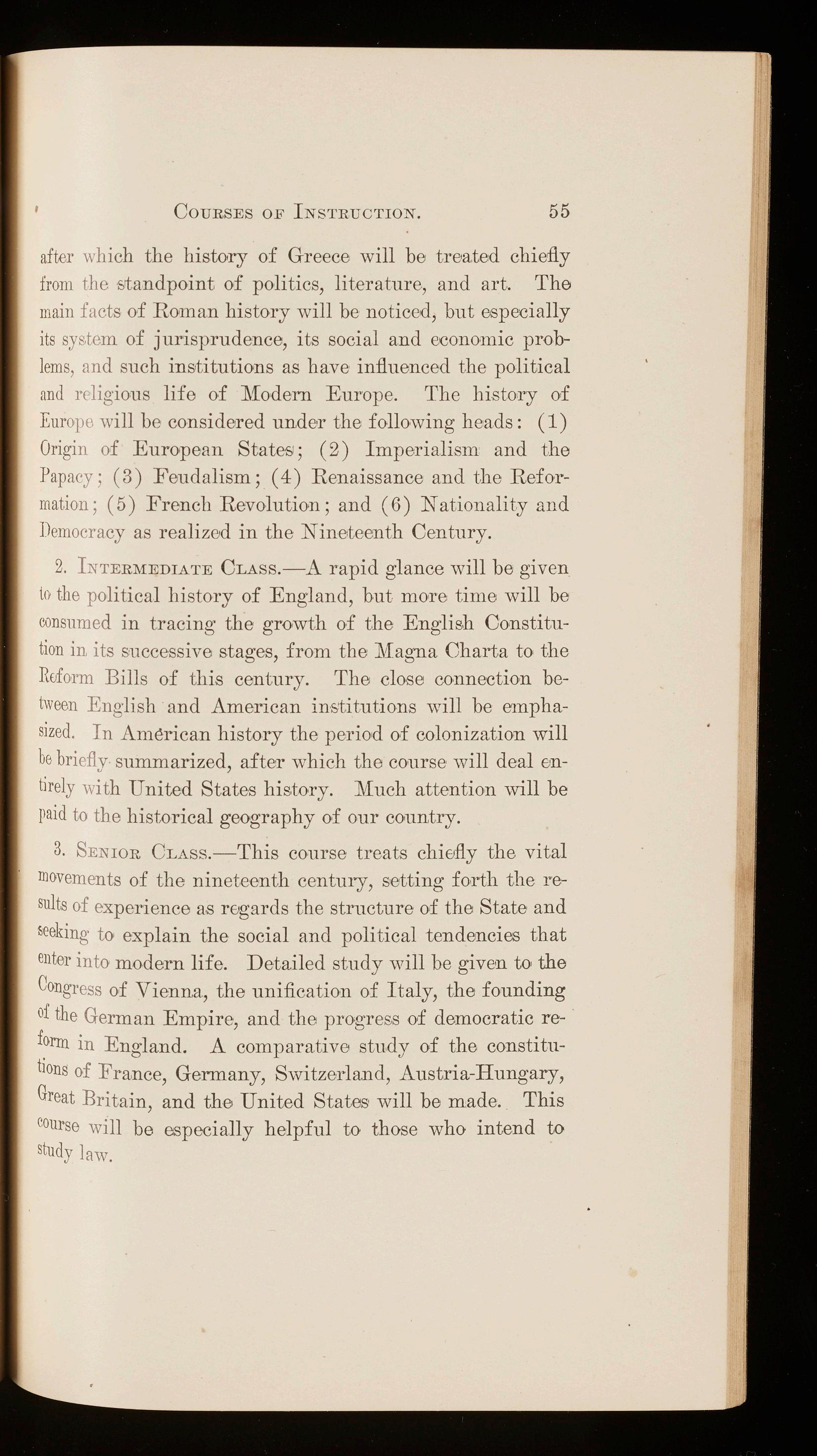
55
after which the history of Greece will be treated chiefly from the s tandpoint of politics, literature, and art. The mainfacts of Roman history will be noticed, but especially its system of jurisprudence, its social and economic problems, and such institutions as have influenced the political and religious life of Modern Europe. The history of Europe will be considered under the following heads: ( 1) Origin of European State8; ( 2) Imperialism and the Papacy; ( 3) Feudalism; ( 4) Renaissance and the Reformation; ( 5) French Revolution; and (6) Nationality and Democracy as realized in the Nineteenth Century.
2 INTERMEDIATEOLAss.-A rapid glance will be given ln the political history of England, but more time will be consumed in tracing the growth of the English Constitutionin its successive stages, from the Magna Charta to the Rf!form Bills of this century. The close connection between Eng lish and American im,titutions will be emphasized . In American history the period of colonization will b&briefly summarized, after ·which the course will deal mtirely with United States history. :Much attention will be paidto th e historical geography of our country.
3. SENIOR CLAss.-This course treats chi0:fly the vital movements of the nineteenth century, setting forth the resultsof experience as rngards the structure of the State and &eekin g t o explain the social and political tendencies that enterinto modern life. Detailed study will be given to, the Congress of Vienna, the unification of Italy, the founding ofthe German Empire, and the progress of democratic reformin England. A comparative study of the constitutionsof France, Germany, Switzerland, Austria-Hungary, GreatBr itain, and the United States will be made. This coursewill be especially helpful to those who intend to study law.
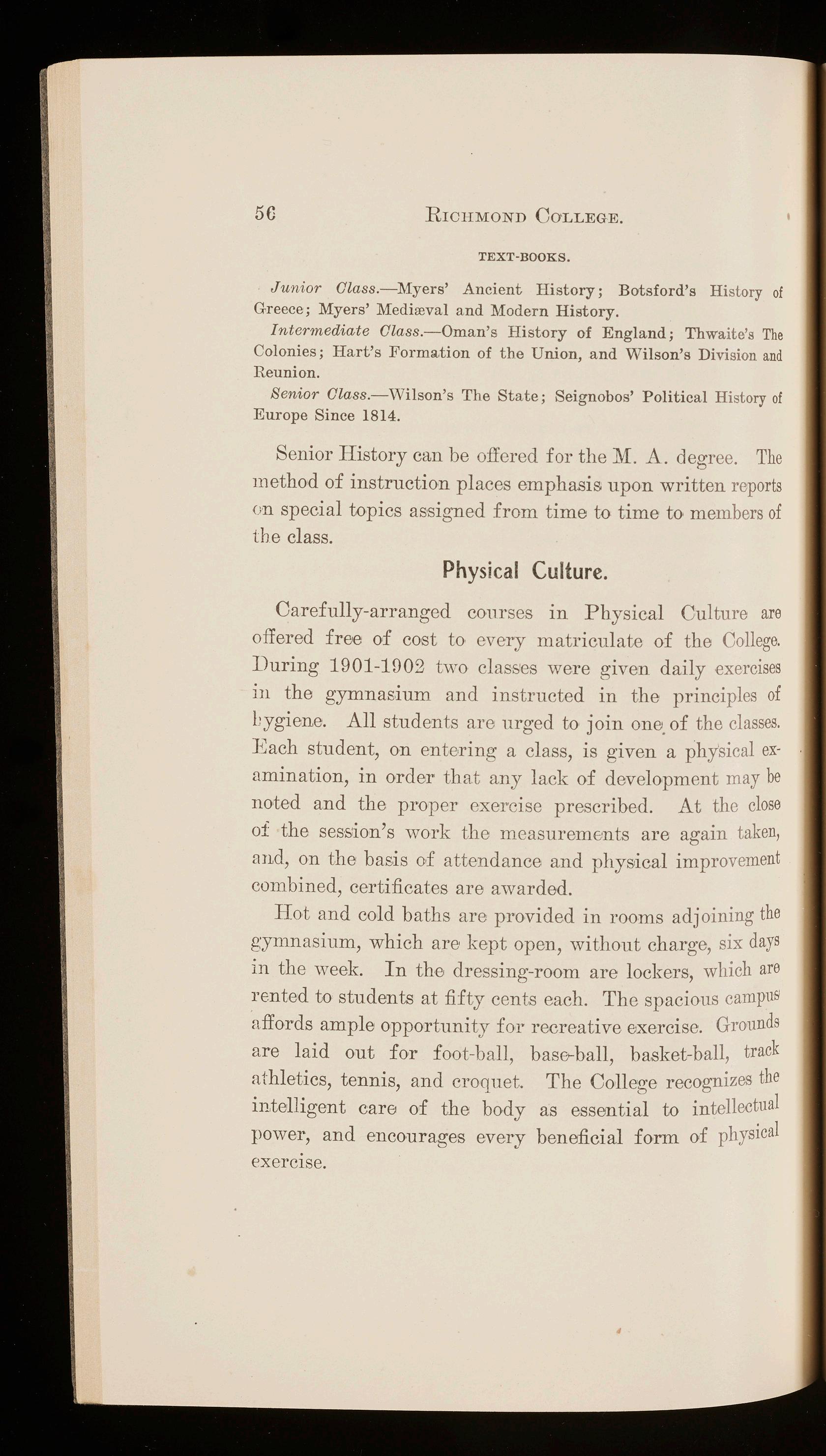
RICHMOND COLLEGE.
TEXT·B00KS.
Junior Olass.-Myers' Ancient History; Botsford's History of Greece; Myers' Medimval and Modern History
Intermediate Class.-Oman 's History of England; Thw aite's The Colonies; Hart's Form:i,tion of the Union, and Wilson's Divi sion and Reunion
Senior Class.-Wilson's The State; Seignobos' Political History of Europe Since 1814.
Senior History can be offered for the M. A. degree. The method of instruction places emphasis upon written reports on special topics assigned from time to time to me mbers of 1.heclass.
Carefully-arranged co11rses in Physical Culture are offered free of cost to every matriculate of the College. During 1901-1()02 two classes were given daily exercises in the gymnasium and in structe d in the prin ciples of bygiene. All students are urged to join one. of the classes. :Each student, on ente,ring a class, is given a ph ysical examination, in order that any lack of developmen t may be noted and the proper exercise prescribed. At the close of the session's work the measurements are again taken, :md, on the basis of attendance and physical impr ovement combined, certificates are awarded.
Hot and cold baths are provided in rooms adjoining the gymnasium, which are kept open, without charge, six days in the week. In the dressing-room are lockers, which are rented to students at fifty cents each. The spacious campufl affords ample opportunity for recreative exercise. Grounds are laid out for foot-ball, base-ball, basket-ball , track athletics, tennis, and croquet. The College recogn izes the intelligent care of the body as essential to in tellectual power, and enco-urages every beneficial form of physica l exercise.

For many year& series of popular lectures have boon deliveredin Richmond and el sewhere by professors in the College. In the spring of 1892 was given the first regular Extension course with syllabus, class-work, and guided reading. Whi l e the College has no organized department for carrying forward this important work, it will in the future continue to extend higher educationa l advantages tothoseunable to attend College clas ses,.
These Lectures are provided for by "The Thomas MuseumT,ecture Endowment" o.f $10,000, donated by his familyin memory of the la te President of the corporation, James Thomas, Jr. They are delivered annually by r,minentmen of our own and foreign countries on Science, Philosophy, Art, or Liternture, and by special provision are open to the public. The following distinguished scholarshave delight ed large audiences and greatly stimulatedlitera ry and scientific research: Charles A. Young, Ph. D., of Princeton; H. Newell i\lartin, Ph. D., of Johns Hopkins Un iversity; William T. Harris, LL.D., U. S. Commissioner of Education; President D. C. Gilman, of Johns Hopkins; Robert Y. Tyrrell,Un iversity of Dublin, freland; Horace H. Furness,Ph. D., LL.D., of Philadelphia; Professor C. T. Winchester,A. M., o-f Wesleyan University; Albion W. Small,Ph. D., of Chicago University; G. Stanley Hall, Ph.D., LL.D., President of Clark University; James HenryBreas ted, Ph. D., of Chicago University; Professor WoodrowWilson, Ph. D., LL.D., of Princeton Univer-
58
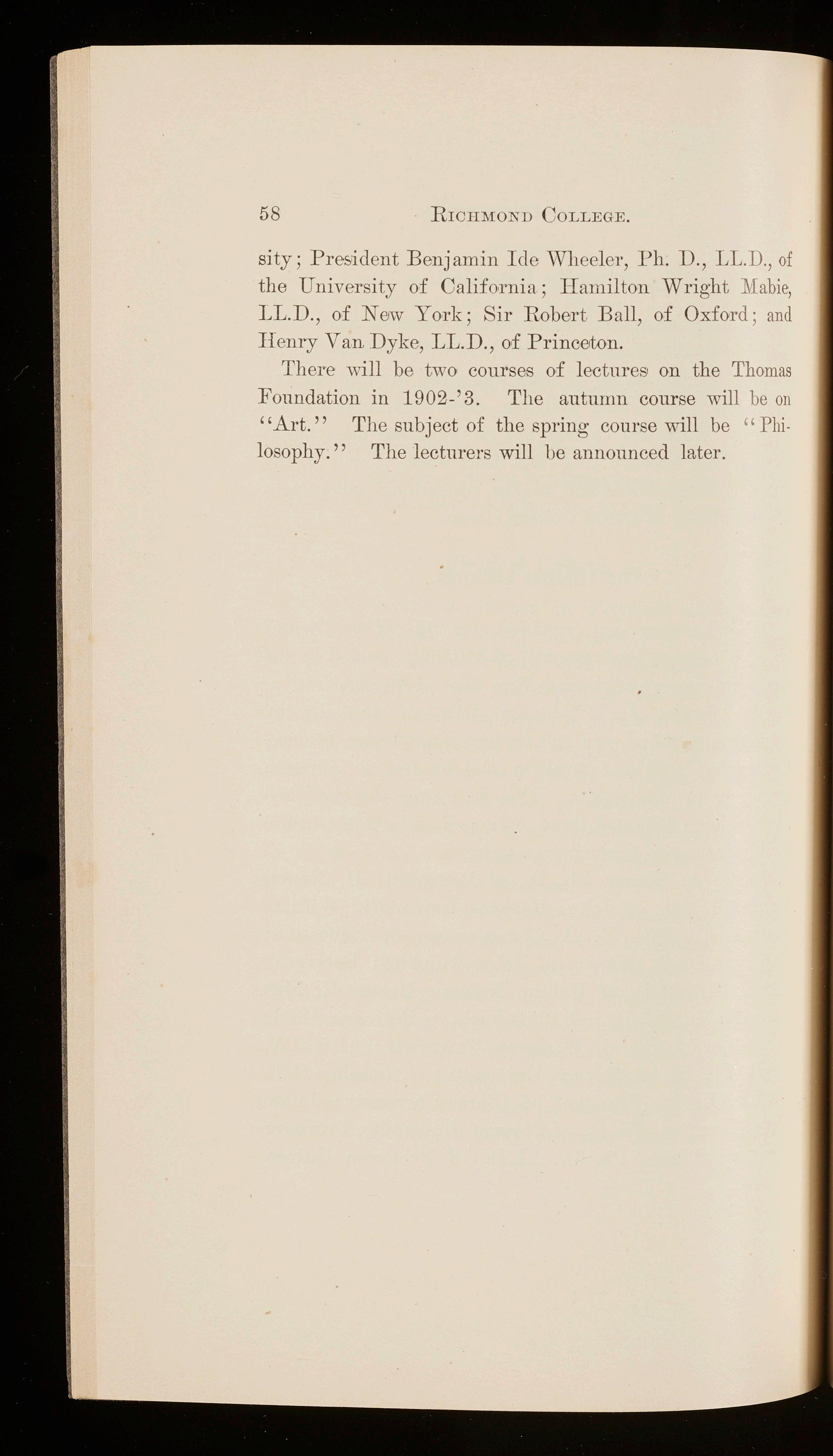
RICHMOND COLLEGE.
sity; President Benjamin Ide Wheeler, Ph D., LL.D., of the University of California; Hamilton Wright Mabie, LL.D., of New York; Sir Robert Ball, of Oxford ; and Henry Van Dyke, LL.D., of Princeton.
There will be two courses of lectures, on the Thomas Foundation in 1902-'3. The autumn course will be on "Art." The subject of the spring course will be " Philosophy." The lecturers will be announced later.

Professor Gre gory.
Professor Minor.
Professor Long.
This school, established in 1870, and continued with slightinte rruption till 1882, was in 1890 firmly re-established The location i8 eminently suited for combining practical with theoretical instruction, by reason of easy accessto t he numerous courts-Fe<leral, State, Municipal-h eld in th e city of Richmond, and the large and wellselectedlib raries-law and rniscellaneous--of the State andthe Coll ege.
The design of the school is to provide for the student a complete course in the general principles of the AngloAmerican Law and their applications. To this end are taughtthe following s'Ubjects, to~wit: The Coounon Law, Statute Law, Criminal Law, Commercial Law, Equity Jurisprudence, Constitutional Law, International Law. There are two classes in the school. The following scheduleis an exhibit of the subjects and by whom taught in each class, and the text-books used for the basis of instruction.
JUNIOR CLASS.
The Law of Persons, which includes the subject of agency; the Law of Personal Property, embracing contracts,sales, wills, adminie.tration, legacies, and partnership;the Law of Insurarnce.

RICHMOND COLLEGE.
TEXT-BOOKS.
Vol. I. Minor's Institutes; Burke's Property Rights of Married Women in Virginia; Vol. III. Minor's Institutes; Richard s on Insurance.-Professor Gregory.
Criminal Law and Procedure.
TEXT-BOOK.
Minor ' s Synopsis of the Law of Crimes and Punishm ents.- Professor Minor.
Corporations, Const-itutional, and Internationa l Law.
TEXT-BOOKS.
Vol. I. Minor's Institutes; Elliott on Private Corporation s; Cooley's Principles of Constitutional Law; Davis' Outline of Int ernat ional Law -Professor Long.
SENIOR CLASS.
The Law of Negotiable Instruments.
TEXT-BOOKS
Selover's Negotiable Instrument Law; Virginia Negoti abl e Instru· ment Act.-Professor Long.
The Law of Evidence.
TEXT-BOOK.
Greenleaf on Evidence. - Professor Minor.
The Law of Pleading and Practice in Courts of Law in civil cases; the Law of Real Property; Equity J urisprudence; Pleading and Practice in Equity.
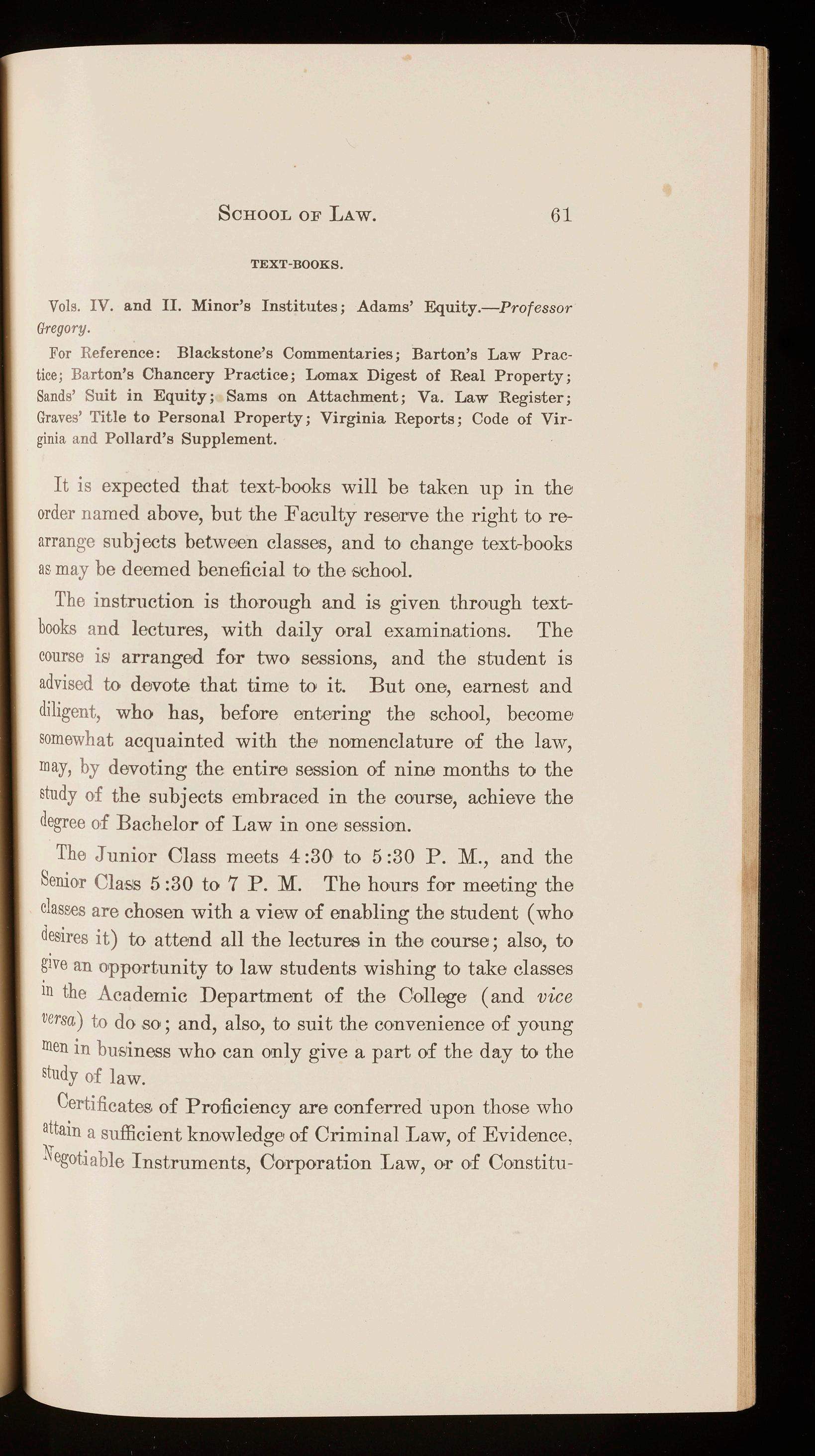
TEXT-BOOKS.
Vols. IV . and II. Minor's Institutes; .Adams' Equity.-Professor Gregory.
For Refe r ence: Blackstone's Commentaries; Barton's Law Practice; Barto n's Chancery Practice; Lomax Digest of Real Property; Sands' Suit in Equity; Sams on .Attachment; Va Law Register; Graves' Tit le to Personal Property; Virginia Reports; Code of Virginia and P ollard's Supplement.
It is expected that text-books will be taken up m the order name d above, but the Faculty res erve the right to rearrange subjects betwe en classes, and to change text-books as may be d eemed beneficial to the oohool.
The ins truction is thorough and is given through textbooks an d lectures, with daily oral examinations. The course i& arranged for two sessions, and the student is advised to devote that time to it. But one, earnest and diligent, who has, before entering the school, become somewhatacquaint ed with the nomenclature of the law, may,by devoting the entire session of nine months to the study of t he subjects embraced in the course, achieve the degree of Bachelor of Law in one session.
The Ju nior Class meets 4 :30 to 5 :30 P. M., and the SeniorClasis 5 :30 to 7 P. M. The hours for meeting the classesare chosen with a view of enabling the student ( who desires it) to attend all the lectures in the course; also, to give an opp ortunity to law students wishing to take classes in the Aca demic Department of the College ( and vice versa)to do so; and, also, to suit the convenience of young men in busfoess who can only give a part of the day to the study of la w.
Certificat es of Proficiency are con£erred upon those who attain a sufficient knowledge of Criminal Law, of Evidence, NegotiableInstruments, Corporation Law, or of Constitu-

RrcnMOND CoLLEGE.
tional and Internationa l Law ( the two l ast being required for one certificate) to entitle them thereto; and, when conferred, dispense with further study of those subjects to take the degree of Bachelor of Law The lectur es upon all other subjects than those for which Certificat es of P roficiency have been confened mu&t be attended, an d the examinations ( oral and written) thereon stood during the s~ssion the degree of B. L. is applied for.
To acquaint the student with the details of pr actice in the drawing of deeds, will s, and other instrum ents; the institution and maturing of suits at law and in equity; the preparation of pleadings; and the conduct of causes in court, a :Moot Court is organized about the middl e of the ficssion, in which satisfactory work is expected to be done to obtain the degree of Bachelor of Law.
The extent and scope of the work in the Moot Court will appear from the following Rules and Regulati ons under which the court is organized:
1. This court shall be called "T. C. Willi ams' Moo t Court," of Richmond College.
2. It shall have jurisdiction of all cases cognizable in the courts of record in Virginia.
3. The members of the Law Faculty shall be j udgP11 of the court, any one of whom may hold a county, corporation, o,r circuit court; a majority of them, sessions of the supreme court of appeals . No judge shall sit upon a case in which he sat as judge in the court below. When on the bench, the T. C. Williams professor of l aw shall preside; in his absence, the senior professor of law , in length of s,ervice, pre&ent and sitting.
4. The officers of the court shall be a clerk , a deputy
OF LAw.

63
clerk , a sheriff, a deputy sheriff, three commissioners of accounts----0ne for each court of probate represented-and five commissioners in chancery for the corporation and circuit cour ts; all to be elected by a majority vote of the membersof the comt present and voting.
5. T he r egu lar sessions of the court shall be held on alternate Fridays at 5 P. M. Special, with like jurisdiction as regular, sessions may be called at any time by one of the judges of the court, at his discretion.
6. Pr ocess shall nm in the name of the Law School of Richmond College, and be attested by the clerk of the court. Service may be upon defendant's attorney, but return shall state it was made upon the defendant himself.
7. Eve ry Thursday, from 4 P. M. to 5 P. M., shall be rule-day . All pleadings must b e filed in duplicate, the original to remain in the files of the court, the duplicate to he handed to the attorney of adverse party, on his request.
S. Ju dgments, except those in the clerk's office, to be put in form, orders and decrees drawn by counsel, and, whendirected to be entered, filed with the clerk.
9. The proceedings of this court, except so far as modifiedby its rules, will conform to those of the several courts it may represent, and to, the s,tatutes of Virginia in relation thereto.
10. In counting time for this court, in respect to service of notice and confirmation of accounts, one day shall be considereda week , and a week a month.
11. The proceedings of every court shall be -entered in a bookand read in open court by the clerk. After being corrected, where it is necessary, the record shall be signed bythe pre siding judge.
12. The roll of members s.Jiall he called by the clerk

RrcrLMOND COLLEGE.
immediately after the opening of each -session of th e court ; the names of absentees noted, and a fine of 25 cent s entered by the clerk against each absentee.
13. For good cause the presiding judge ma y remit a fine; if neither paid nor rEJmitted in two weeks, it may be recovered, by motion, in this court on two day s' noticethe proceedings to be in the name of the Law Schoo l of Richmond College. Moneys collected from fin es to be applied to expenses of this court.
14. Without leave of court, no motion for ju dgment shall be made under Section 3211 of Code of 1887, as amended by chapte,r 110 of Act&of 1895-'96; nor sh all any suit be dismissed without like leave.
15. Each session of the court shall be open ed by the sheriff with the following proclama ,tion:
"O'Y ez ! O'Y ez ! O'Y ez !
"Silence is commanded, on pain of fine, while the 'T. C. Williams' Moot Court' is in session. All person s having motions to make, pleas to enter, &1nitsto prosecut e, or other business before this court, will come forward and they shall be heard.
"May all persons present, during the sess.ion of the court, depo,rt themselves in a decorous and gentlemanly manner."
The students of the Law School are authoriz ed to select one of their nurn ber as "Law Class Orator " to deliver an ' oration at the Commencement of the Oollege. T heir selection is subject to the approval of the President of the College.
SCHOOL OF LAw. 65
Fees in School of Law .
1\Iatricul a tion .. ....

$2 0 00
Tuition in Junior Class ... 40 00
Tuition in S enior Class .
. 60 00
Tuition in both cl ass es, when taken tog eth e r .. 7;, 00
Refundab le contingent . .
. 2 50
The mat riculation fee and half of th e tuition fee are paynble at ent ranc e The second half of tuition fee is payab le in F ebrua r y at b eginning of spr ing tE:rm . No honors are announced until all fe es are paid in full
:Most st u dent s ent er for the Junior Class . Their fees for the ent ir e sessi on, th enlfore, amoun t to $62 . 50, of which $2.50is refu n dab l e Jul y ht. Th e matri culation fee admits a st ud en t to all Coll ege privil eges, such as use of libiary, gym n as ium , bath, etc If l aw stud ent s d ESire to resideon t h e Coll ege ground s, th ey ma y en g age rooms and tableboard on equal t erm s with acad emic stud ents . Rates arefully state d fnrthm· on in this 1 catalogu e under the head of"Expcmses."
The cost of all t ext-books ne ed ed for the entire Law cour&eis abou t $~ 5.
For excell ent work in th e Law S chool prizes were awarded in June, 1!)02, as fo ll ows :
SeniorClass - F ir st Pri ze-R. E. Cabell, R ichmond. S econd Prize-L. B. Cox, Prince s s Anne county. Third Prize-C. B. Garnett, Ma thew s county . JimiorOZass-Pri ze-I sa dore Sch a piro , Richmond.

0. H. Ryland, D. D., Librarian.
The Library Department 0£ the College d eser ves special mention. ThE,, hall is exceptionally attractiv e, both in appearance and comfort. The equipm ent is 0£ a high order, combining utility and beauty. Painting s and sculpture throw the charm 0£ art O•ver the whole. While the literary treasures 0£ the College are provided with so imposing a home, they are not withdrawn from the student. No part 0£ the College is more freely open to the student body. · No fee is charged. Appreciation 0£ the advantages offered and propriety 0£ conduct are the only requ irements for the free use, during the entire day, 0£ the ha ll and its bounties. The great aim o.£ the management i s to afford agreeable educational pastime for students at lei sure, and to promote by the best methods and ample5t resources scientific rese•arch and exhaustive critical study for thos17 who need to pursue lines o.£investigation. Enc yclopedias, lexicons, and a full line 0£ other reference books and student helps are at hand in open cases, while readi ng tables, supplied with the be5t current literature, Amer ican ancl foreign, are accessible at all hours.
The Catalogue shows a steady gain in the best authors, selected with special reference to class work and a generous culture. The number 0£ volumes increased durin g the past sessfon from 13,866 to 14,120. The books ma y not only be freely consulted in the hall, but are loaned to those who de.sire long er time for research. During the past session 1,533 volumes were borrowed, covering a wid e range of

67 general literature-poetry, fiction, history, biography, Ecience,philosophy, and religion.
The largest gift of books during the past year came from ;1Ir.II. A. J\foCurdy, of Richmond, and consisted of seventy volumes . Library facilities will be greatly enlarged c!uring 1002-'3 by the addition of new cases and the completion of a new cata l ogue.
A special feature in the hall is the alcove devoted to The Heaton. Law Library, founded by the late Mrs. Hari-iet ~L Purcell, at a cost of $3,000, in honor of h er deceased brother, Hon. Henry Heaton, of Loudoun county. On th is foundation of the mo st approved and valuable \l'Orkson law, the College is building by yearly accessions of valuable Reports from the General and State Governments, an d all necessary Current Magazines. The students iu the Law Department are given acces,s to this Law Library, and uso it very freely.
A special Reading-Room for the Young Men's Christian Association has been fitted up. Here is the Missionary Library-the religious periodicals and appliances for the thorough stndy of the Sunday-school lesson. On Sunday afternoon this special reading-room may be the gatheringplace of all students who can be induced to read, for pleasure or profit, the current religions literature of the country .
Bible st ucl:v finds many accessories in the Library. A long lino of the best commentaries on the Holy Scriptures are within r e,ach, and the critical and experimental study of God's ,Vorel i1:1constantly encomaged. .
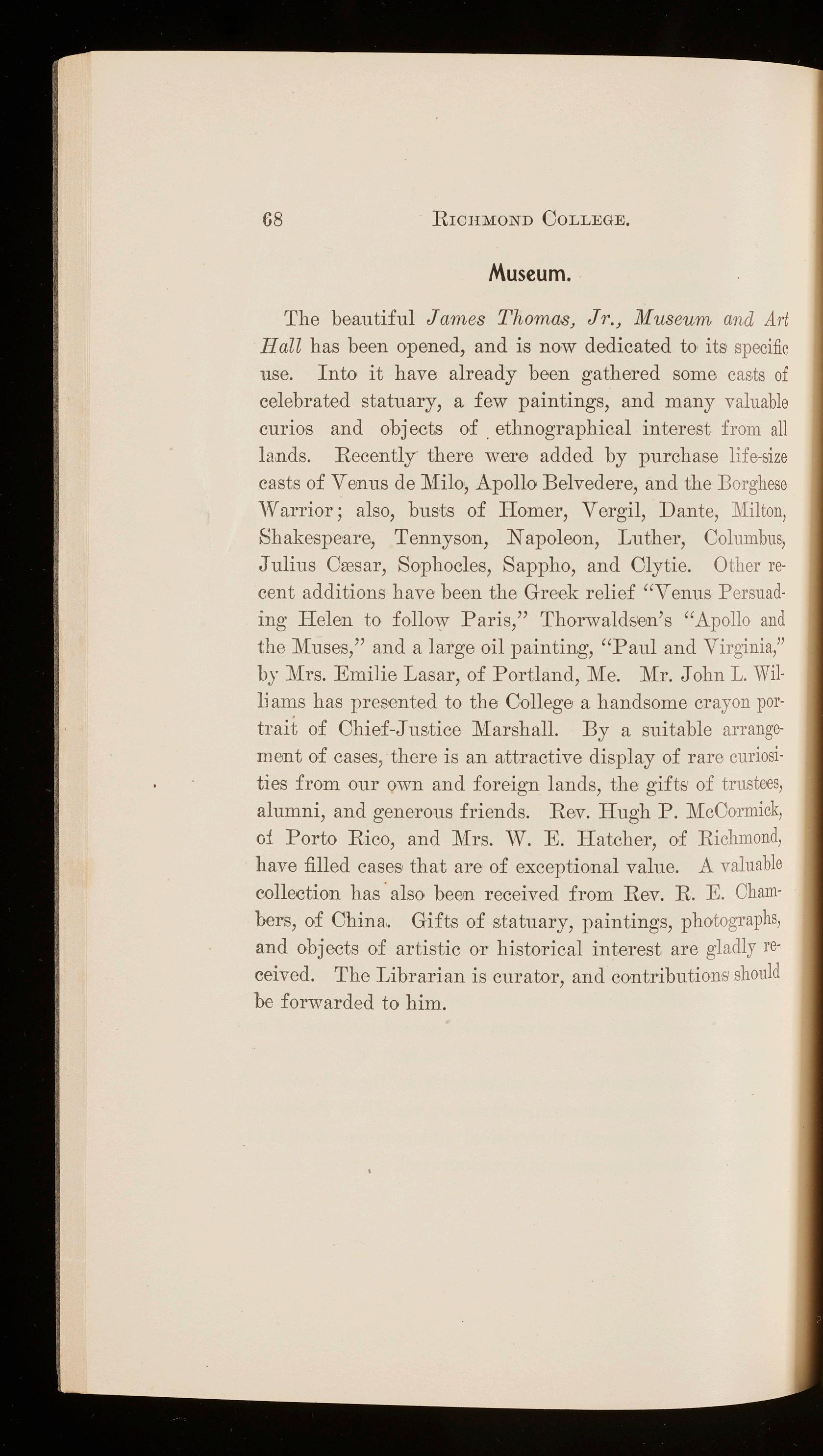
The beautiful James Thomas, Jr., Museum and Ar t Hall has been opened, and is now dedicated to its· spooific use. Into it have already been gathered some casts of celebrated statuary, a few paintings, and many valuable curios and objects of ethnographical interest from all lands. Recently there were added by purchase lifo-5ize casts of V Emusde Milo, Apollo Belvedere, and the Borghese W an:ior; also, bus ts of Homer, Vergil, Dante, Milton, f:ihakespeare, Tennyson, Napoleon, Luther, Cohunbus, Julius Cmsar, Sophocles, Sappho, and Olytie. Other recent additions hav e been the Greek relief "Venu s Persuading Helen to follow Paris," Thorwaldsen's "A pollo and th e Muses," and a large oil painting, "Paul and Vi rginia," by Mrs. Emilie Lasar, of Portland, Me. Mr. John L. Williams has presented to the College a handsome cr ayon portrait of Chief-Justice Marshall. By a suitabl e arrangement of cases, there is an attractive display of rar e curiosities from our own and foreign lands, the gif1:6 · of trustees , alumni, and generous friends. Rev. Hugh P. M cCormick, oi Porto Rico, and Mrs. W. E. Hatcher, of R ichmond , have filled cases that are of exceptional value. A valuable collection has ·also been received from Rev. R. E. Cham· bers, of China. Gifts of statuary, paintings, ph otographs, and objects of artistic or historical interest are gladly re· ceived. The Librarian is curator, and contributi ons should be forwarded to him.
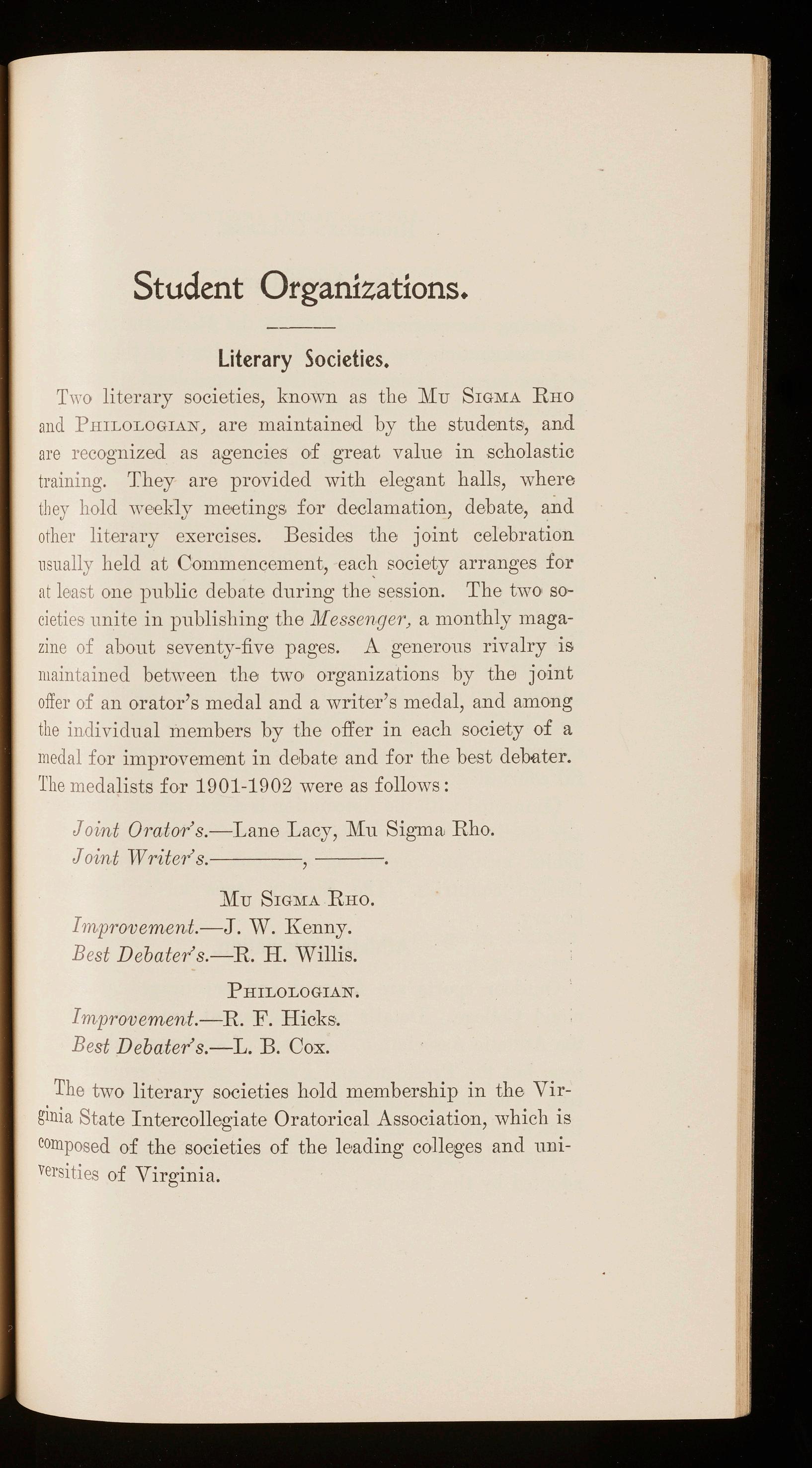
Two literary societies, known as the Mu SIGMARHo and P mLoLOGIAN,are maintaine,d by the students, and are recognized as agencies of great value in scholastic training. They are provided with elegant halls, where they hold ,ye,ek1y meetings for declamation, debate, and other literary exercises. Besides the joint celebration nsually held at Commencement, eacl: society arranges for at least one public debate during the session. The two so~ cieties u nite in publishing the Messenger, a monthly magazine of about seventy-five pages. A generous rivalry is maintained bet"·een the two organizations by the joint offer of an orator's medal and a writer's medal, and among the individual members by the offer in each society of a medal for improvement in debate and for the best debater. The medalists for 1901-1902 were as follows:
Joint Orator's.-Lane Lacy, Mu Sigma, Rho.
Joint Writer's.----
Mu SIGMAR:Ho.
I11iprovement .-J . W. Kenny.
Best Debater's.-R. H . Willis.
PHILOLOGIAN.
Im provement.-R. F . Hicks.
Best Debater's.-L. B. Cox.
The t wo literary societies hold membership in the Virginia St ate Interco ll egiate Oratorical Association, which is composed of the societies of the leading colleges and universities of Virginia.
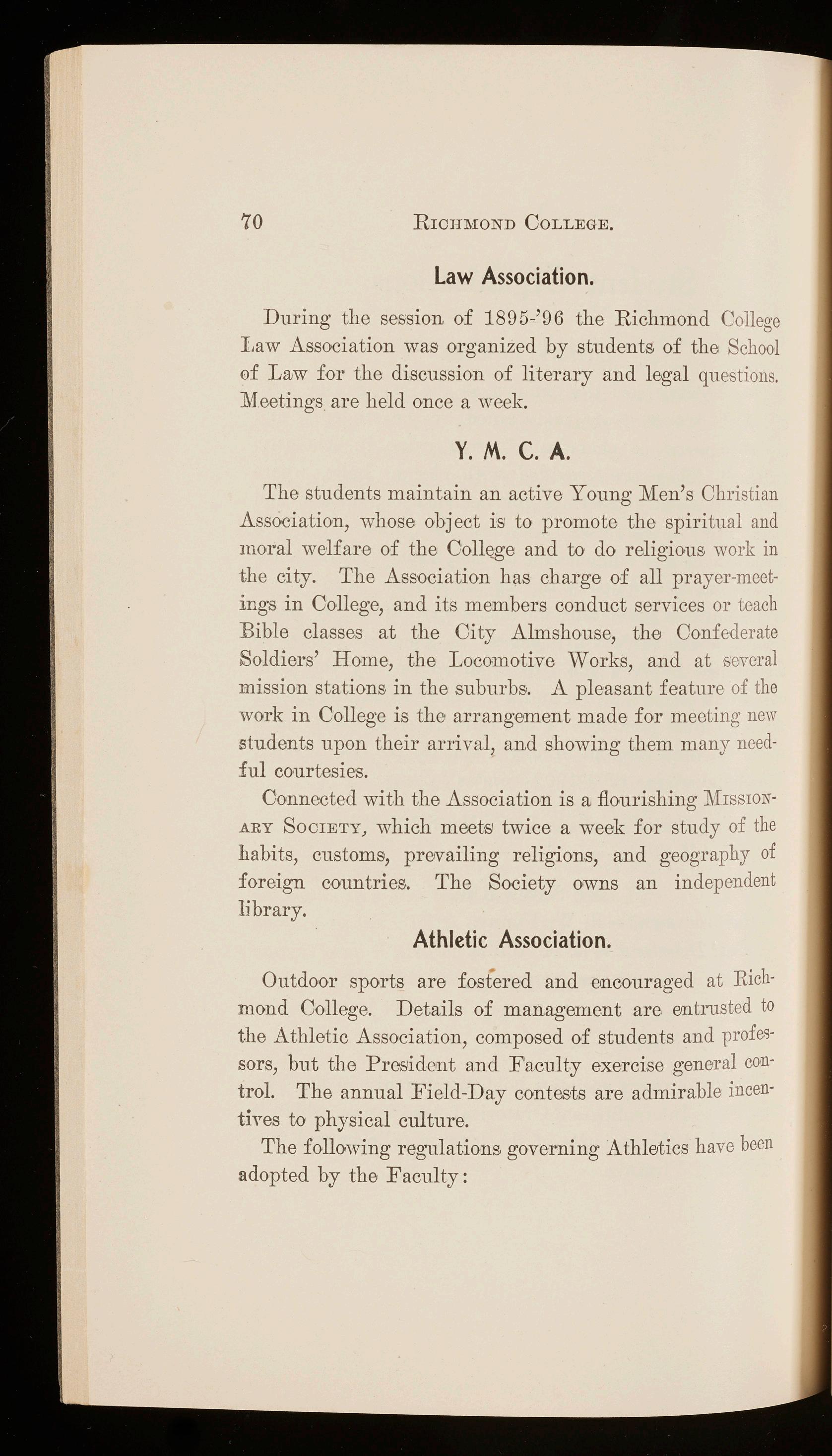
RICHMOND COLLEGE.
During the session of 1895-'96 the Richmond College Law Association was organized by students of the Schoo l of Law for the discussion of literary and legal qu estions :Meetings are held once a week.
The students maintain an active Young Men's Christ ian Association, whose object is to promote the spiri t u al and moral welfare of the Coll~e and to do religious work in the city. The Association has charge of all pra yer -meetings in College, and its members conduct service s or teach Bible classes at the City Almshouse, the Conf ederate Soldiers' Home, the Locomotive Works, and at several mission stations in the suburbs. A pleasant featur e of the work in College is the arrangement made for me eti ng new students upon their arrival, and showing them man y need:ful courtesies.
Connected with the Association is a flourishing MrssroNARYSocrnTY, which meets twice a week for stud y of the habits, customs, prevailing religions, and geography of foreign countries. The Society owns an ind ependent library.
Outdoor sports are fostered and encouraged at Richmond College. Details of management are entru sted to the Athletic Association, composed of students and profe~sors, but the President and Faculty exercise general control. The annual Field -Day contests are admirabl e incentives to physical culture.
The following regulations governing Athletics have been adopted by the Faculty:
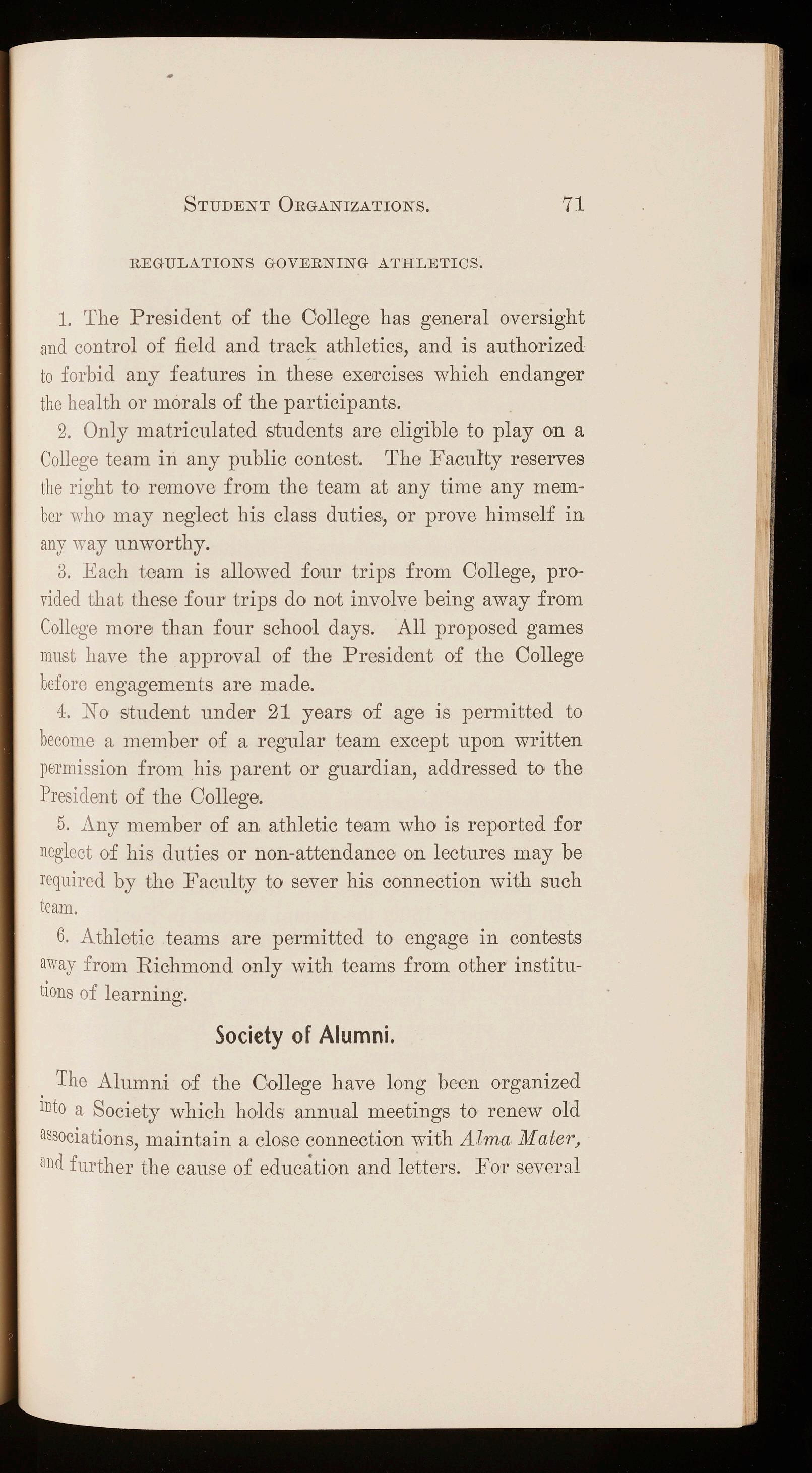
REGULATIONS GOVERNI N G ATHLETICS.
1. T he President of the College has general oversight and control of field and track athletics, and is authorized to forbid an y f eatures in these ex ercises which endanger thehealth or morals of the participant s
2. Only matriculated students are eligible to play on a Collegete am in any public contest. Th e Faculty reserves the right to r emove from the team at any time any member who may neglect his class duties., or prove himself in anyway unworthy.
3. Eac h te am is allowed four trips from College, providedthat t h ese four trips do not involve being away from Collegemore than four school da y s. All proposed games must have t he approval of the Pr esident of the College beforeeng agemen t s are made.
4. X o st udent under 21 years of age is p ermitted to becomea m emb er of a regular team except upon written pumissi on from hi s parent or guardian, addressed to the President of the College.
5. Any m ember of an athletic team who is reported for neglectof hi s duti es or non-attendanc e on lectures may be required by t he Faculty to sever his conn ection with such learn.
6. Ath l et i c teams are permitted to engage in conte6ts awayfro m Richmond only with t eams from other institutions of l earning.
The Alumni of the College have long been organized into a Soci ety which hold& 1 annual meetings to renew old associatio n s, maintain a close connection with Alma Mater, rindfurthe r t he cau se of educ;tion and lette-rs. For sever:il
72

RIClHIOKD COLLEGE.
years the custom has been to have an Wednesday of Commencement week. Society are: annual banqu et on The officers of the J. TAYLORELLYSON,Esq., Richmond, Va ........ Pr esident.
R.Ev. D. K. WALTHALL,Ph.D., Chestnut Hill, Va., First Vic e-Pr esident. R.Ev. JAMES H. FRANKLIN, Cripple Creek, Col., Second Vice-Pr esident. REV. A. J. RAMSEY, Berkley, Va ..... Thi1·d Vice-Pr esident. PROF. W. A. HARRIS, Pb. D., Richmond, Va .............. S ecretary MR. C. M. GRAVES,Richmond, Va ............... '.freasurer.
Degree men are members of the Society without election, and all former students are eligible, for election. The initiation fee of $3 has been abolished, and an annu al fee of $1 substituted therefor.
LOC.A.L CHAPTERS.
In :M:ay,1898, there was organized in Louisville a Chapter of the General Society of Alumni, which is known as the "Kentucky Association of Richmond College Alumn i." The Kentucky Association holds annual meetings in :May. The present officers are: Dr. S. E. Woody, Louisvill e, president; Professor 'N. 0. Carver, Louisville, secret ary and treasurer.
In February, 1899, the alumni resident in Norfolk, V a , and vicinity organized a "Norfolk Chapter of Richmo nd College Alumni." The chapter holds annual meetings in February. The present officers are: Rev. J. J. Taylo r , Norfolk, president; C. W. Coleman, Esq., Churchlan d, secretary and treasurer.
The President of the College will be glad to correspo nd with alumni who desire to form local associations.
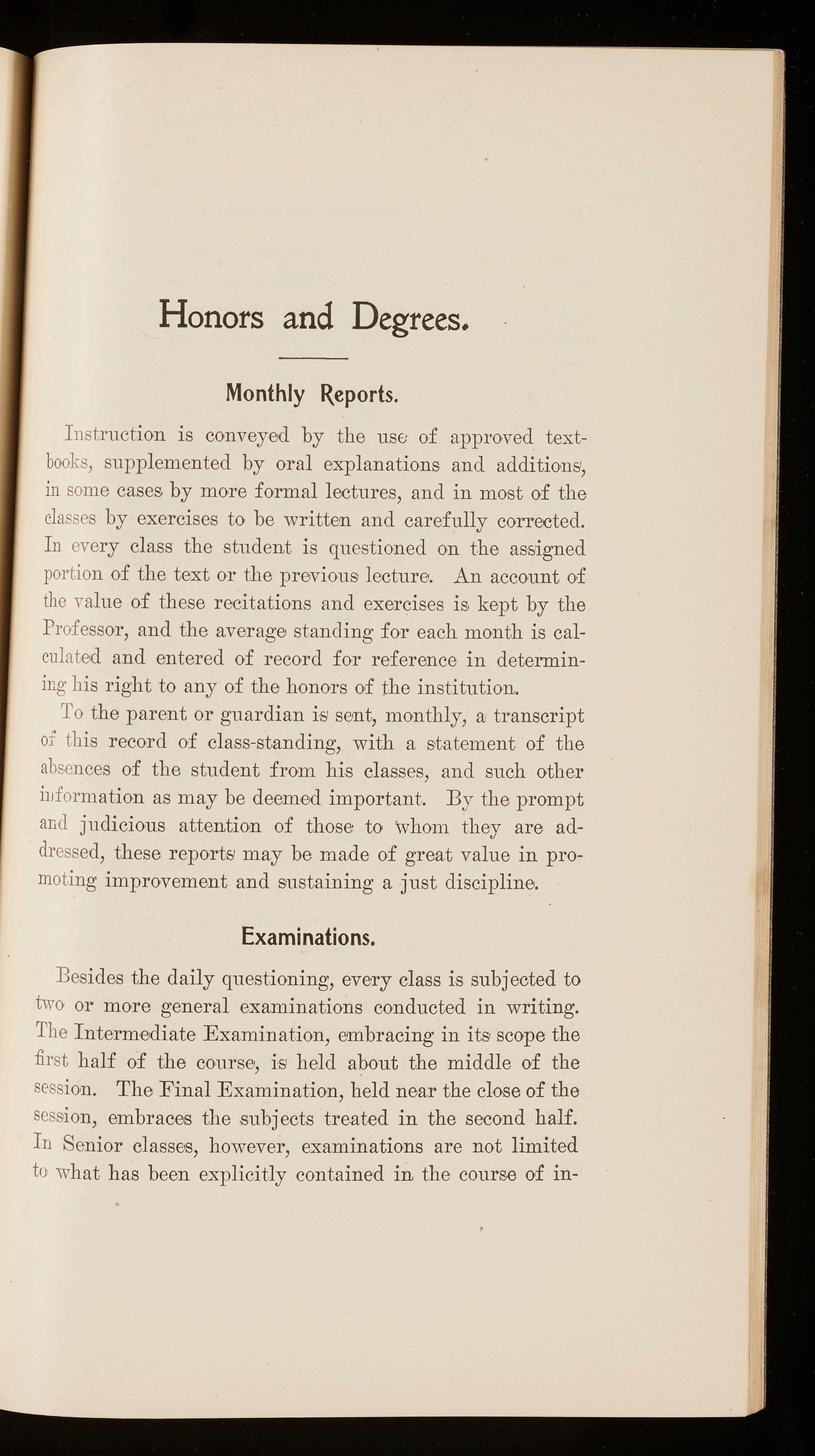
Inst ruction is conveyed by the use of approved textbooks, sup plemented by oral explanations and additiom, 1 in some cases by more formal lectures, and in most of the classesby exercises to be written and carefully corrected. In every class the student is que stioned on the as5igned portion of the text or the prnvious lecture. An account of the value of these recitations and exercises is kept by the Professor, and the average standing for each month is calculated and entered of record for reference in determining his right to any of the honors of the institution.
To the parent or guardian is sent, monthly, a transcript of th is record of class-standing, with a statement of the absences of the student from his classes, and such other i1iformation as may be deem ed important. By the prompt and judicious attention of those to 'whom they are addressed, these repo'l'ts may be made of great value in promoting improvement and sustaining a just discipline.
Besides the daily questioning, every class is subjected to two or more general examinations conducted in writing. The Intermediate Examination, embracing in its scope the first half of the course, is held about the middle of the session. The Fina l Examination, held near the close of the session, embraces the subjects treated in the second half. In Senior classes, however, examinations are not limited to what has been explicitly contained in the course of in-
74-
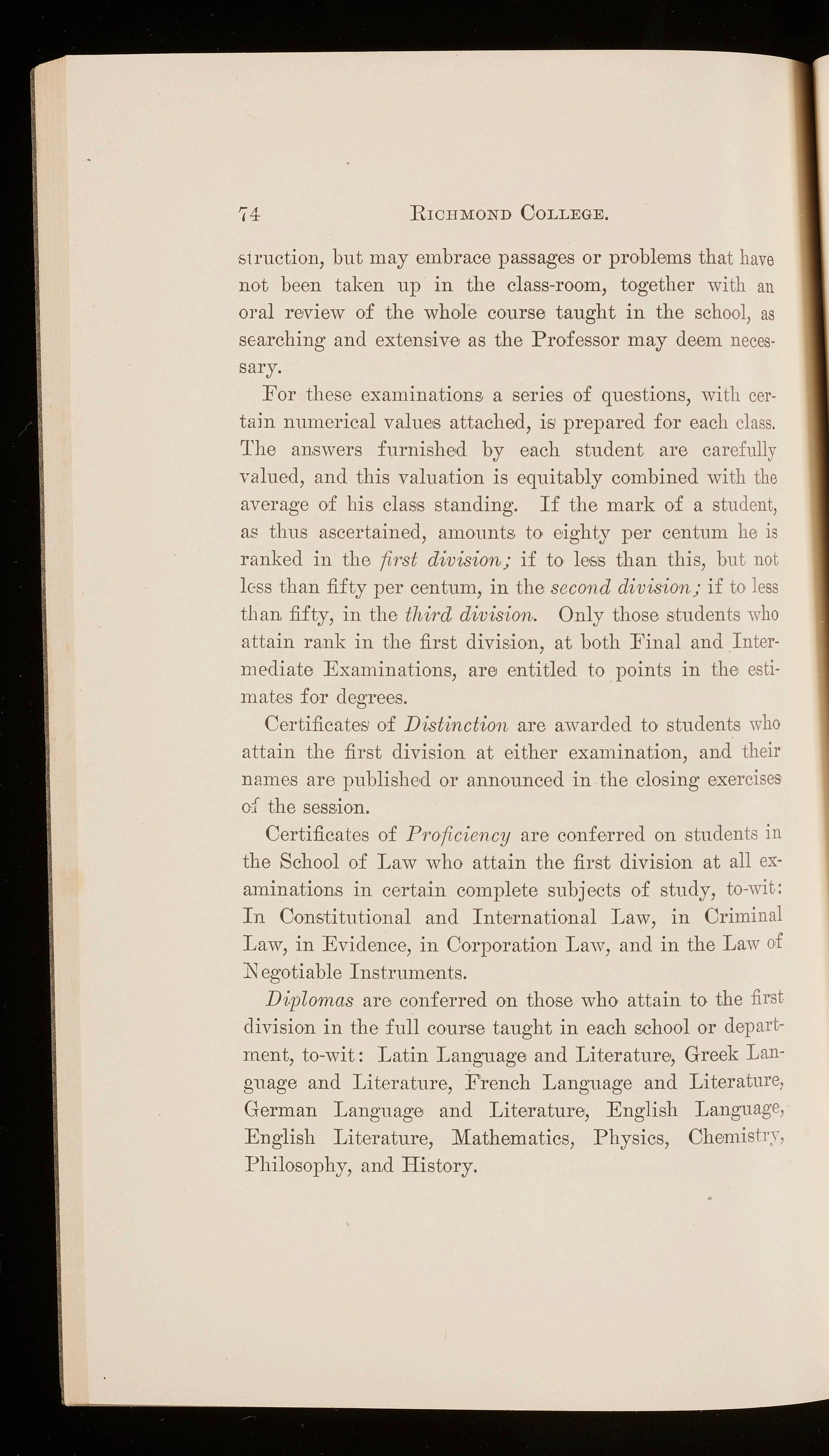
suuction, but may embrace passages or problems tha t have not been taken up in the class-room, together with an oral review of the whole course taught in the school, as searching and extensive as the Professor may deem neces · sary.
For these examinations a series of questions, wi th certain numerical valu es attached, is prepared for each class . The answers furnished by each stud ent are car efully valued, and this valuation is equitably combined wi th the average of his class standing. If the mark of a st udent, as thus ascertained, amounts to eighty per centum he is ranked in th e first division; if to less than this, but not lc:ss than fifty per centum, in the second division; if to less than fifty, in the third division. Only those studen ts who attain rank in the first division, at both Final and Intermediate Examinations, are entitled to points in th e estimat es for degrees.
Certificates of Distinction are awarded to studen ts who attain the first division at either examination, and their nam es are published or announced in the closing exercises o.f the session
Certificates of Profici ency are conferred on stud en ts in the School of Law who attain the first division at all ex· aminations in certain complete subjects of study, t o-wit: In Constitutional and International Law, in Crim inal Law, in Evidence, in Corporation Law, and in the La w of Negotiable Instruments.
Diplomas are conferred on those who attain to the first division in the full course taught in each school or depart· ment, to-wit: Latin Lang11age and Literature, Greek Lan· guage and Literature, French Language and Literatu re, German Language and Literature, English Langua ge, English Literature, Mathematics, Physics, Chemi str:,·, Philosophy, and History.
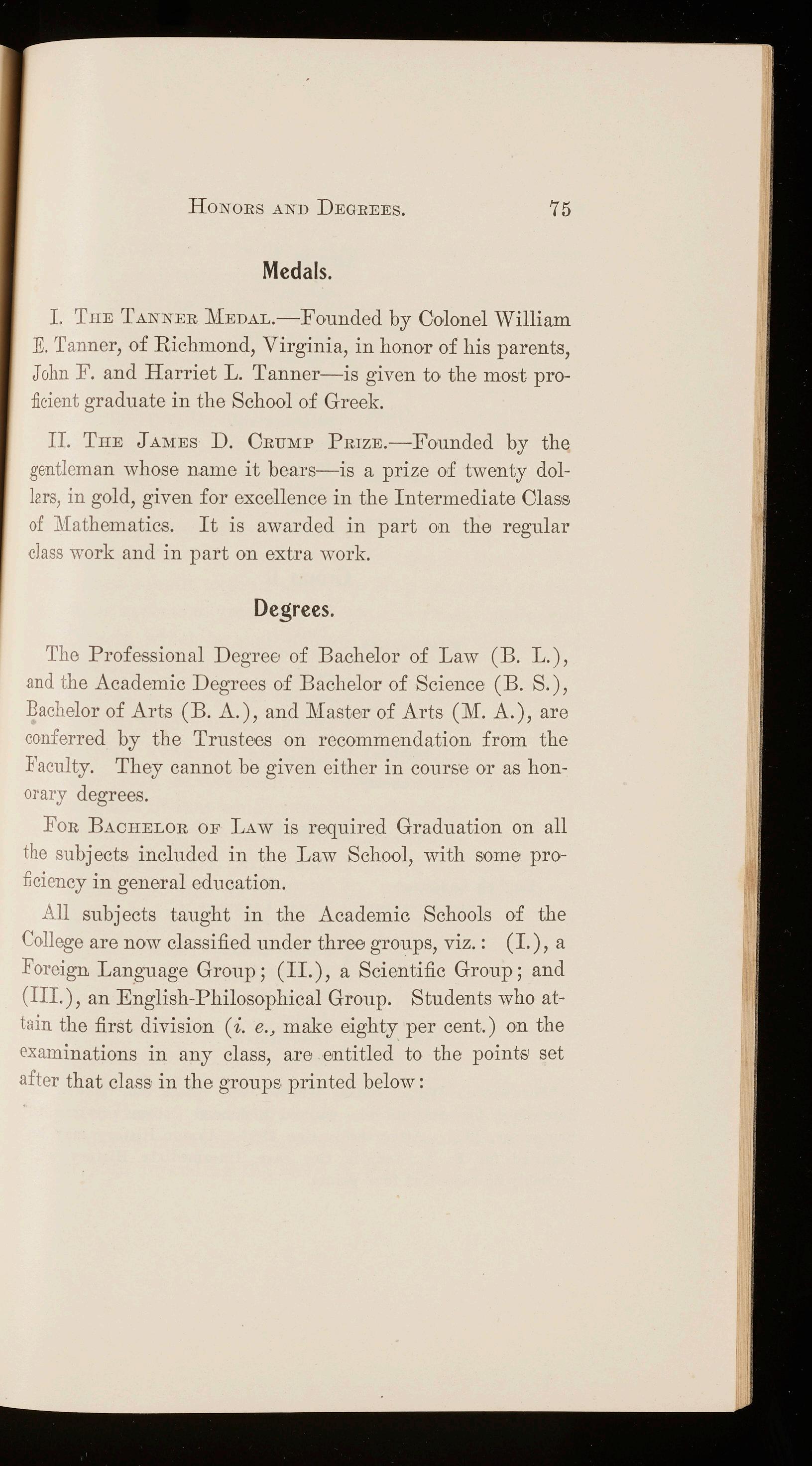
I. Tn E TANNER MEDAL.-Founded by Colonel William E. Tanne r, of Richmond, Virginia, in honor of his parents, J ohn F. and Harriet L. Tanner-is given to the most pro-ficient graduate in the School of Greek.
II. THE JAMES D. CRUMP PRIZE.-Founded by the gentleman whose name it bears-is a prize of twenty dollars, in gold, given for excellence in the Int ermediate Class of Mathe matics. It is awarded in part on the regular classwork and in part on extra work.
The Professional Degree of Bachelor of Law ( B. L.), and the Acad emic Degrees of Bachelor of Science (B. S.), Bachelor of Arts ( B. A.), and M ast,er of Arts ( M. A.), are conferred by the Trustees on recommendation from the Faculty . They cannot be given either in course o,r as honorary degrees.
FoR BACHELOROF LAw is required Graduation on all the subjects included in the Law School, with some pro£ciency in general education.
All subjects taught in the Academic Schools of the College are now classified under three groups, viz. : (I.), a Foreign Language Group; (II.), a Scientific Group; and (III. ), an E~glish-Philosophical Group. Students who attain t he first division ( i. e., make eighty _per cent.) on the examinations in any class, are entitled to the points set after that class in the groups printed below:
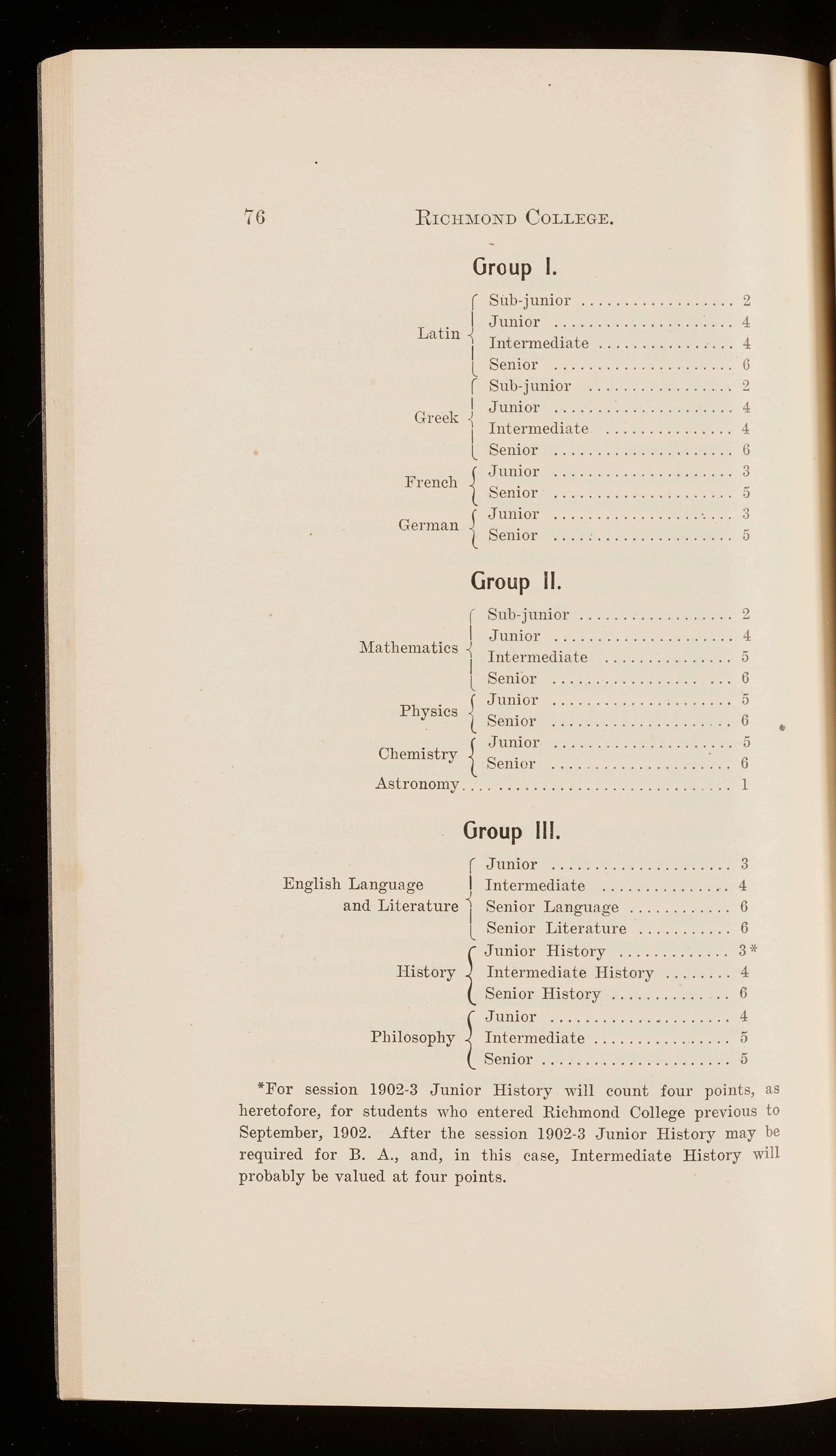
*For session 1902-3 Junior History will count four point s, as heretofore, for students who entered Richmond College previou s to September, 1902. After the sess ion 1902-3 Junior History may be required for B. A., and, in this case, Intermediate History will probably be valued at four points.

Fo R BACHELOROF ScrnNCE is required eight points from Group I., thirty -two points from Group II., and eleven points, including Junior English and Junior Philosophy, from Group III.
F oR BACHELOROF ARTS is required a total of seventy points, of which twenty-four points, including one diploma, must come from Group I. ; fifteen points, including Junior Mathematics and Junior Physics, or Junior Chemistry, from Group II. ; fifteen points, including Junior English and Junior Philosophy, from Group III. The remaining sixteen points may come from any or all of the groups.
The candidate for Bachelor of Science or Bachelor of 1irts must submit to the Faculty by Uay 1st of the year in which he expects to graduate, an oration or essay, composed by him self, which he shall deliver in public at the close of the session, if so directed.
Candidates for any of the degrees, mentioned above are required to submit to the Faculty eight months before Commencement a written application for the degree sought, together with a statement of class-work a.lre,ady accomplished, and of that which remains unfinished.
The applicant for the degTee of MASTEROF ARTS must previously have met all requirements for a B. A. degree. In addition to this he must obtain from the Faculty, at the beginning of the session in which he expects to take the U. A. degree, formal approval of his course of study. This course must embrace four senior classes, no one of which shall have been offered for the B. A. degree. The most advanced class in each of the following departments counts aEi ' a senior: Latin, Greek, French, German, English I. anguage, English Literature, Mathematics, Chemistry, P hysics, History, and Philosophy. The candidate for the ~L A. degree must also submit to the Faculty not lat er than April 15th preceding the close of his course of study, a
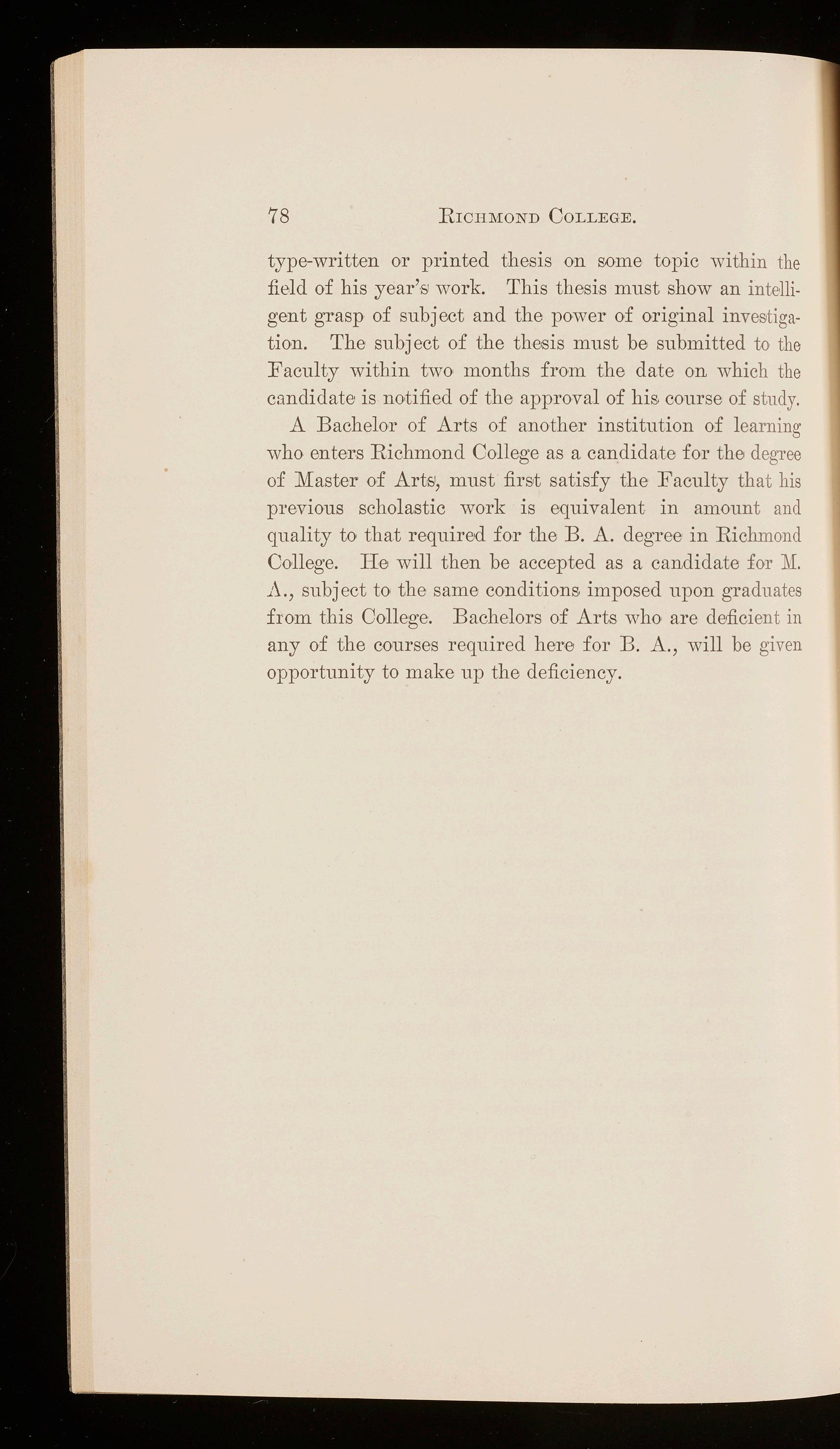
RICHMOND COLLEGE.
type-written or printed thesis on s.ome topic with in the field of his year'f,, ·work. This thesis must show an intelligent grasp of subject and the power of original inv estigation. The subject of the thesis must be submitted to the Faculty within two months from the date on which the candidate is notified of the approval of his course of study. A Bachelor of Arts of another institution of l earning who enters Richmond College as a candidate for the degree of Master of Art-8, must firs,t satisfy the Faculty that his previous scholastic work is equivalent in amoun t and quality to that required for the B. A. degree in Richm ond College. He will then be accepted as a candidate for M .A., subject to the same conditions imposed upon gTaduates from this College. Bachelors of Arts ·who are deficient in any of the courses required here for B. A., will be given opportunity to make up the deficiency.

T he advantages of Richmond College are open to women on t he cond'itions named below:
1. In order to be admitted to matriculation, female stmlents must have attained the age of eighteen years.
2. They must show by examination or o.therwise, to the satisfaction of the Pre sident, that they are prepared to enter with profit at least three of the following classes, viz.: Intermediate Latin, Intermedi a te Greek, Intermediate Mathematics, Senior English, Senior German, Senior French, Junior Philosophy, Junior Chemistry. Junior Phys i cs , and Literature.
3. Those who fulfill these conditions may elect any of the courses offer ed in the academic departments of the College , and will be elig ible to all distinctions and diplomas, and to the degrees of Bachelor of Science, Bachelo1 · of Arts, and Master of Arts on the same conditions that apply to male students.
4 F ema l e students will be required to pay the usual College fees.
5. The College authorities have not yet been able to provide dormitory facilities for women. Those who do not reside with parents or rela tives must board at some place approved by the President. Arra ngements will be made for students who request it.
6. A comfortable study hall is provided, for use of which a small fee is charged.
The foregoing regulation,g were adopted 111 June, 1898. D uring 1898-'99, four young women matriculated. In 18 99-1900, there were seven female students. In 1900-'1, an d again in 1901-'2, six young women matriculated. One · young woman has received the degree of B. S. and another t h e degree of B. A. During the summer of 1902 improved arrangements wi ll be made for the reception of women. P roperly prepared students will be cordially wel come. For further information addreE'.6th e President of t h e College.
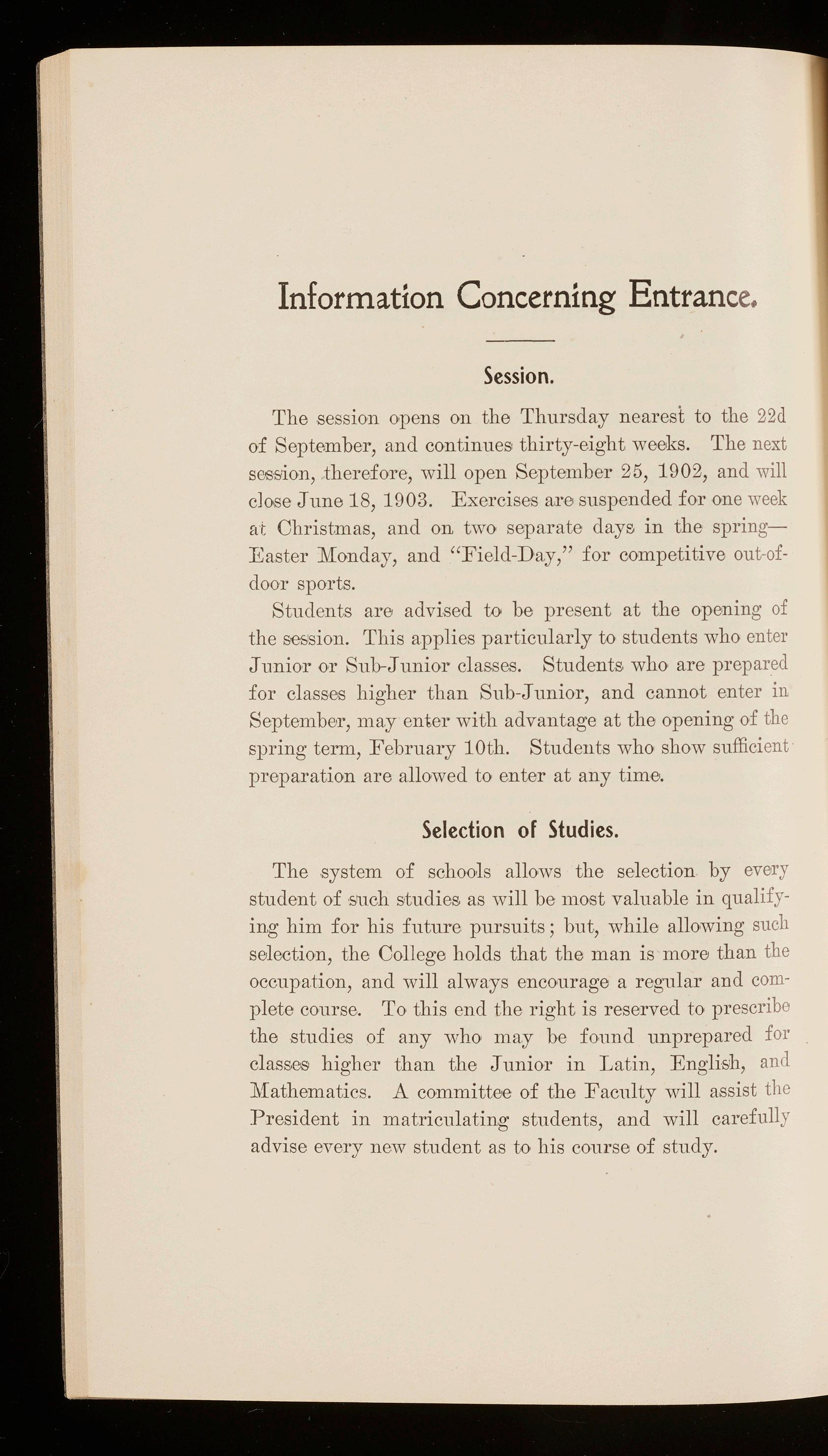
The session opens on the Thursday nearest to the 22d of September, and continues thirty-eight weeks. The n ext session, therefore, will open September 25, 1902, and will close June 18, 1903. Exercises a,re suspended for one week at Christmas, and on two separate clays in the sprin gEaster Monday, and "Field-Day," for competitive out-ofcloor sports.
Students are advised to be present at the openin g of the session. This applies particularly to students who enter Junior or Sub-Junior classes. Students who are prep ared for classes higher than Snb-J unior, and cannot enter in September, may enter with advantage at the opening of th e spring term, February 10th. Students who show sufficient preparation are allowed to enter at any time.
The system of schools allows the sel ection by every student of s1nch studies as will be most va l uable in quali fying him for his fotm·e pursuits; but, while allowing such selection, the College holds that the man is more, than the occupation, and will always encourage a regular and complete course. To this end the right is reserved to prescr ibe the studies of any who may be found unprepared for classes higher than the J uni.or in Latin, English, and Mathematics. A committee of the Faculty will assist the President in matricu l ating students, and will carefull y advise every new student as to his course of study.
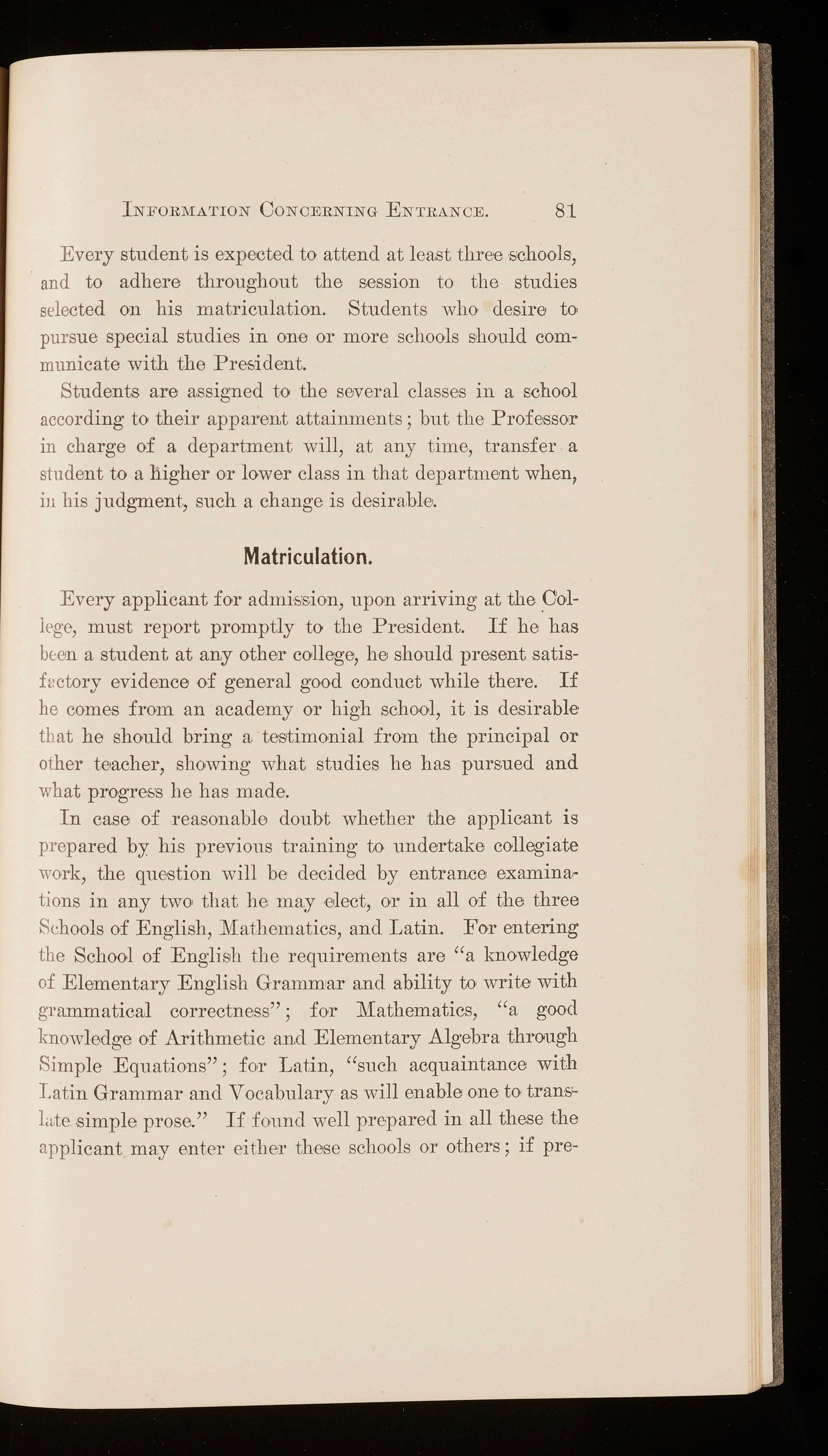
Every student is expected to attend at least three schools, and to adhere throughout the session to the studies selected on his matriculation. Student s who desire to pursue special studies in one or more schools should communi cate with the Pr esident.
St udents are assigned to the soveral classes in a school according to their apparent attainments; but th e Professor in charge of a department will, at any time, trans£ er a student to a higher or lower cl ass in that departm ent when, in his judgment, such a change is desirabl e.
Every applicant for admi~;sion, upon arriving at the Collt'ge, must report promptly to the President. If he has been a student at any other college, he should present satisfoctory evidence of general good conduct while there. If he comes from an academy or high school, it is desirable that he should bring a testimonial from the principal or other teacher, showing what studies he has pur sued and what progress he ha s made
In case of rea sonabl e doubt wheth er the applicant is prepared by hi s previons training to undertake collegiate work, the question will be decided by entrance examinations in any two that h e may -elect, or in all of the three Sehools of English, :Mathematics, and Latin. For entering the School of Engli sh the requirements are "a knowledge of Elementary Engli sh Grammar and ability to wTite with gr ammatical correctness"; for Mathematics, "a good lmowlodge of Arithm et ic and E l ementary Algebra through Simp le Equations"; for Latin, "such acquaintance with Ia tin Grammar and Vo cabulary as will enable one to trarn:,'bte simple prose." If found well pr epared in all these the applicant may enter either these schools or others; if pre-
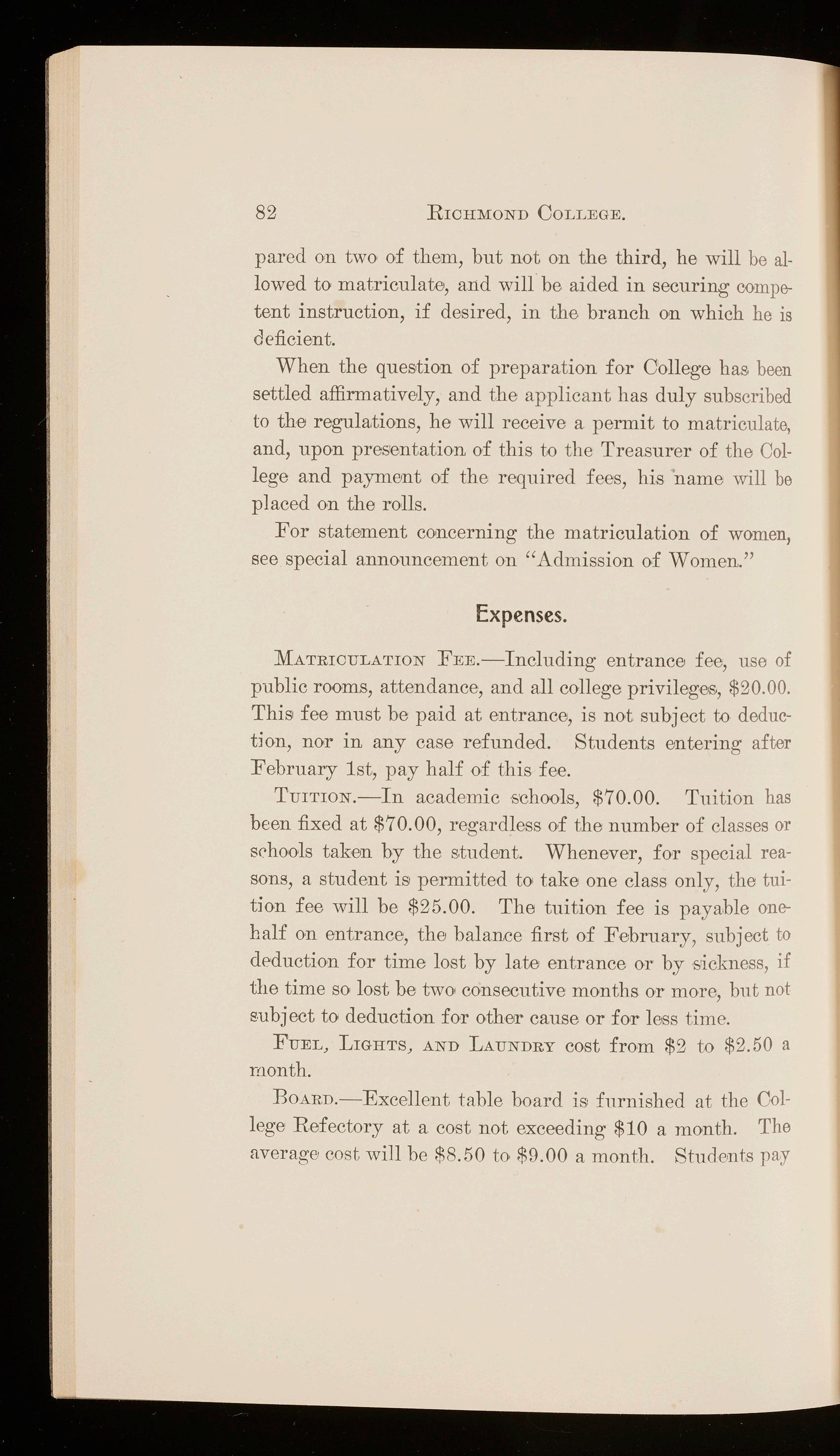
pared on two of them, but not on the third, he will be allowed to matriculate, and will be aided in securing competent instruction, if desired, in the branch on which he is deficient.
When the question of preparation for College has. been settled affirmatively, and the applicant has duly subscribed to the regulation s, he will receive a permit to matriculate, and, upon presentation of this to the Treasurer of the College and payment of the required fees, his name will be placed on the rolls.
For statement concerning the matriculation of women, see special announcement on "Admission of Women."
MATRICULATIONF:im.-Including entrance fee, us e of public rooms, attendance, and all college privileges, $20.00. This, fee must be paid at entrance, is not subject to deduction, nor in any case refunded. Students entering after February 1st, pay half of this fee.
TurTION.-In academic '.Schools, $70.00. Tuition has been fixed at $70.00, regardless of the number of classes or srhools taken by the student. Whenever, for special reasons, a student is, permitted to take one class only, the tuition fee will be $25.00. The tuition fee is payable onehalf on entrance, the balance first of February, subject to dPduction for time lost by late entrance or by ·sickness, if the time so lost be two consecutive months or more, bnt not subject to deduction for other cause or for less time.
FuEL, LIGHTS, ANDLAUNDRYcost from $2 to $2.50 a month.
BoARD.-Excellent table board is, furnished at the College Refectory at a cost not exceeding $10 a month. The average cost will be $8.50 to $9.00 a month. Students p ay
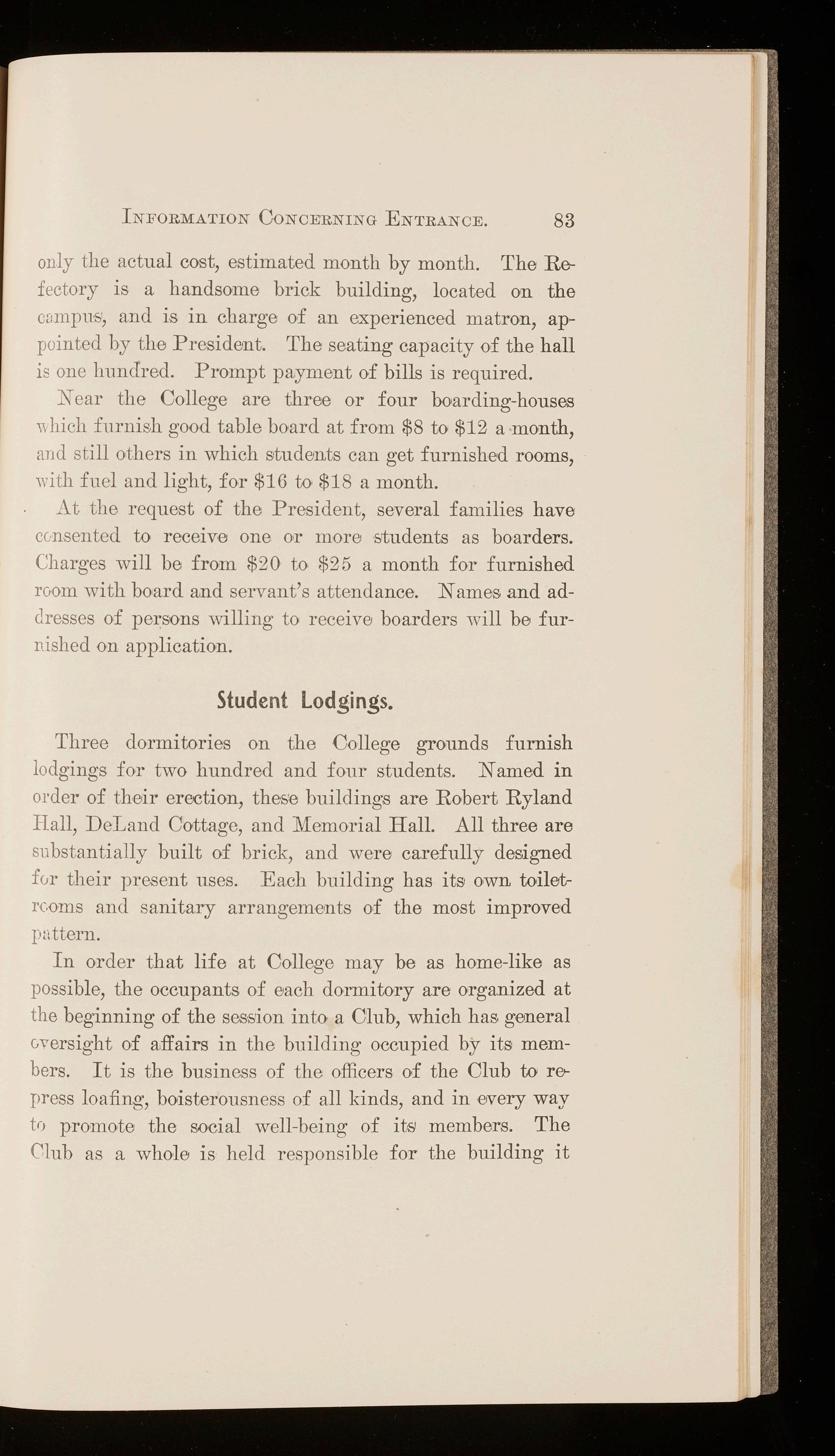
only the actual cost, estimated month by month. The Refectory is a handsome brick building, located on the cumpu s, and is in charge of an experienced matron, appointed by the President. The seating capacity of the hall is one hundred. Prompt payment of bills is required.
Nea r the College are three or four boarding-houses ,,hic h furni sh good table board at from $8 to $12 a month, and st ill others in which students can get furnished rooms, with fuel and light, for $16 to $18 a month.
At t he request of the President, several families have cc.-nsented to receive one or more 5tudents as boarders. Charges will be from $20 to $25 a month for furnished room with board and servant's attendance. Names and address es of persons willing to receive boarders will be furnished on application.
Three dormitories on the College grounds furnish lodgings for two hundred and four students. Named in order of their erection, these buildings are Robert Ryland H all, DeLand Cottage, and Memorial Hall. All three are substantially built of brick, and were carefully designed for their present uses. Each building has its own toiletrc.oms and sanitary arrangements of the most improved puttern.
In order that life at College may be as home-like as possible, the occupants of each dormitory are organized at th e beginning of the ses5fon into a Club, which has general cversight of affairs in the building occupied by its members. It is the business of the officers of the Club to repress loafing, boisterousness of all kinds, and in every way t rJ promote the social well-being of its members. The C'lub as a whole is held responsible for the building it

RrcnMOND CoLLEGE.
occupies, and damages not individually accounted for are charged against members pro rata. Meetings ar e held whenever necessary. Students who prove th emselves objectionable to their fellow-residents in any dormitory will be removed from the building upon recomm endation o.i the officers of the Club. There are no club fees.
Each dormitory i& in charge of an experienced ja nitor, ·who puts all lodging-rooms in order once a day. H e also brings water and kindles fires. This service is pai d for out of matriculation fees of students Every effort is put forth by the College authorities to insure good order, cleanlin€Ss, and neatness in the dormitorie&.
Early application for rooms is advisable.
This building is four stories abo·ve a basement, and confains lodgings on first, second, third, and fourth floors for eighty-six students. A modern steel fire-escape connects all hallways with the ground. The rooms are 14x18 feet, ten to twelve feet in pitch, and are lighted by larg e windows. They are intended for two students. The ren t of a room for the session of nine months, or for an y part thereof, is ten dollars. In case there are two occupan ts, as is usual, each one pays five dollar&
Most of the rooms have open grates, others hav e coalburning stoves. Students purchase their own fu el and lights. Oo,al bins are provided by the College for each room. Rooms are unfurnished, except that the College provides stove or grate, fonder, and skeleton wardr obe. Furniture may be purchnsed new, or second-hand, and usually costs each occupant five to tim dollars.
Students lodging in this ha11 have free access to shower baths in the building.
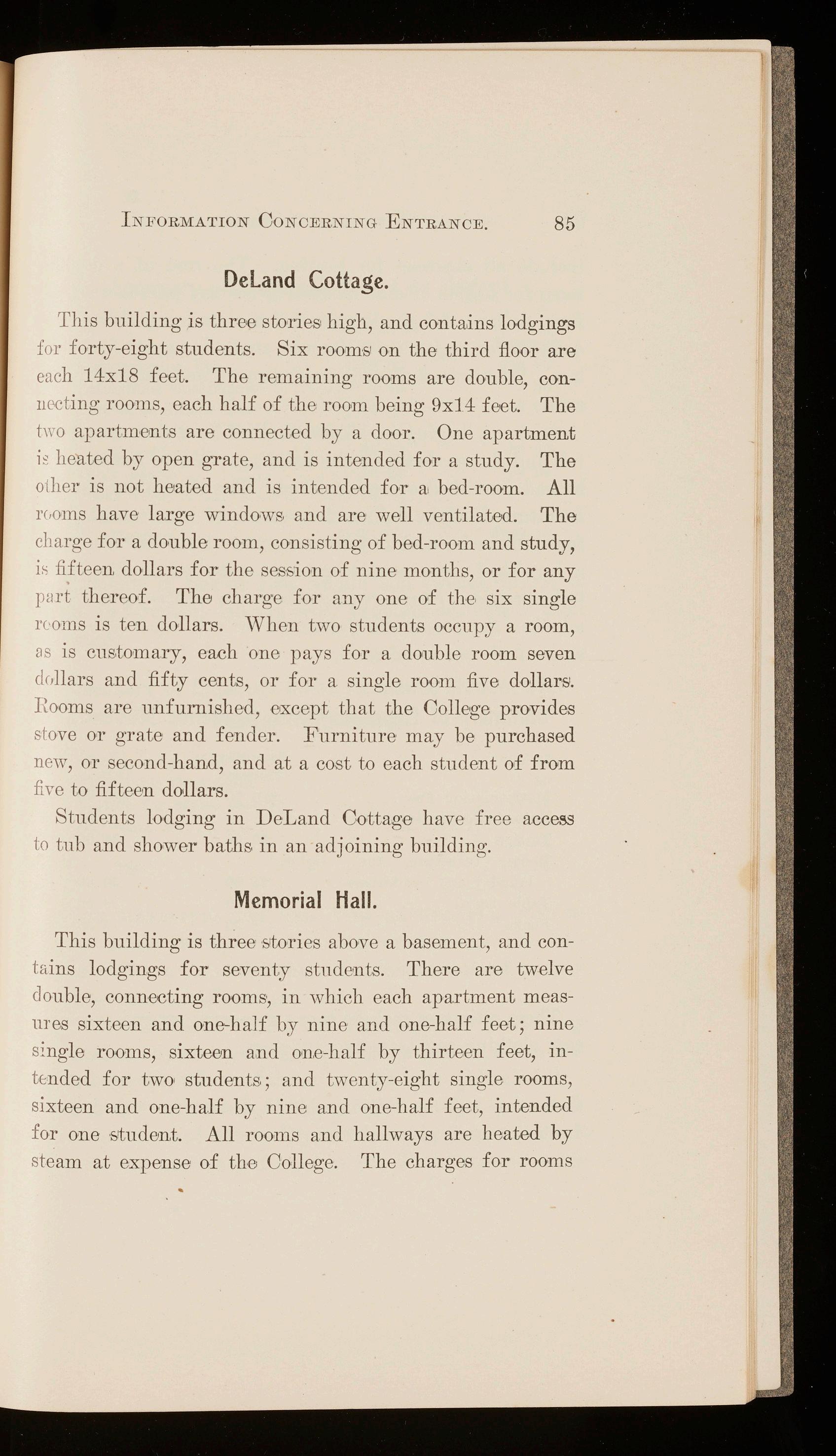
This building is three stories, high, and contains lodgings for forty-eight students. Six room& ' on the third floor are each 14x18 feet. The remaining rooms are double, con1wcting rooms, each half of the room being 9xl4 feet. The h1 o apartments are connected by a door. One apartment i ~ heate d by open grate, and is intended for a study. The other i s not heated and is intended for a, bed-room. All rr,orns have large windows and are well ventilated. The charge for a double room, consisting of bed-room and study, is fiftee n dollars for the session of nine months, or for any part thereof. The charge for any one of the six single rc·oms is ten dollars. ·when two students occ11pya room, as is cu stomary , each one pays for a double room seven clr,llars and fifty cents, or for a single room five dollar&'. Rooms are unfurnished , except that the College provides stove or grate and fender. Furniture may be purchased new, or second-hand, and at a cost to each student of from five to fifteen dollars.
St udents lodging in DeLand Cottage hav e free acce&l to tub and shower baths in an adjoining building.
This building is three sto rie s above a basement, and conta ins lodgings for seventy stndents. There are twelve double, connecting rooms, in which each apartment measmes sixteen and one-half by nine and one-half feet; nine single rooms, sixteen and one-half by thirteen feet, int mded for two students; and twenty-eight single rooms, sixteen and one-half by nine and one-half feet, intended for one ·&tudent. All rooms and hallways are heated by steam at expense of the College. The charges for rooms
include all expenses for heating. The rent of a double room for session of nine months, or for any part thereof, is forty dollars; for single- room for two students., thirty-two dollars; for single room for one student, twenty-five dollars. When two &rtudentsoccupy a room, each pays half the rent.
Students lodging in Memorial Hall have free access to tub and shower baths in the building. A few rooms may be had furnished or unfurnished. The charge for use of furniture is eight dollars for session of nine months, or four dollars for each of two occupants. Students who rent a furnished room need to provide only bed clothing and toilet articles. Students who take rooms in Memorial II all, whether the rooms are furnished or not, 1nust pay full amount of rent in advance.
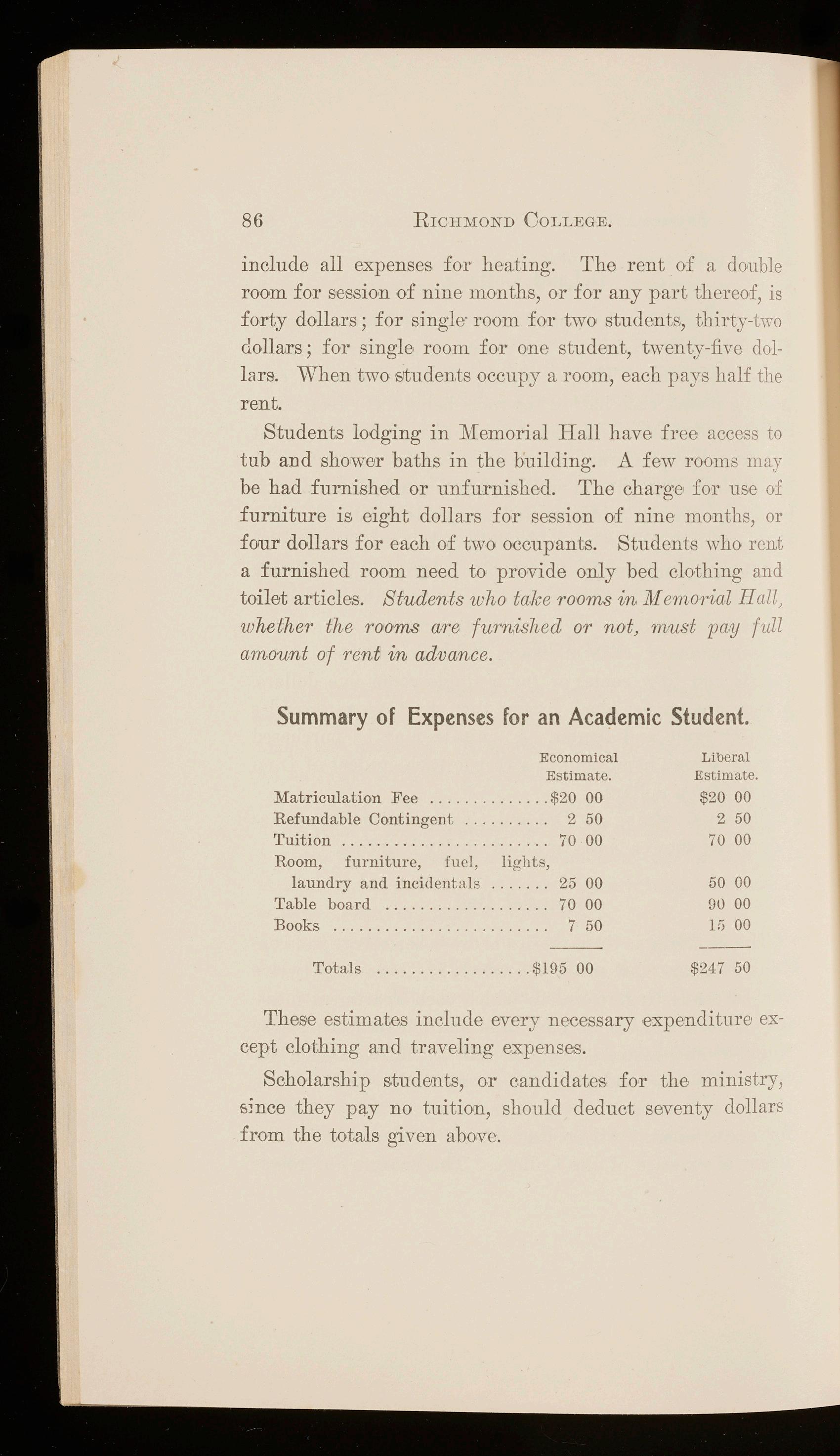
These estimates include every necessary expenditure except clothing and traveling expenses.
Scholarship students, or candidates for the ministry, flince they pay no tuition, should deduct seventy dollars from the totals given above.
Summaryof Expenses for a Law Student.
Economical Estimate.
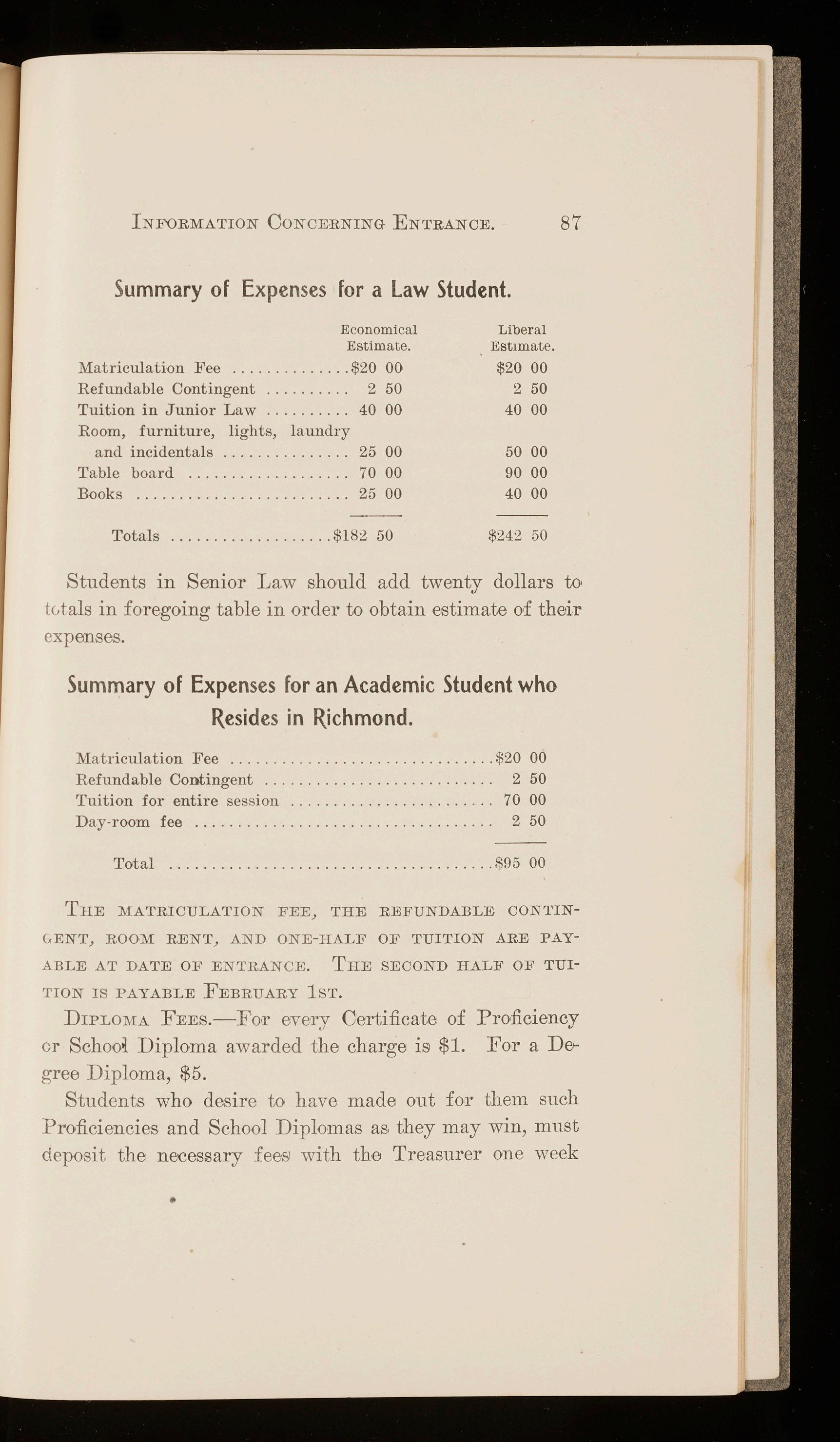
Matriculation Fee
Refundable Contingent .
$20 00
. 2 50
Tuition in Junior Law 40 00
Room, furniture, lights, laundry and incidentals .
Table board .
. . 25 00
70 00
Books .................... 25 00
50
Students in Senior Law should add twenty dollars to tc,tals in foregoing table in order to obtain estimate of their expenses.
Summary of Expenses for an Academic Studentwho R.esides in R.ichmond .
Matriculation Fee . . . . . $20 00
Refundable Contingent . . 2 50 Tuition for
TnE MATRICULATIONFEE, TUE REFUNDABLECONTINC.ENT, ROOM RENT, AND ONE-HALF OF TUITION ARE PAYABLE AT DATE Ole ENTRANCE. T1rn SECONDIIALF OF TUITION IS PAYABLEFEBRUARY1ST
DIPLOMA FEEs.-For every Certificate of er Schooi Diploma awarded the charge is $1. gree Diploma, $5.
For a De--
Students who desire to have made out for them such Proficiencies and School Diplomas as they may win, must deposit the necessary fees with the Treasurer one week
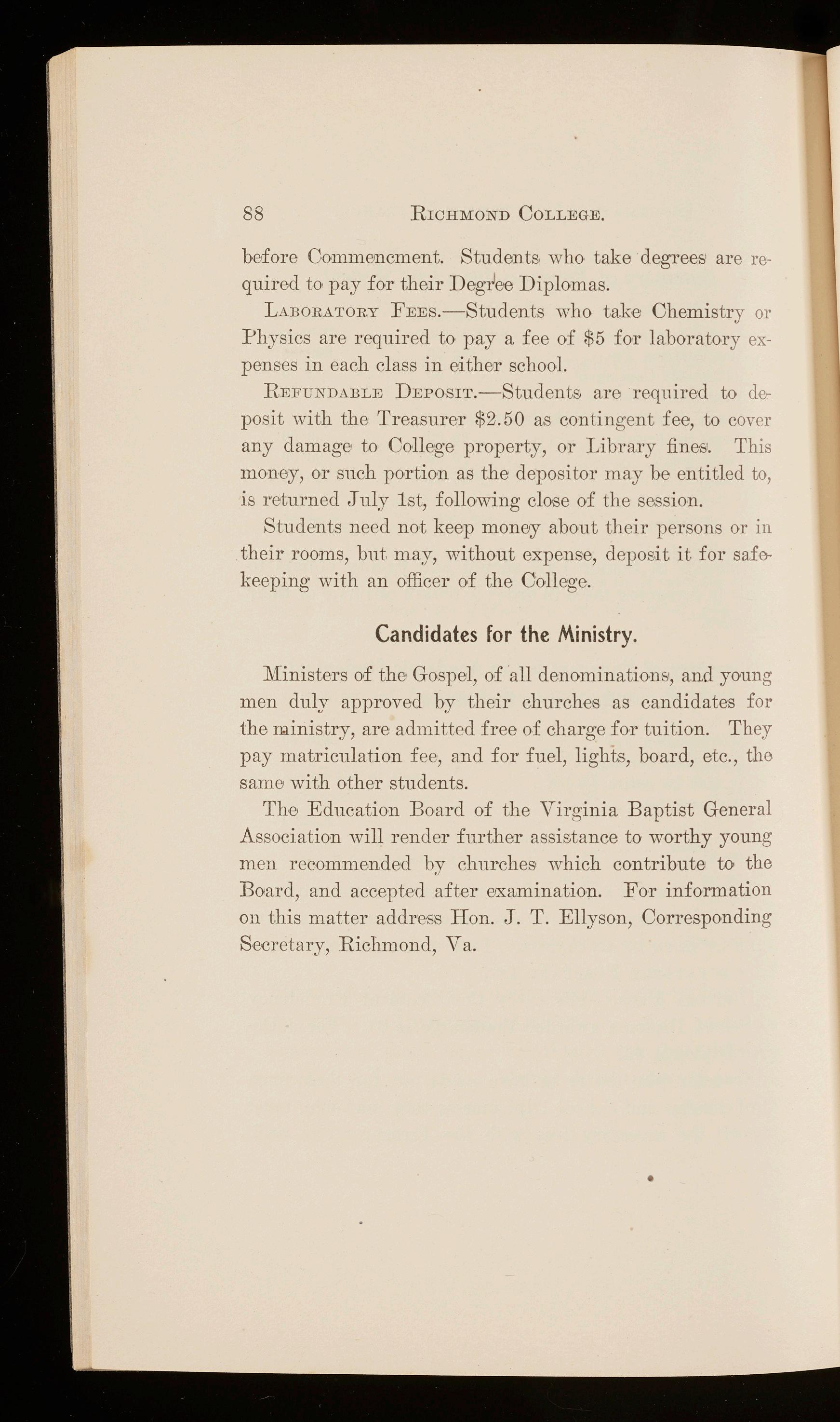
RICHMONDCOLLEGE.
before Commencment. Students who take degree& ar e required to pay for their Degtee Diplomas.
LABORATORYFEEs.-Students who take Chemistr y or Physics are required to pay a fee of $5 for laborator y expenses in each class in either school.
REFUNDABLEDEPOSIT.-Students are required to de:posit with the Treasurer $2.50 as contin g ent fee, to cover any damage to College property, or Library fines1• T his money, o-r such portion as the depositor may be entitled to, is r eturned July 1st, following close of the session.
Students need not keep money about their persons or in their rooms, but may, without expense, deposit it for safo• keeping with an officer of the College.
Ministers of the Gospel, of all denominations ,, and youn g men duly appro;ved by their churches as candidates for the ministry, are admitted free of charge for tuition. Th ey pay matriculation fee, and for fuel, lights, board, etc., th e same with other students.
The Education Board of the Virginia Baptist General Association will render further assistance to worthy youn g men recommended by churches , ·which contribute to, the Board, and accepted after examination. For information on this matter address Hon. J. T. Ellyson, Correspondin g Secretary, Richmond, Va.

The Trustees hold invested funds, tho income from which is devoted to the assistance of young men who have r,rovo<l themse lv es worthy, or who may be properly recommended, bnt who are not financially able to pay all College <·ltarges.
The Trustees are anxious to increase these very helpful f unds, an<l gifts are earnefitly invited.
The fonds are divided into Scholarships and Donations; tlic Scholarships pay tuition; the Donatiom, pay board. They are clcsignatod as follows:
The two Memorial Scholarships, $1,000 each, founded li,;· ihe Baptists of Virginia.
Tho Scholarship of the F'irst Ba1!list Church, Richmond, $1,000.
The JosezJh E. Brown Scho.larshiJJ, $1,000, founded by Acnator Brown, of Georgia.
Tho Brunet Scholarshi7J. $1,000, g-iven by l\Jrs. Sarah A. Bnmet, N mfo.lk, Va.
The Davidson Scholanhip. $1,000, fonnded b,v :Mrs. M. K Davidson, Rockbridge connty, Va.
The two West Scholarsh1'ps. $2,500, by George B. Wost, K ewport News, Ya.
The F'ann.ie Lea Jfalf 8cholarshi71, $500, by J\fr. and :Mrs. Lea, of North Carolina.
The JI. M. Poindexter Ilalf Schol'arshiz1, $500, fonnde d by t h e Dan River Baptist ARsociation.
90

RICHMOND COLLEGE.
The Elizabeth Stetson Aid Fund, $5,000, given by John B. Stetson, in honor of bis wife.
The Ella Williams Students' Aid Fund, $5,500, given by the late Thomas 0. Williams, of Richmond, in memory of hi s daughter.
The ffilliam, IIawkins Pund, $2,000, founded by the gentleman whose name it bears, to aid in educating godly, st11clio11s,deserving young men.
The Chambers Sisson Scholarship, $1,000, founded by the ge11tleman whose name it bears.
The J. B. Jeter Scholarship, $1,200, beque,:,t of Mrs. Mar y C. Jeter, in memory of her husband, Rev. J. B. Jeter, D. D., one of the founders of the College, and long pr esident of the corporation.
Tho Blizabei h R. West Fund, $2,000, established by :Mr. George B. 'iVes,t, of Newport News, Va.
The II. E1:elina lValker Scholarship, $1,200.
The Gustavvs Millhis er Scholarship, $1,000, used for th e benefit of the Richmond High School.
The Sarah B. 1Yatson Scholarship, of $1,000, founded 13 ~fr. George B. West, of N e,rpo rt News, Va.
The A E. Diclcinson Scholanhip, $1,000, founded by the minister whose name it bears.
The N. lr. Boice Scholarship, est abli sh ed by the gentleman whose name it bear s..
Hon. J. L . }.L Curry has transforred to the College his copyright interest in two books, "William Ewart Gladstone" and "Southern States of the American Union," the same to be held and the income used for Scholarship purpcses.
The donations, 11Sedmainly to help yonng me'll studying for the Gospel ministry of the Baptist den omination, to, be
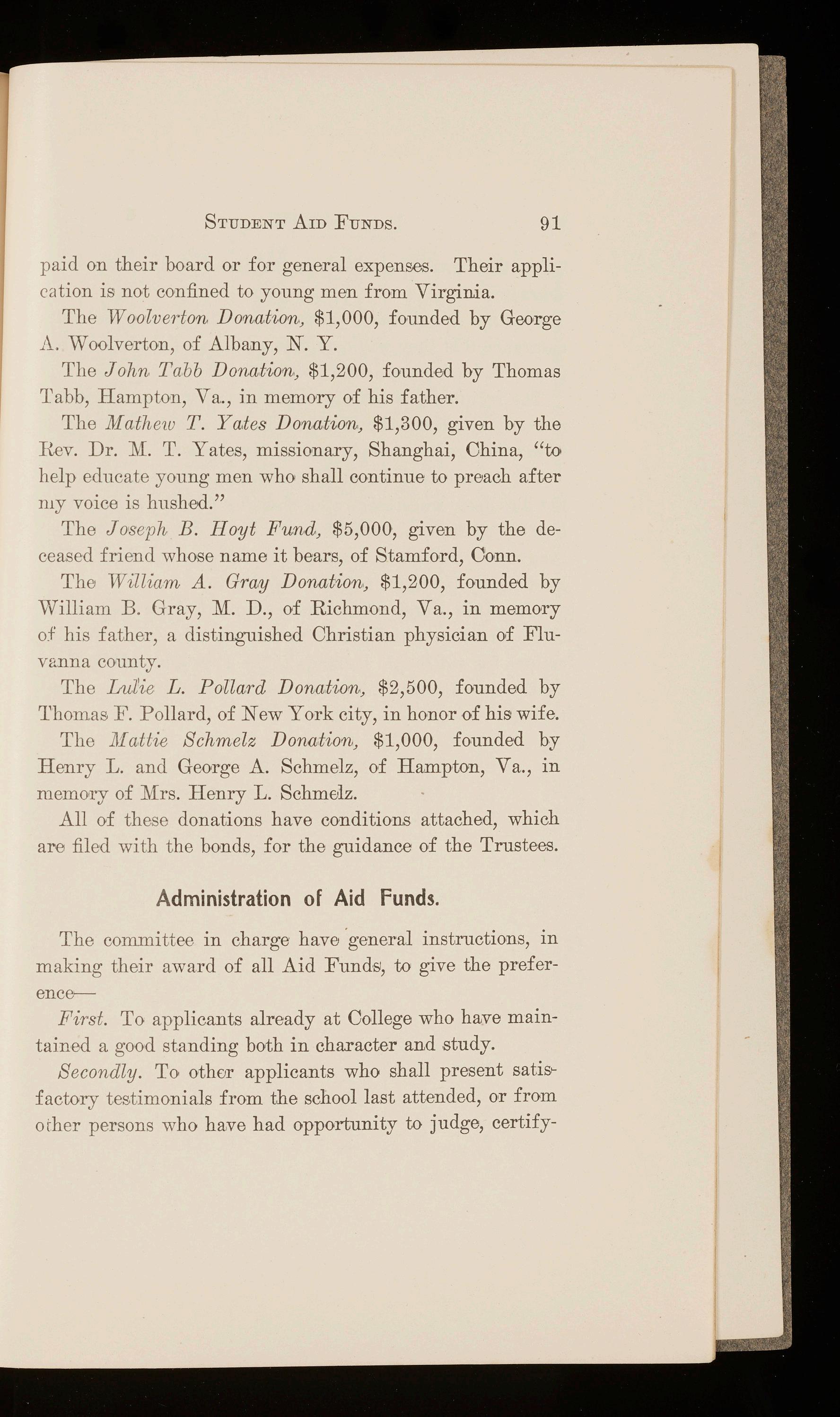
paid on their board or for general expenses. Their application is not confined to young men from Virginia.
The Woolverton Dornation, $1,000, founded by George A. Woolverton, of Albany, N. Y.
The John Tabb Donation, $1,200, founded by Thomas Tabb, Hampton, Va., in memo ry of his father.
The Mathew T. Y a,les Donation, $1,300, given by the Rev. Dr. M. T Yates, missionary, Shanghai, China, "to help educate young men who shall continue to preach after my voice is hushed."
The Jos eph B. Hoyt Fund, $5,000, given by the deceased friend whose name it bears, of Stamford, Conn.
The William A. Gray Donation ,, $1,200, founded by William B. Gray, M. D., of Richmond, Va., in memory of his fat.her, a distinguished Christian physician of Fluvanna county.
The Lul'i e L. Pollard Donation, $2,500, founded by Thomas F. Pollard, of New York city, in honor of his wife.
Tho Mattie Schmelz Donation, $1,000, founded by Henry L. and George A. Schmelz, of Hampton, Va., in memory of Mrs Henry L. Schmelz.
All of these donations have conditions attached, which are filed with the bonds, for the guidance of the Trustees.
The committee in charge have ·general instructions, m making their award of all Aid Funds, to give the preferenc6"--
First. To applicants already at College who have maintained a good standing both in character and study.
Secondly. To oth0r applicants who shall present satis" factory testimonials from the school last attended, or from other persons who have had opportunity to judge, certify-
92

RICHMOND COLLEGE.
ing to their health, attainments, habits of study, and moral character.
Thirdly. To those of either class who give reasonable assurance that they will r:omplete a course of study leading to one of the degrees of the College.
The recipients of aid are expected to prove, as students, not only above censure in all respects, but actively helpful to the College by example and by earnest work.
The awards will be at all times subject to revision by the TrusteeB', who reserve the right to withdraw the privilege at any time on account of neglect. of duty, serious misconduct, or failure to maintain an average standing of at le,ast eighty per cent. in three schools.
These Aid Funds are awarded annually by a committee of the Trustees, which meets the first week in July. Applications for aid should be made to the President of th e College, who will send blank forms to be filled up and re-turned.
8:30 8:45 9:40 10:35 11 :3 0 12:20 1:10 2:00
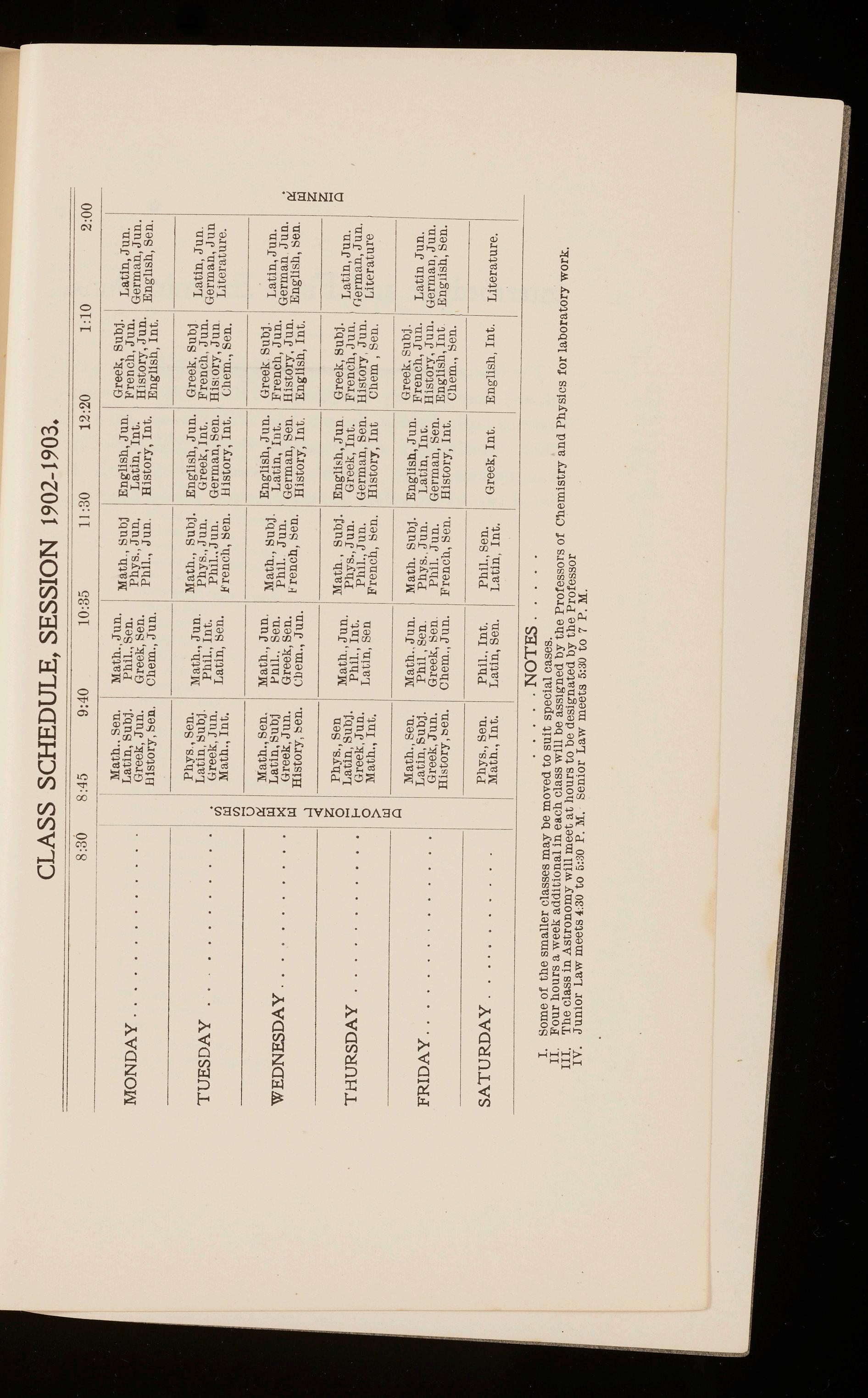
Math Sen. Math.,Jun. Math , Subj English, Jun . Greek, Subj, I Latin Jun
MONDAY . . Latin, Subj. Phil.,Sen. l<'rench, Jun. German Jun Greek, Jun. Greek, sen. Phys.,Jun, Latin, Int. H 1st ory, Jun. English' Sen· I I History, ben. Chem., Jun. Ph!!., Jun . History, Int. Engl!sh, Int . I • ·
Phys , Sen. Math., Subj. English, Jun. Greek, Subj Latin Jun
Latin , Subj. Math., Jun. Phys.,Jun. Greek, Int. French, Jun. German, Jun ui Greek, Jun. Phil., Int . Phil..Jun. German, Sen. Hls , ory, Jun Lit erat ure . Ill Math., Int. Latin, s en . French, Sen. History, Int. Chem., Sen. r/J ti
Math.,Sen . Math., Jun . Math., Subj . English, Jun. Gr ee k Subj. Latin,Jun.
TUESDAY
WEDNESDAY .. Ill Latin,Subj Pnll. . Sen. Latin, Int. French, Jun. :>< Greek.Jun. Greek, S e n. Phil. Jun. German, Sen. History, Jun. German Jun. Ill History , oen. Cbem., Jun. ·~ rench, sen. History, Int . English, Int. Engli s h, sen. Ill ....! z < z z
Phys., Sen Math, Subj. Engli s h, Jun . Greek, Subj. i:i g Math.,Jun. Latin,Jun.
THURSDAY I-< Latin, Subj. Phil., Int. Phys.,Jun. Greek, Int. Fr e nch, Jun. nerman, Jun. 0 Greek.Jun. Latin, Sen Phil. , Jun. German, Sen. Hi st ory , Jun. Lit e rature > Math., Int. Fr ench, sen. History, Int Chem, Sen. Ill Q Gree!,, Subj. Math., Sen. Math . Jun . Math . Subj. English, Jun. French, Jun. Latin Jun .
FRIDAY .. Latin, Subj. Phil' Sen. Phys. , Jun. Latin, Im. H ! st ory, Jun. German, Jun . Greek, Jun. Greek, sen. Phil. Jun. German, Sen. English, Int English, Sen. Hi s tory, t>en. Chem.,Jun. French, Sen. History, Int. Chem., Sen.
SATURDAY. Phys., Sen. Phil .. Int . Phil., Sen. Greek, Int English, Int. Liter at ure . . . . Math , Int. Latin, Sen. Latin , Int . . . . . . NOTES . .... I. Some or the smaller classes may be moved to suit special cases . II . Four hours a week additional in each class will be assigned by the Profes so rs of Chemistry and Physics for laboratory work. III. The class in Astronomy will meet at hours to be designated by the Professor IV. Junior Law meets 4:30 to 5:30 P . M. Senior Law meets 5:30 to 7 P. M.

The intermediate examinations begin Monday, February 2d, and close Monday, February 9, 1903 The final examinations begin Friday, June 5, and close Friday, June 12, 1903. Recitations are s u spended during the period of examinations . The sched u le of examinations will be posted two weeks before the examination period begins.

Admission of Women
Admission, Terms of Aid Funds
Alumni, Society of ......................................
Athletic Association Bequest, Form of Boarding Arrangements Calendar ...............................................
Charter, Chemistry, School of Commencement . Committees, Trustees .......... Courses of Instruction Degrees .......
Diplomas and Certificates ...........................
Discipline Donations ............ , Endowment
English, School of . Examinations
Expenses
Faculty, List of French Geology
German ...................
Greek , Schoo l of Grounds and Buildings History
Instructors
Latin, School of .. Law Association
Law, School of
Law Prizes
Lecturers
Lectures, Thomas
Lectures , University Bxtens ion
Library
Literary Societies
Mathematics, School of
